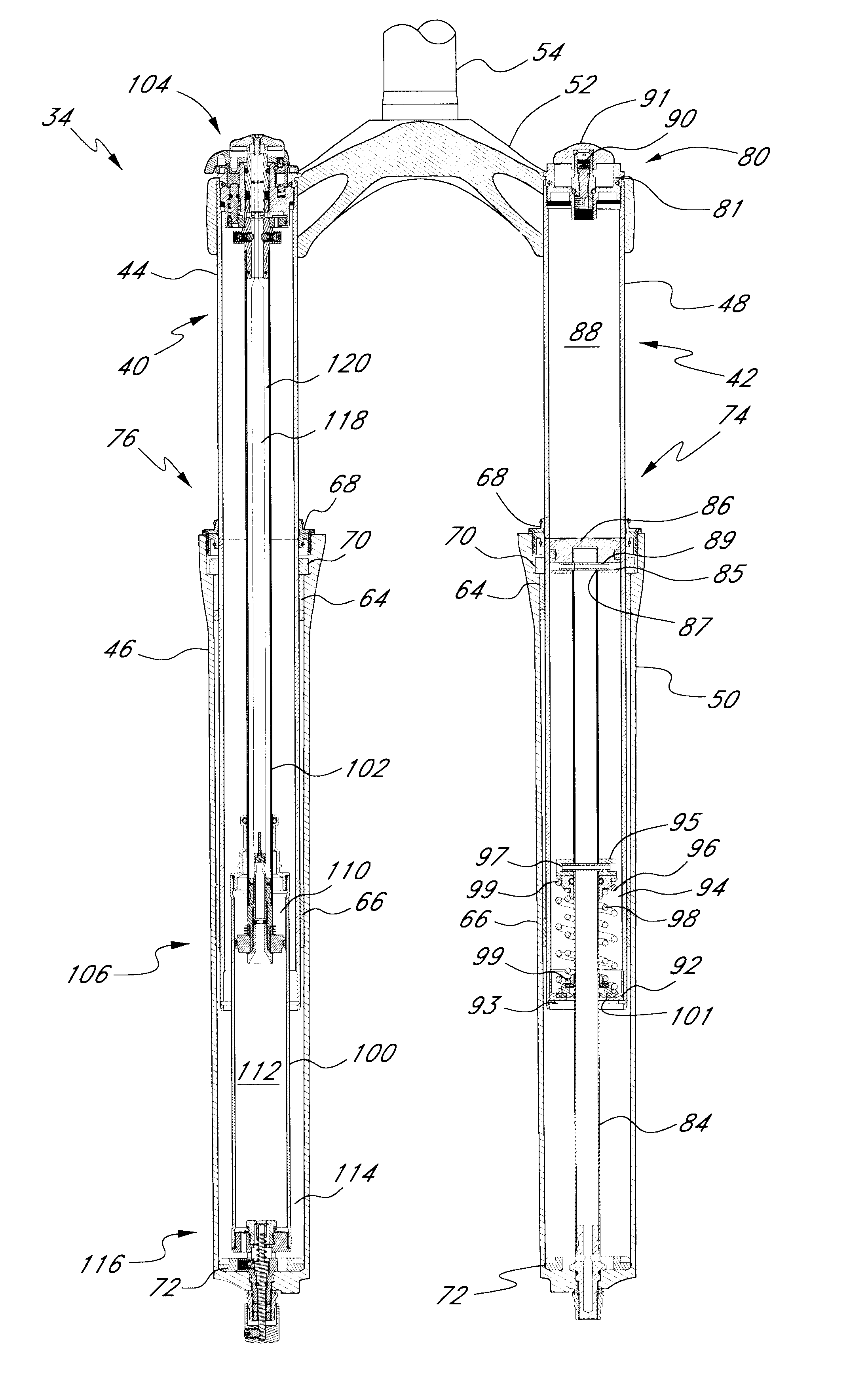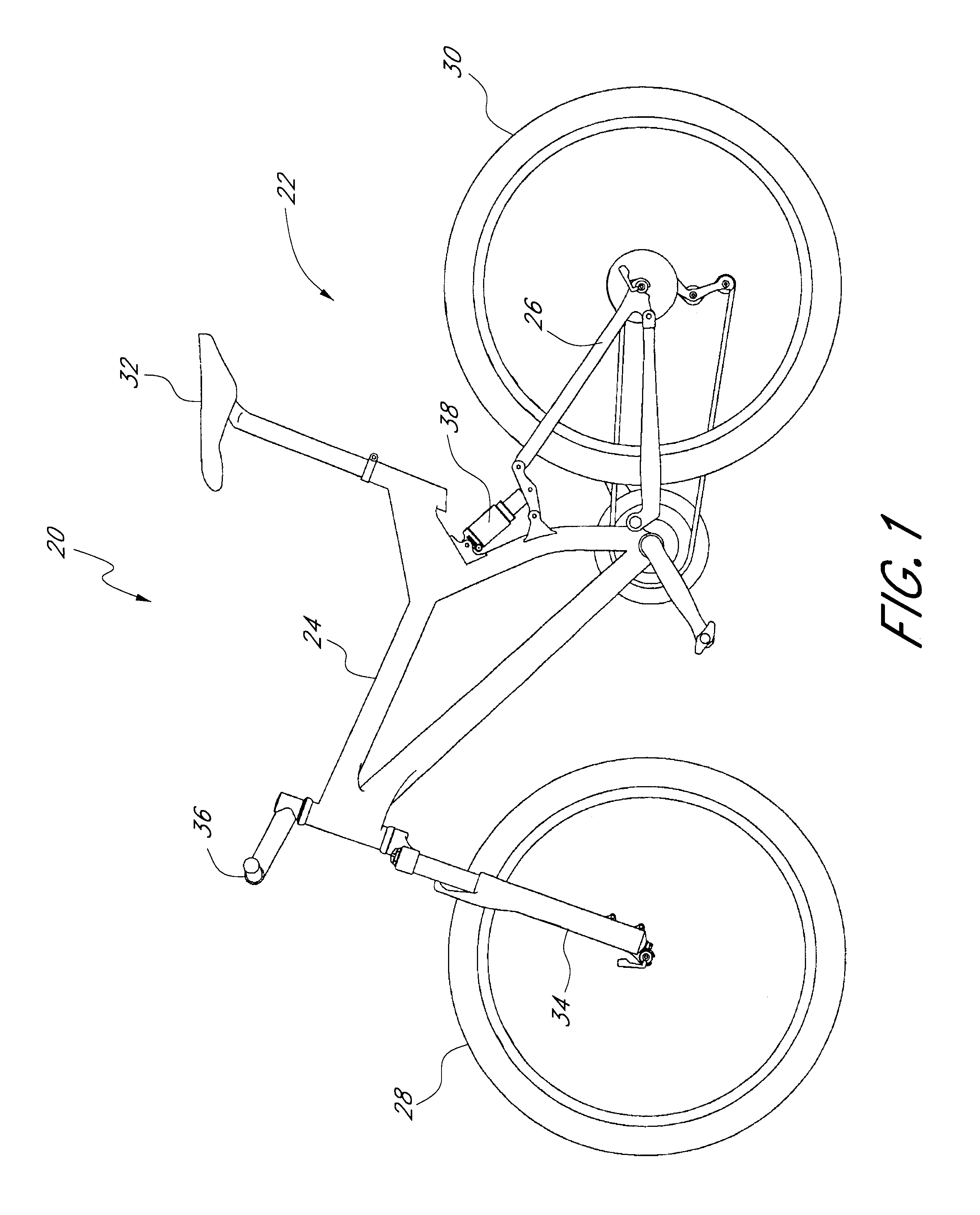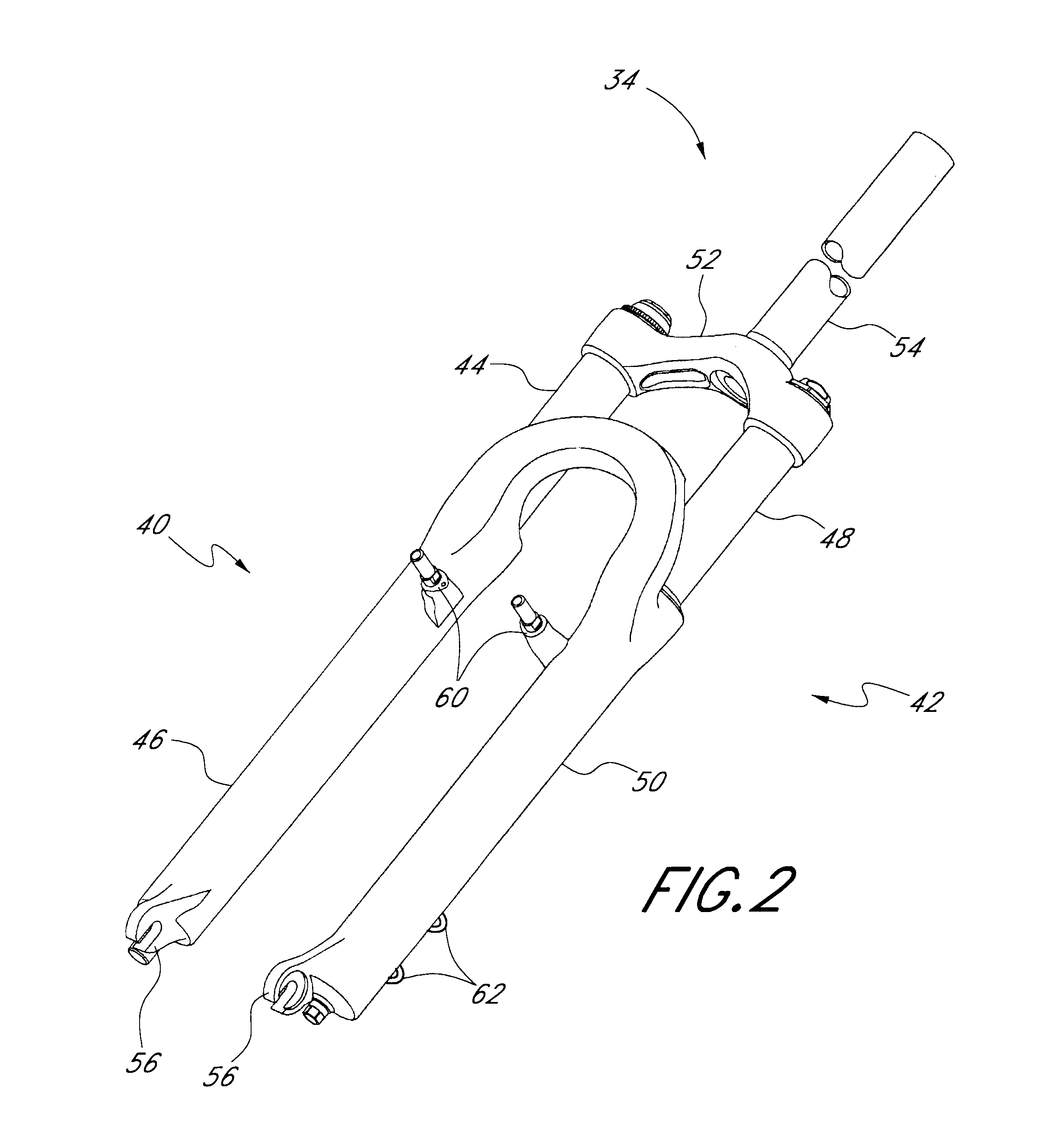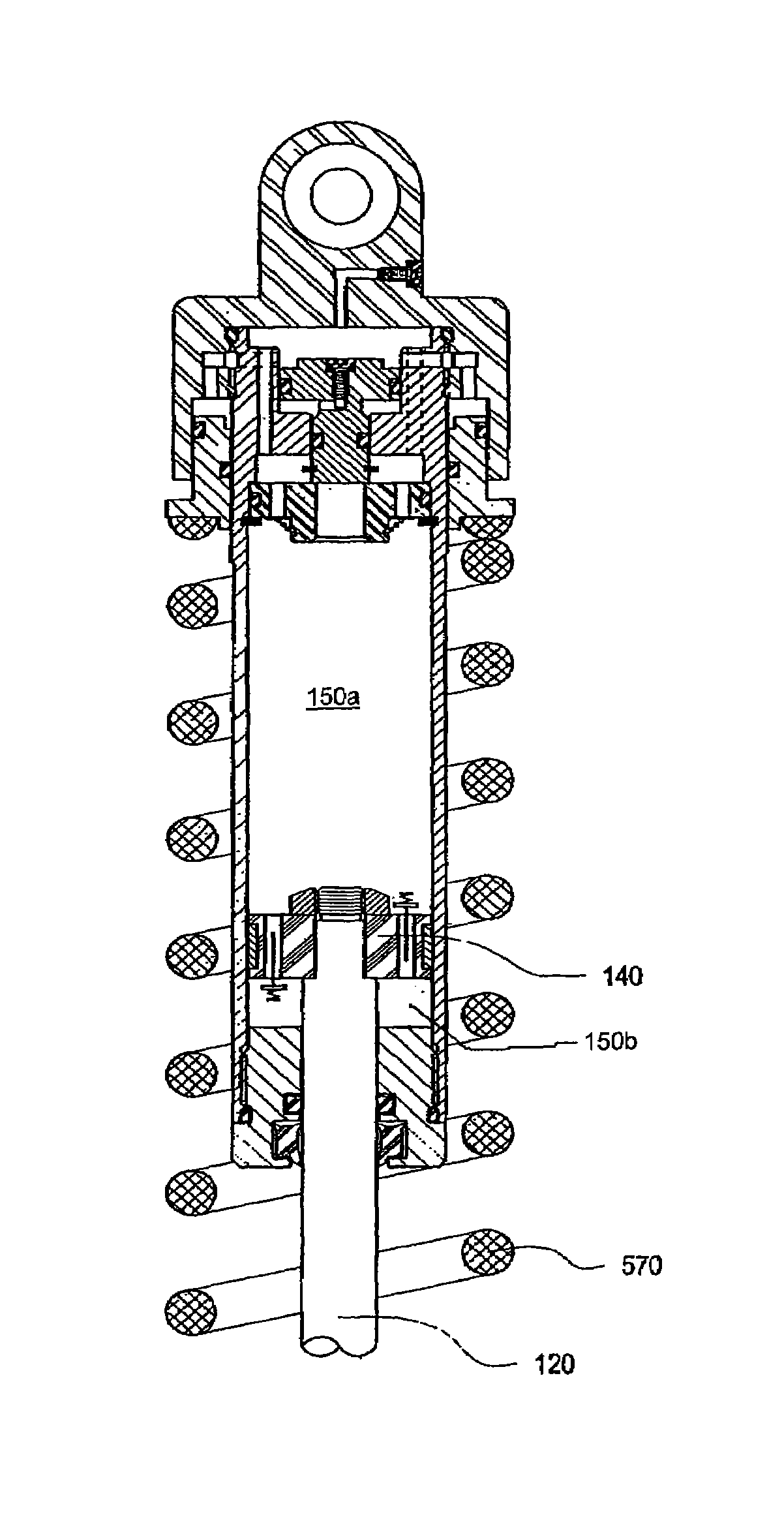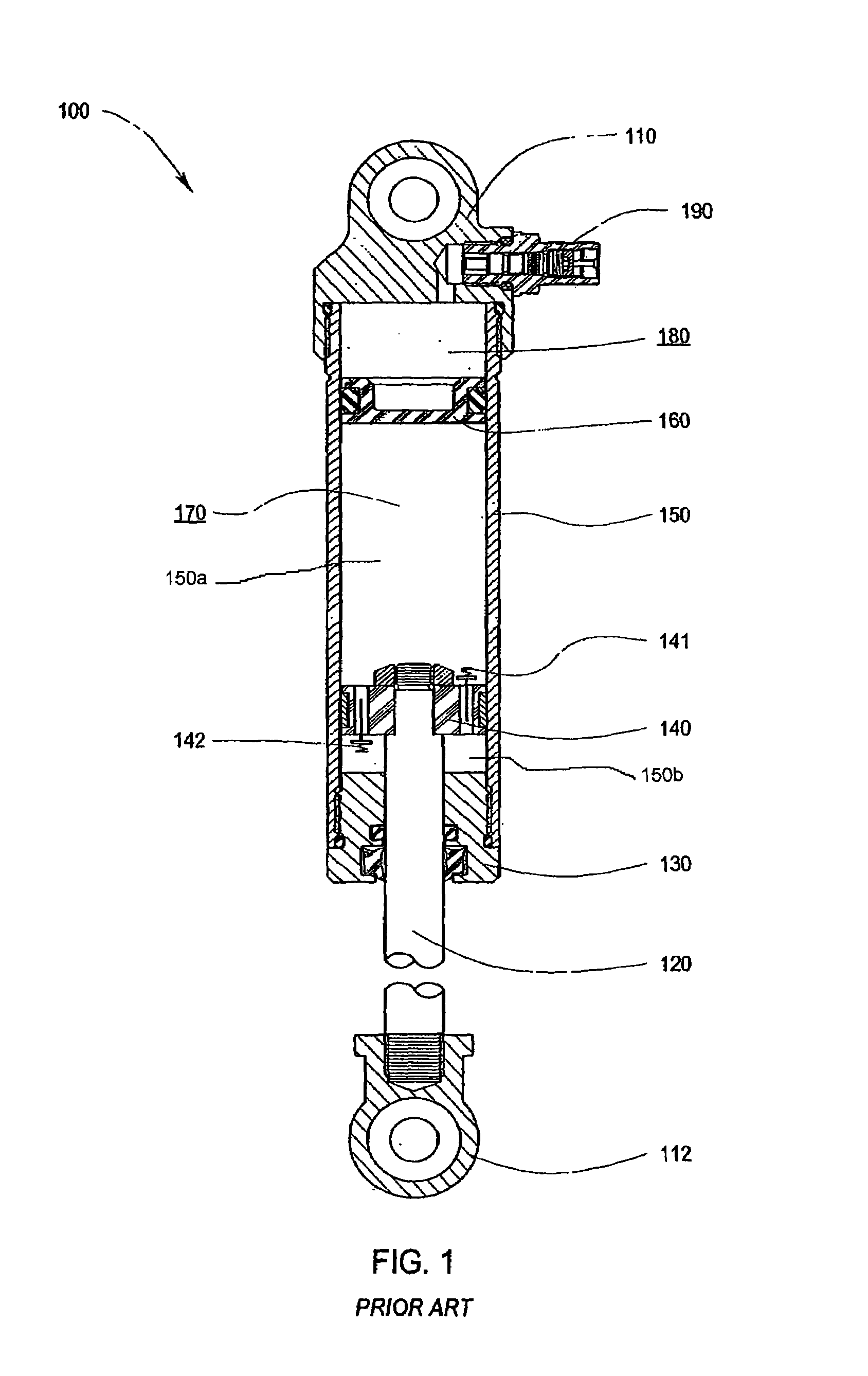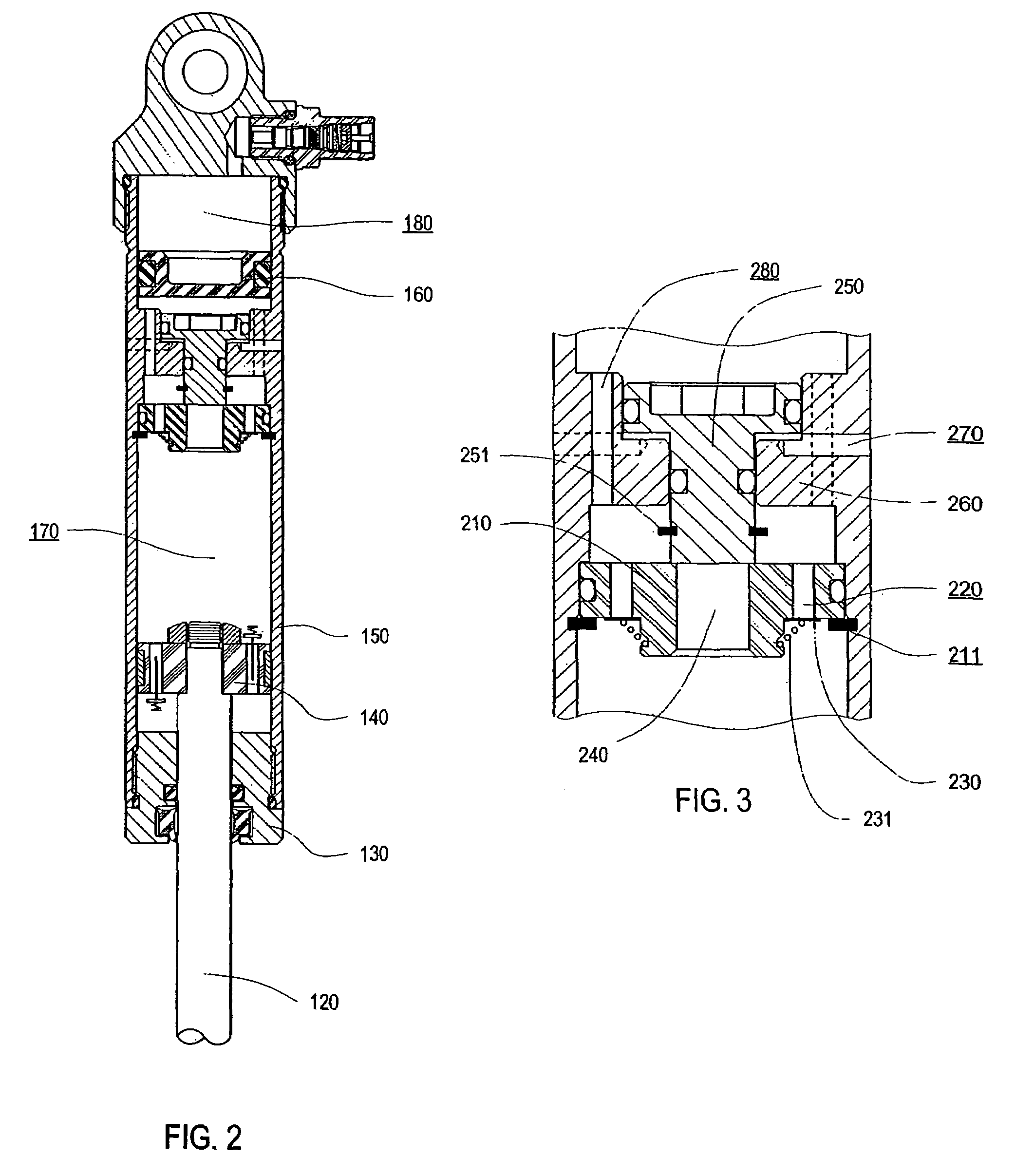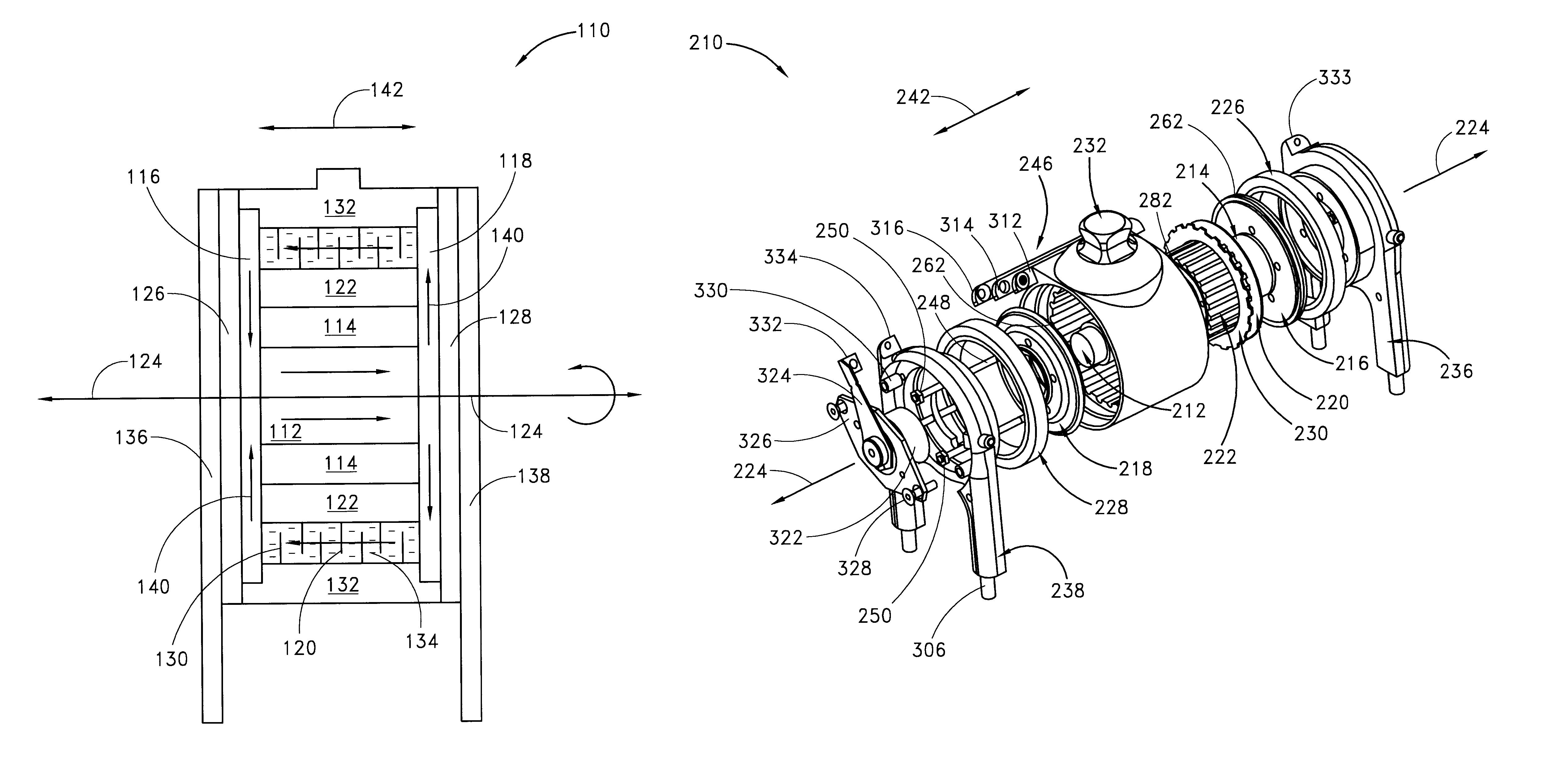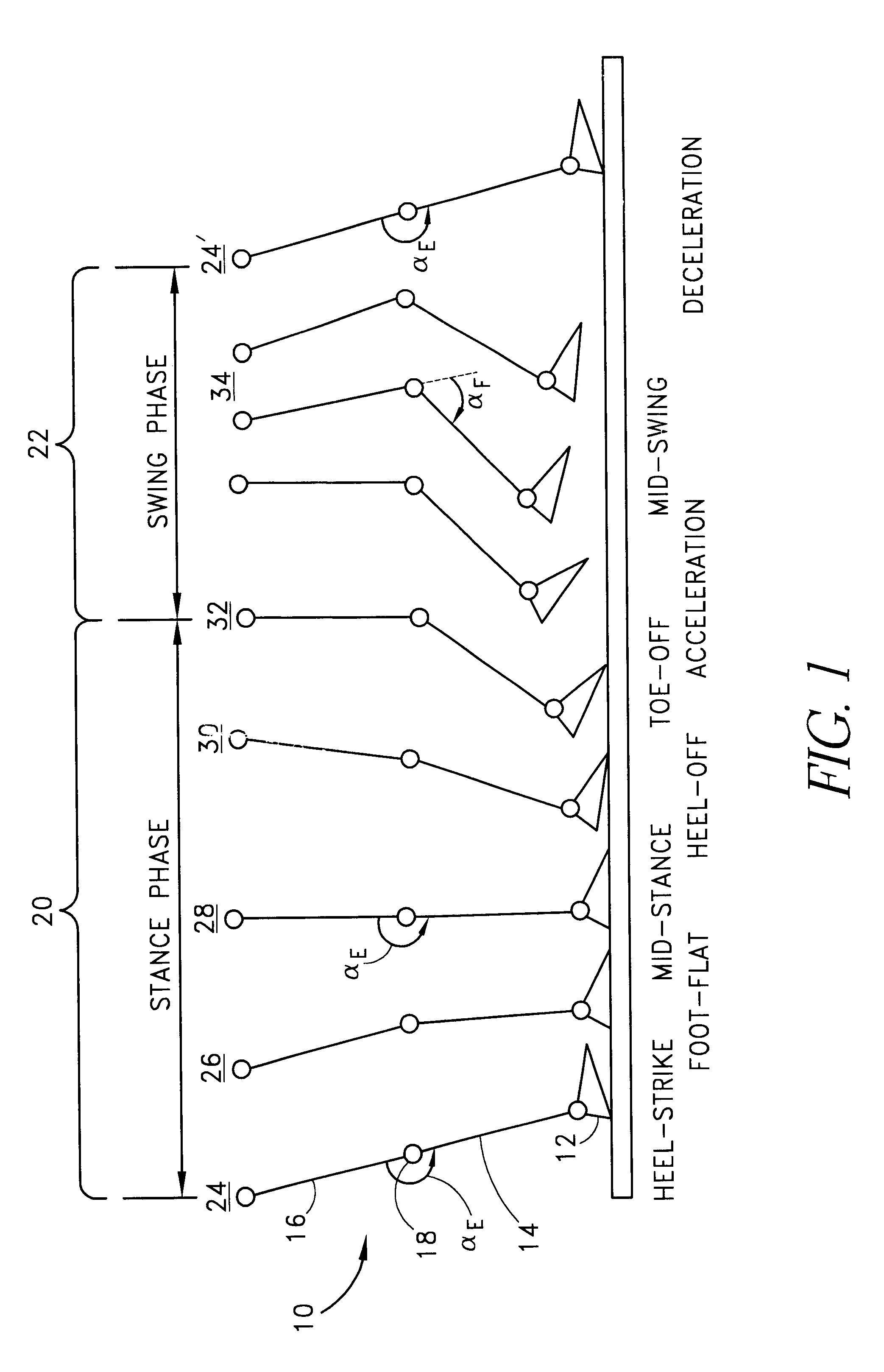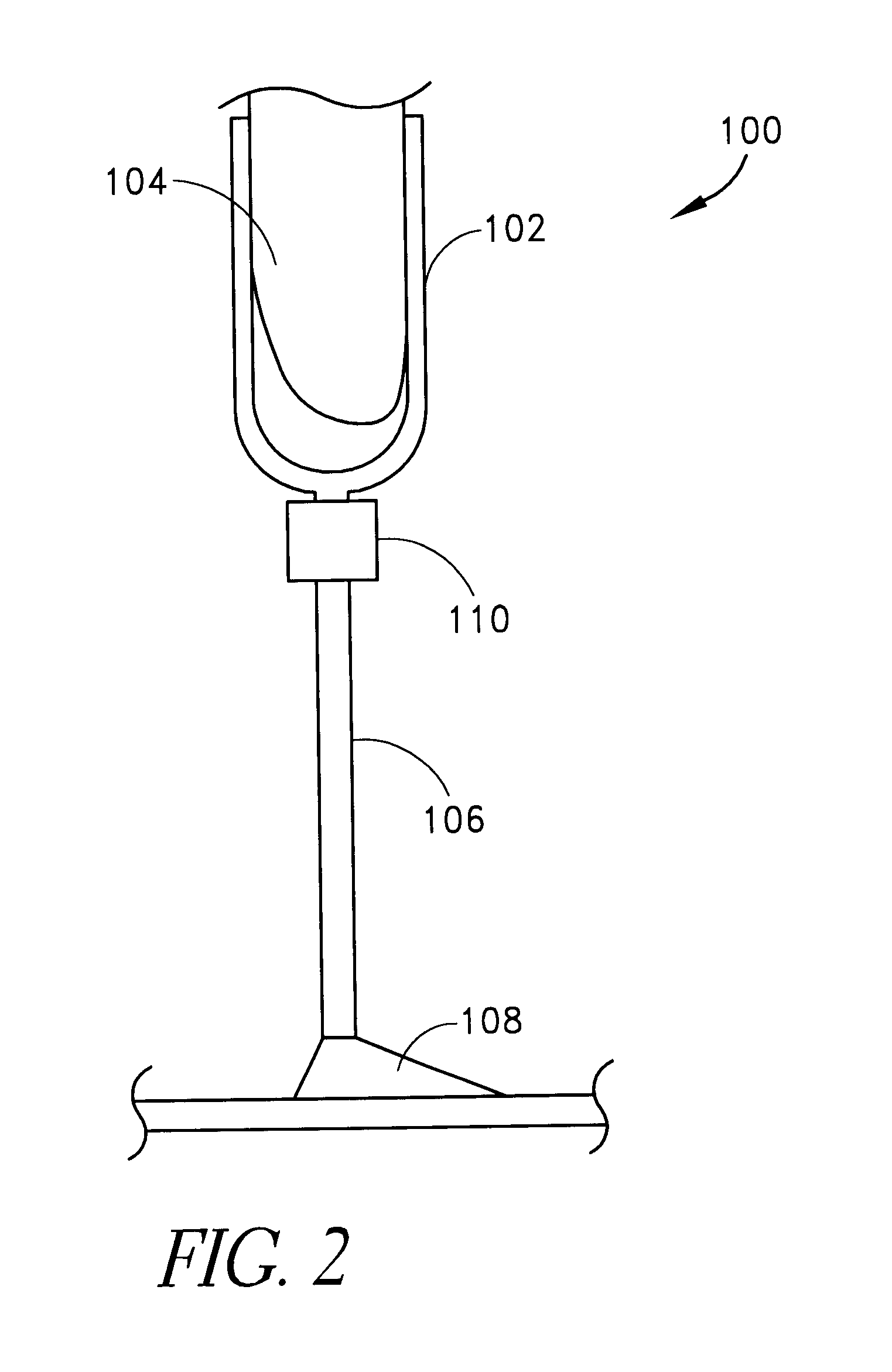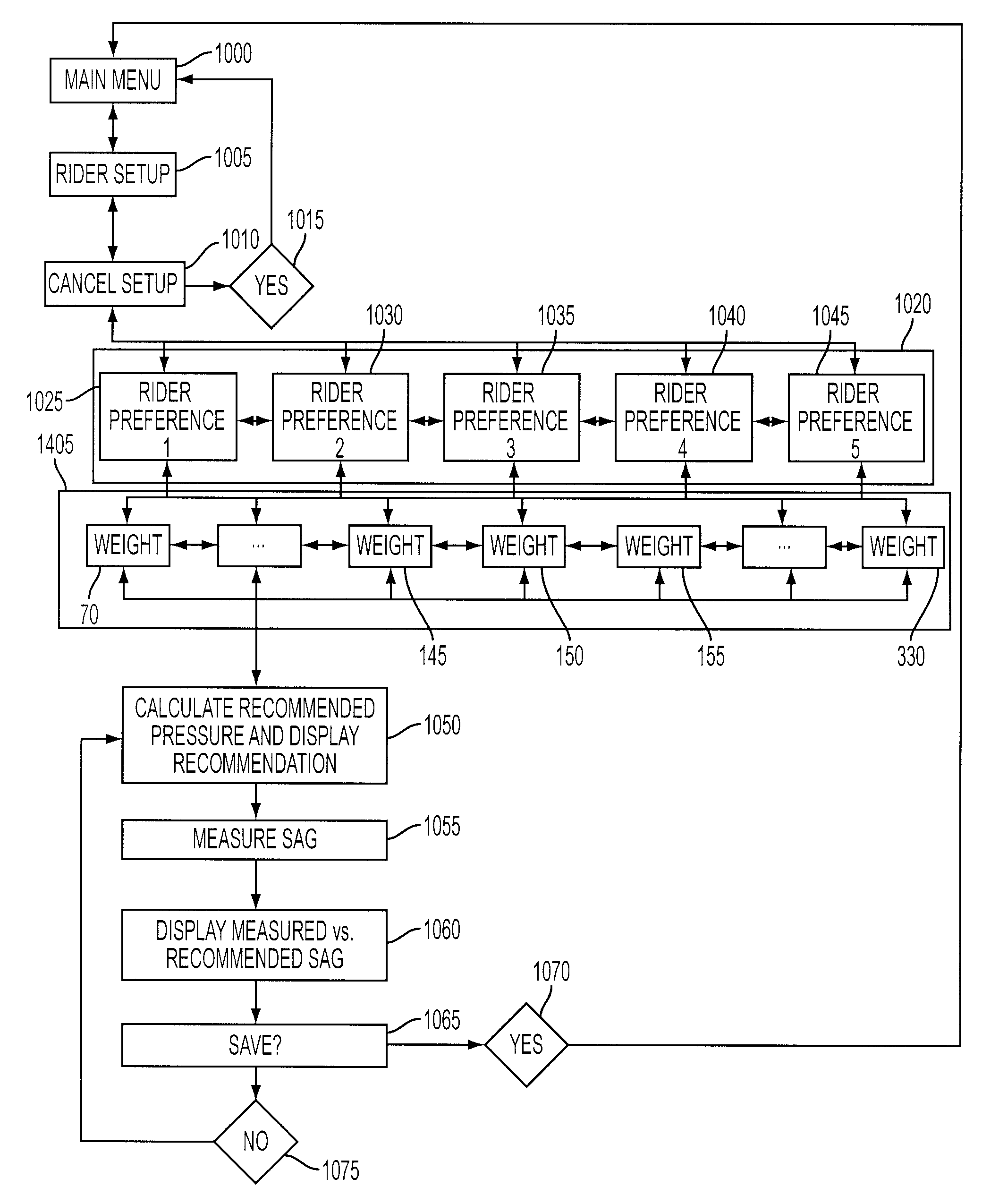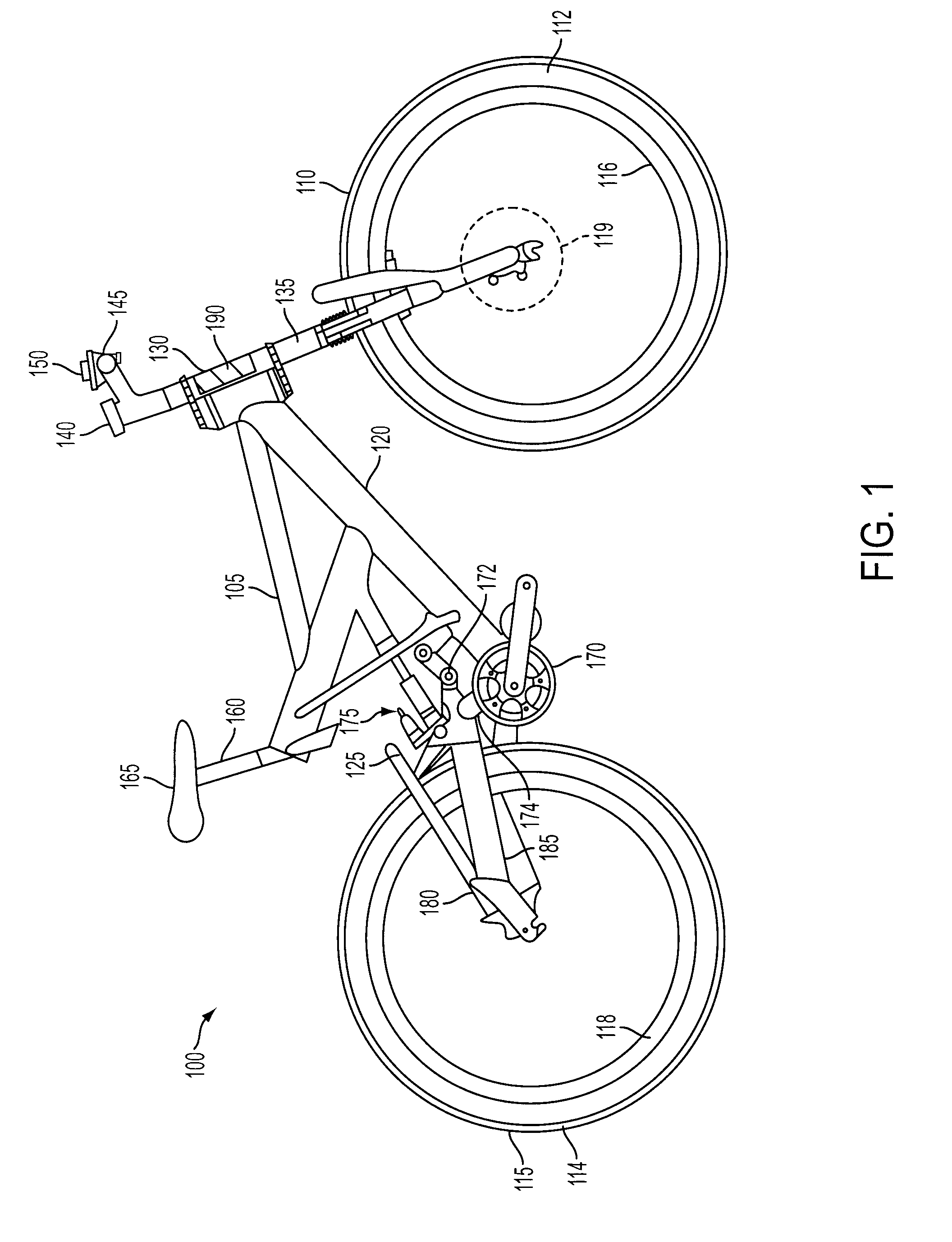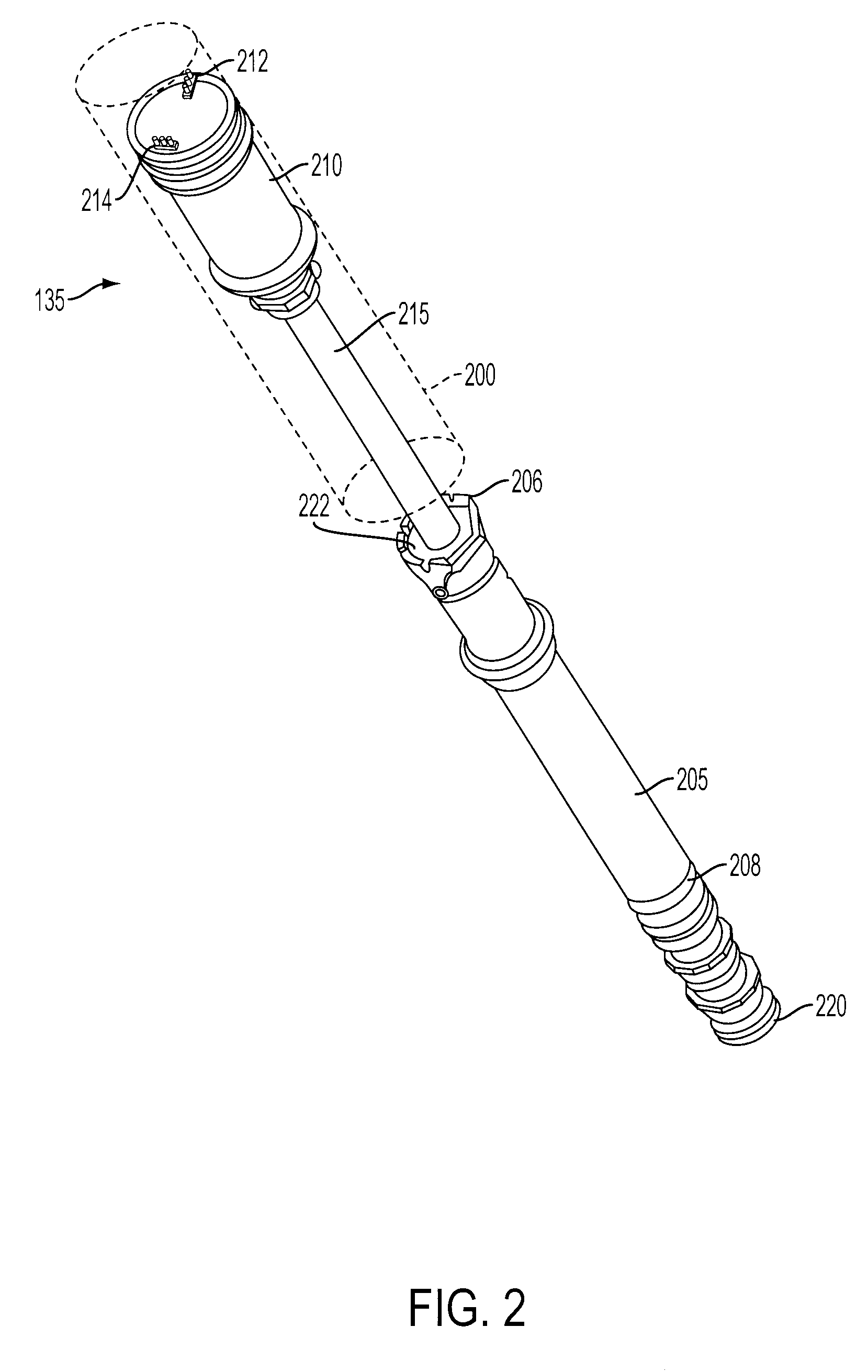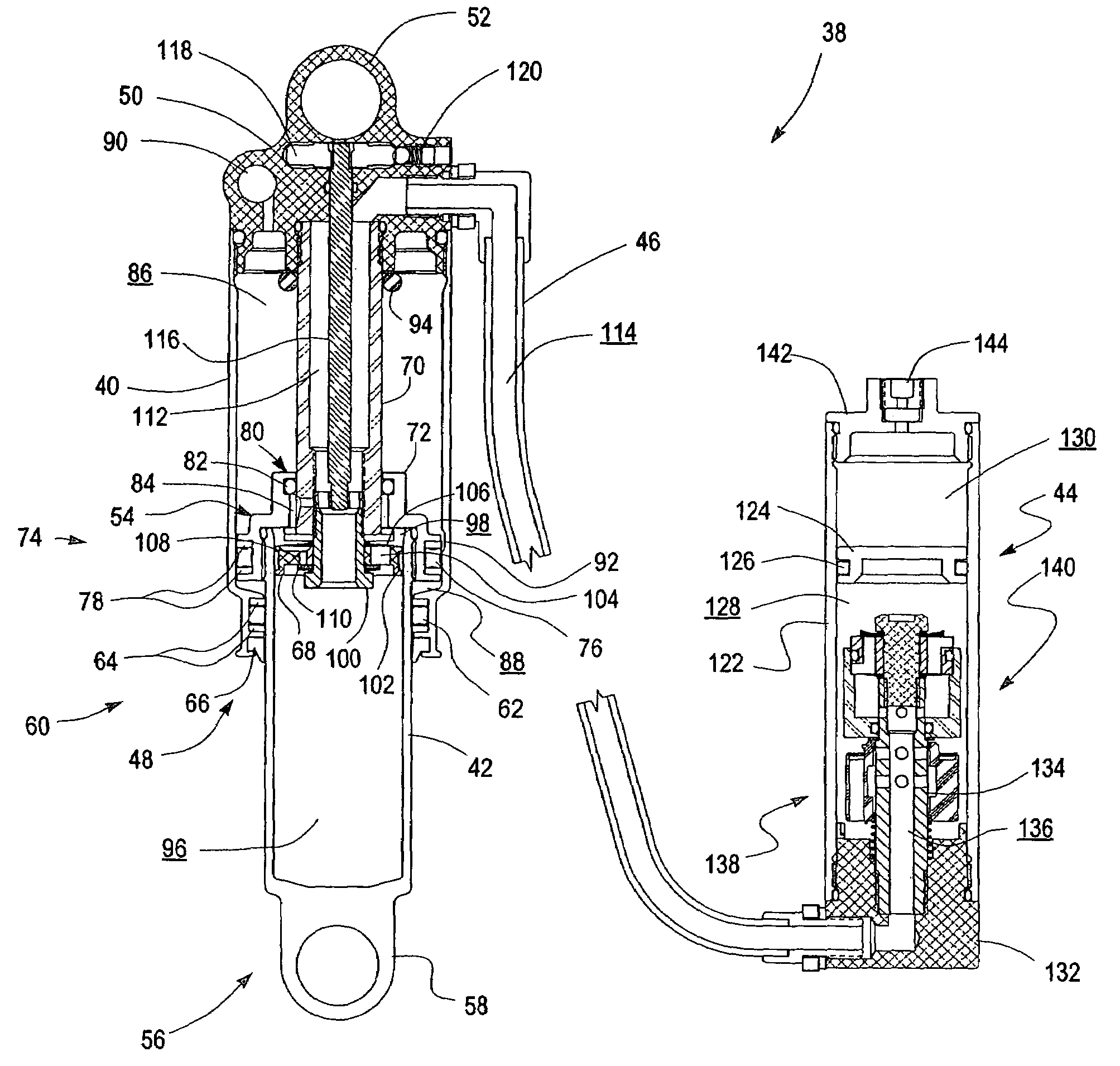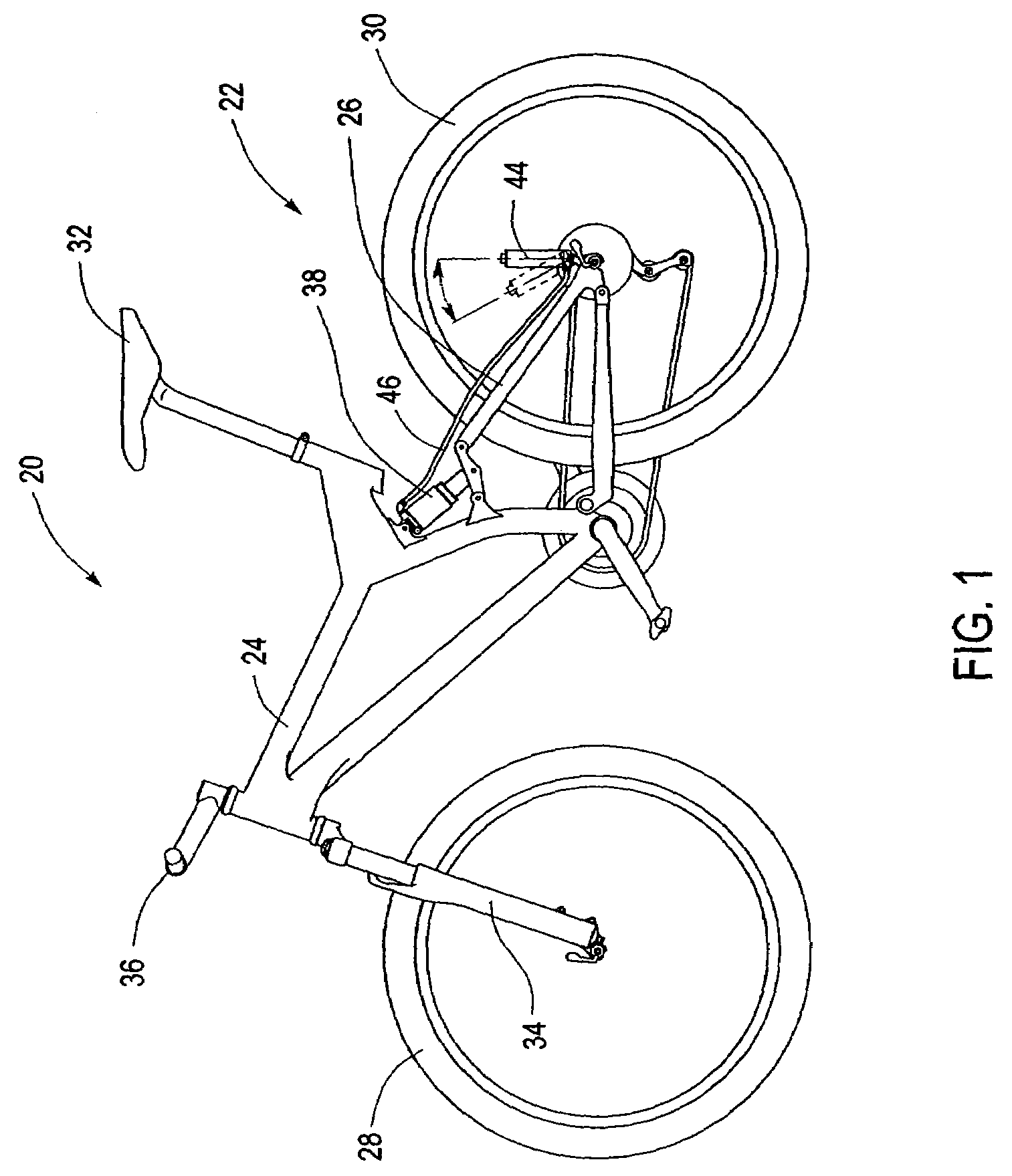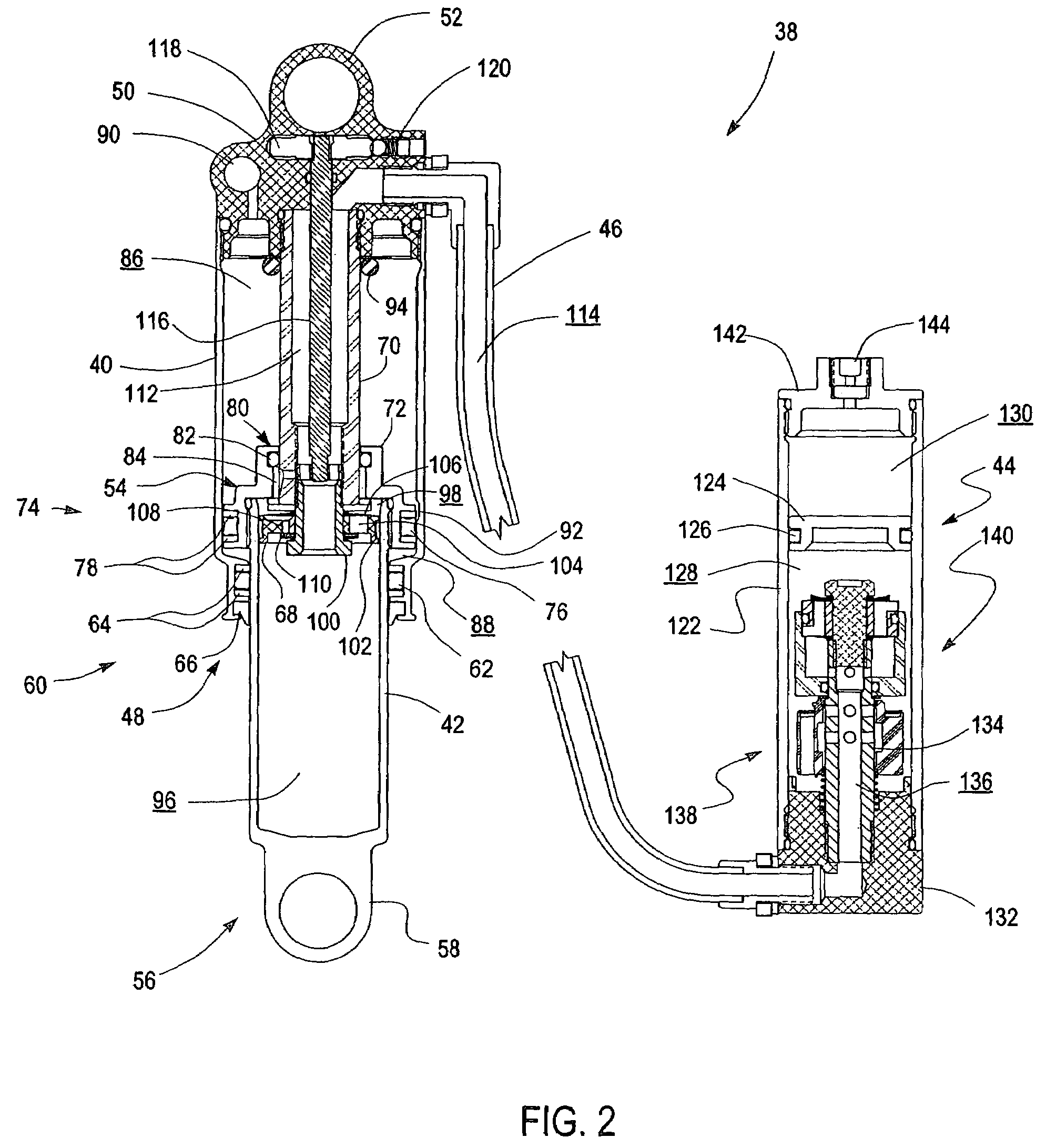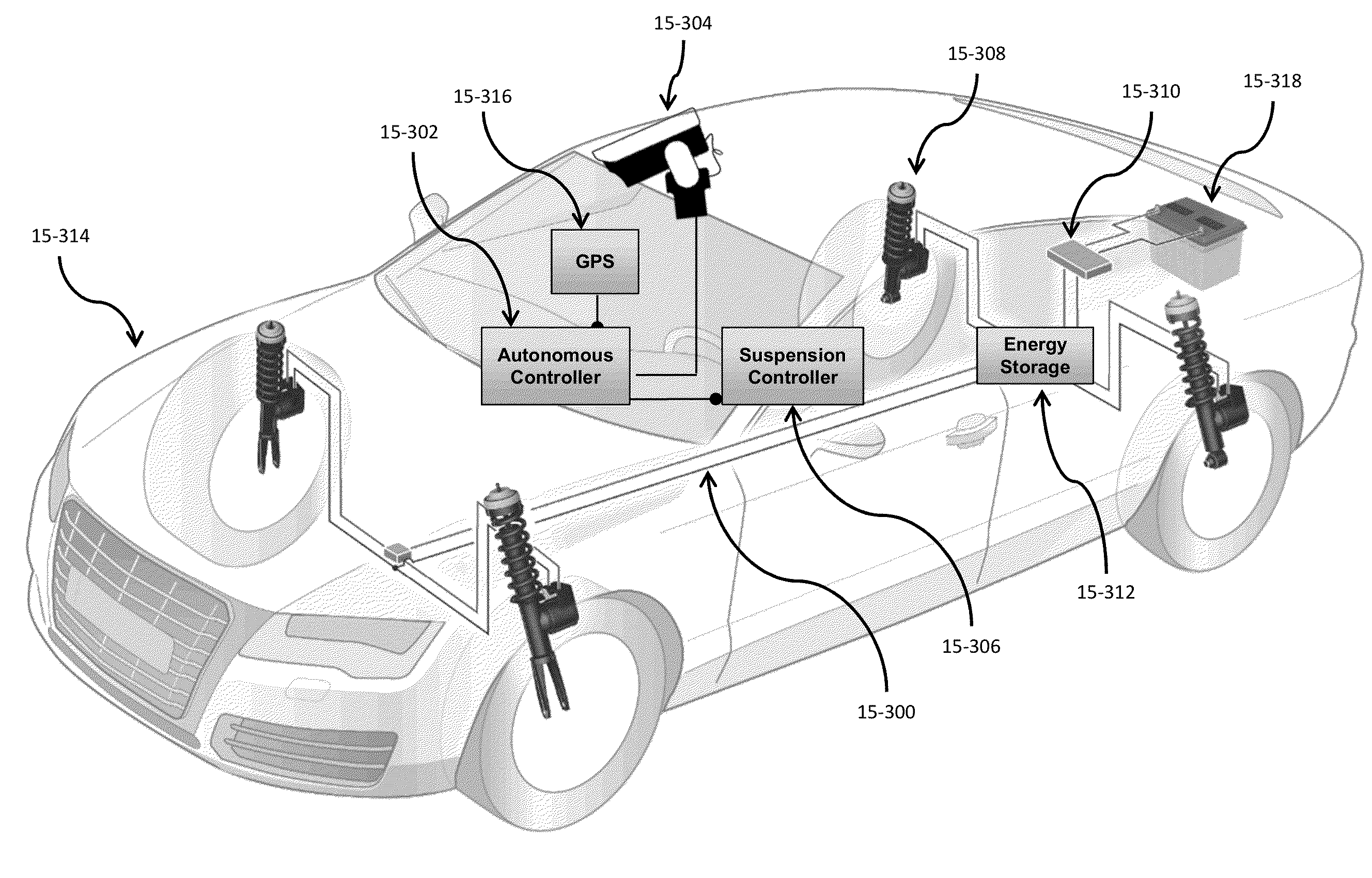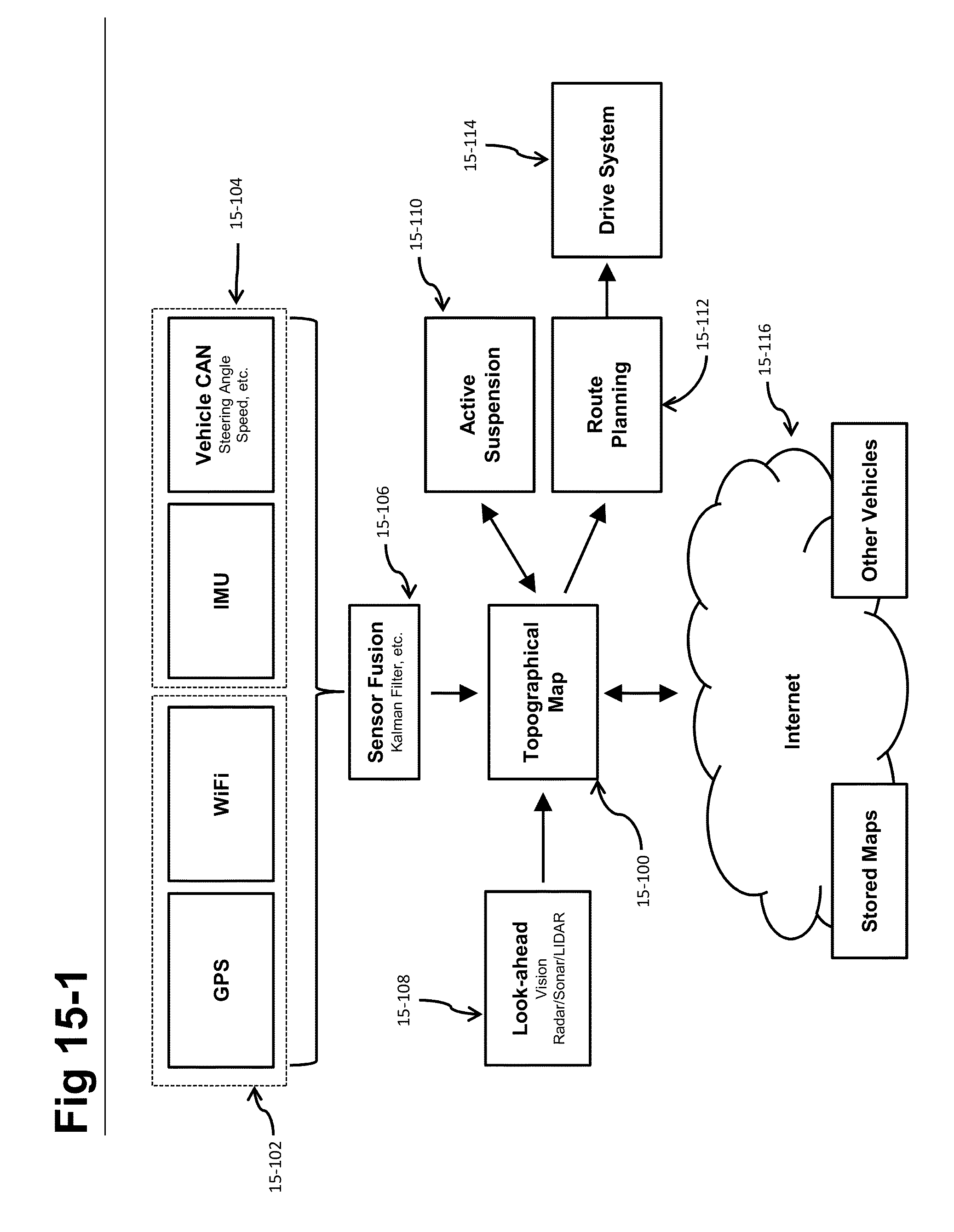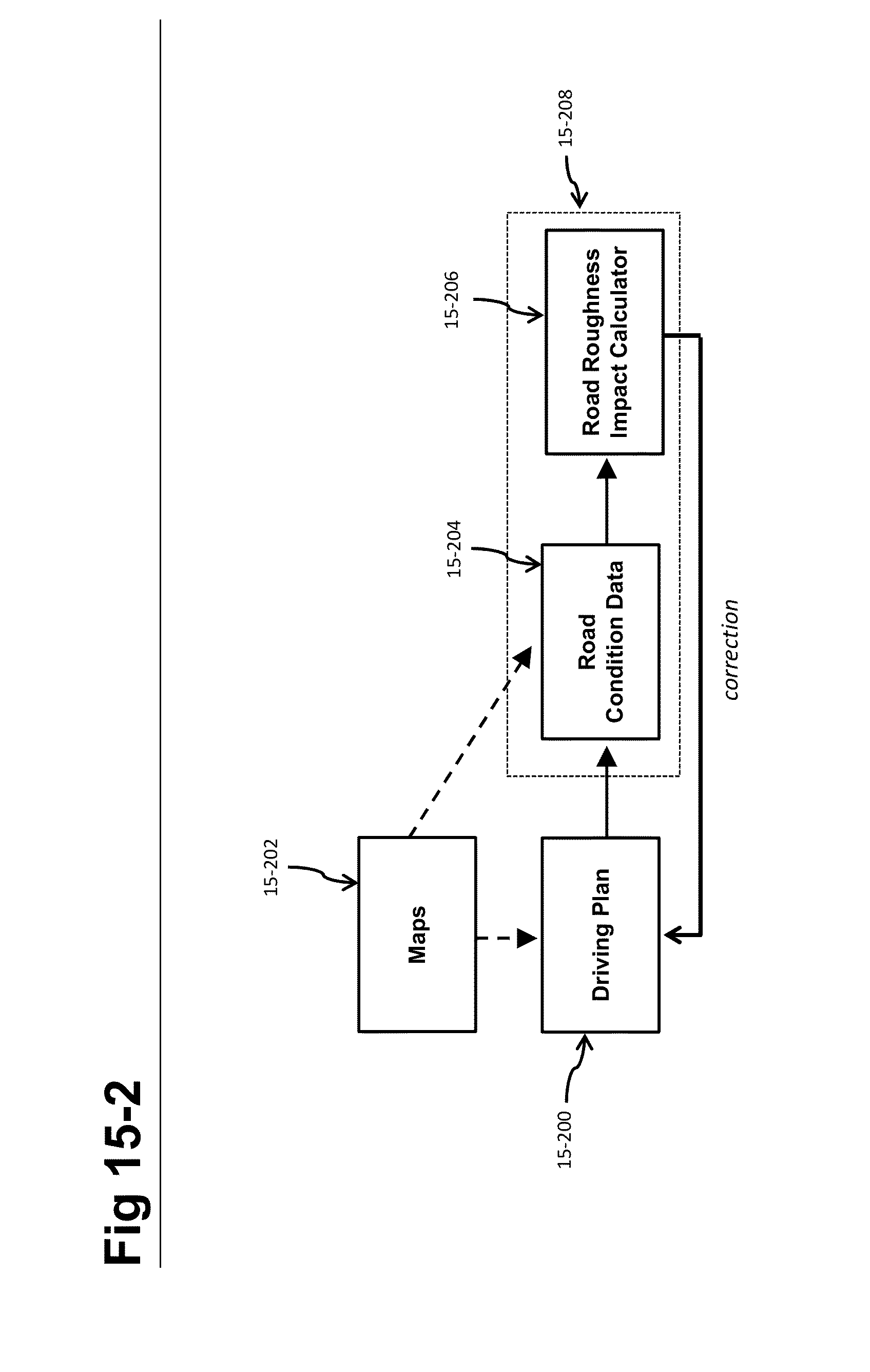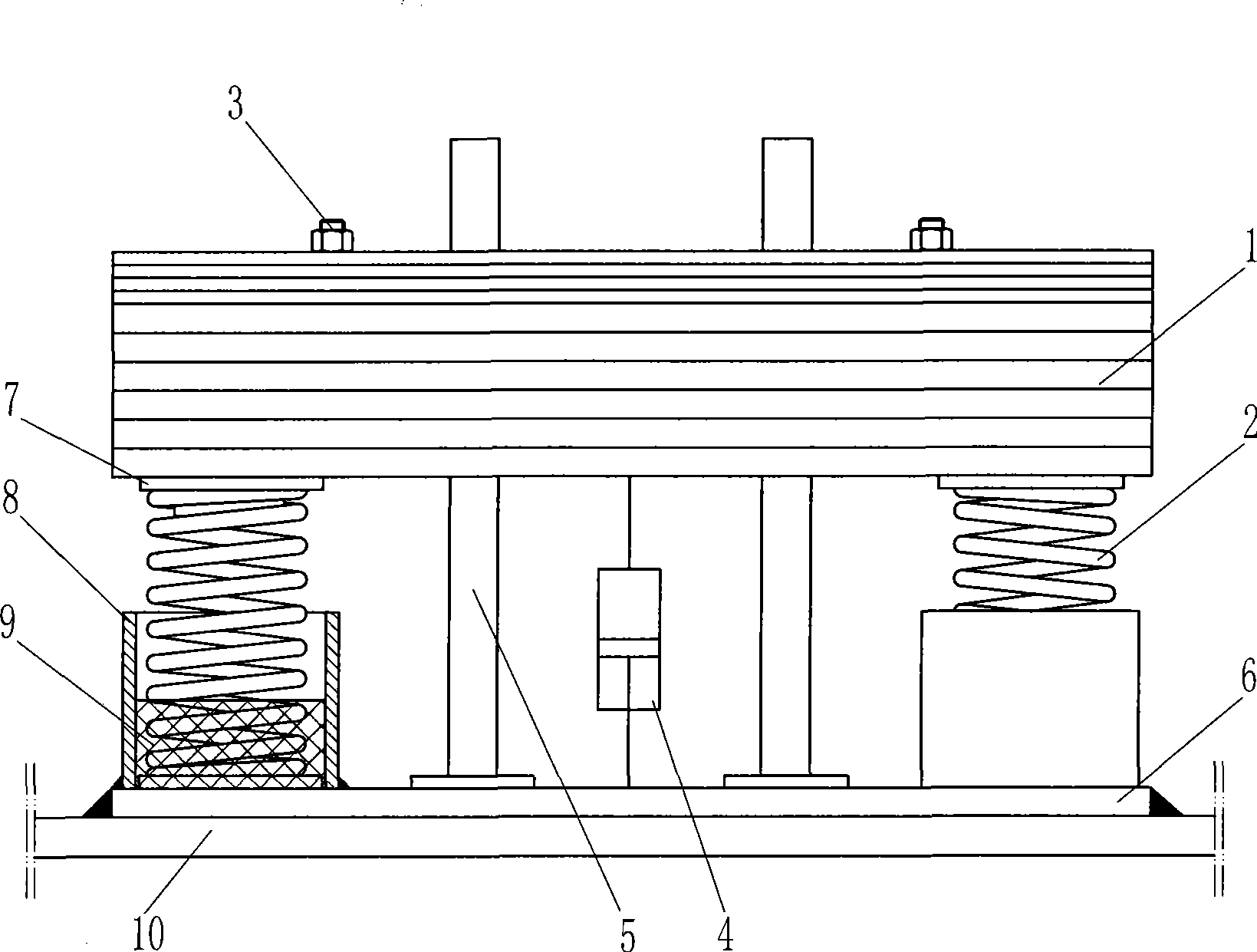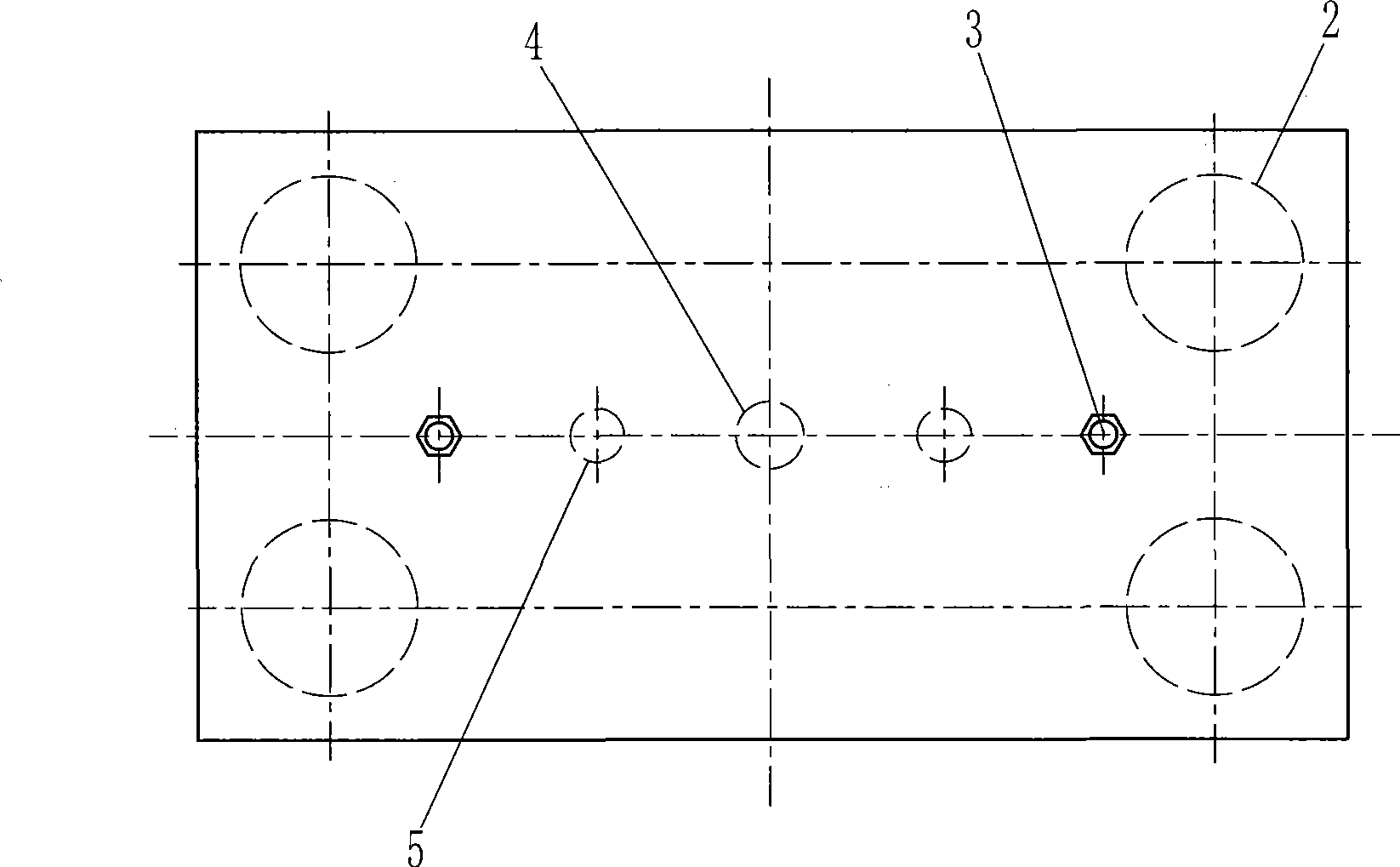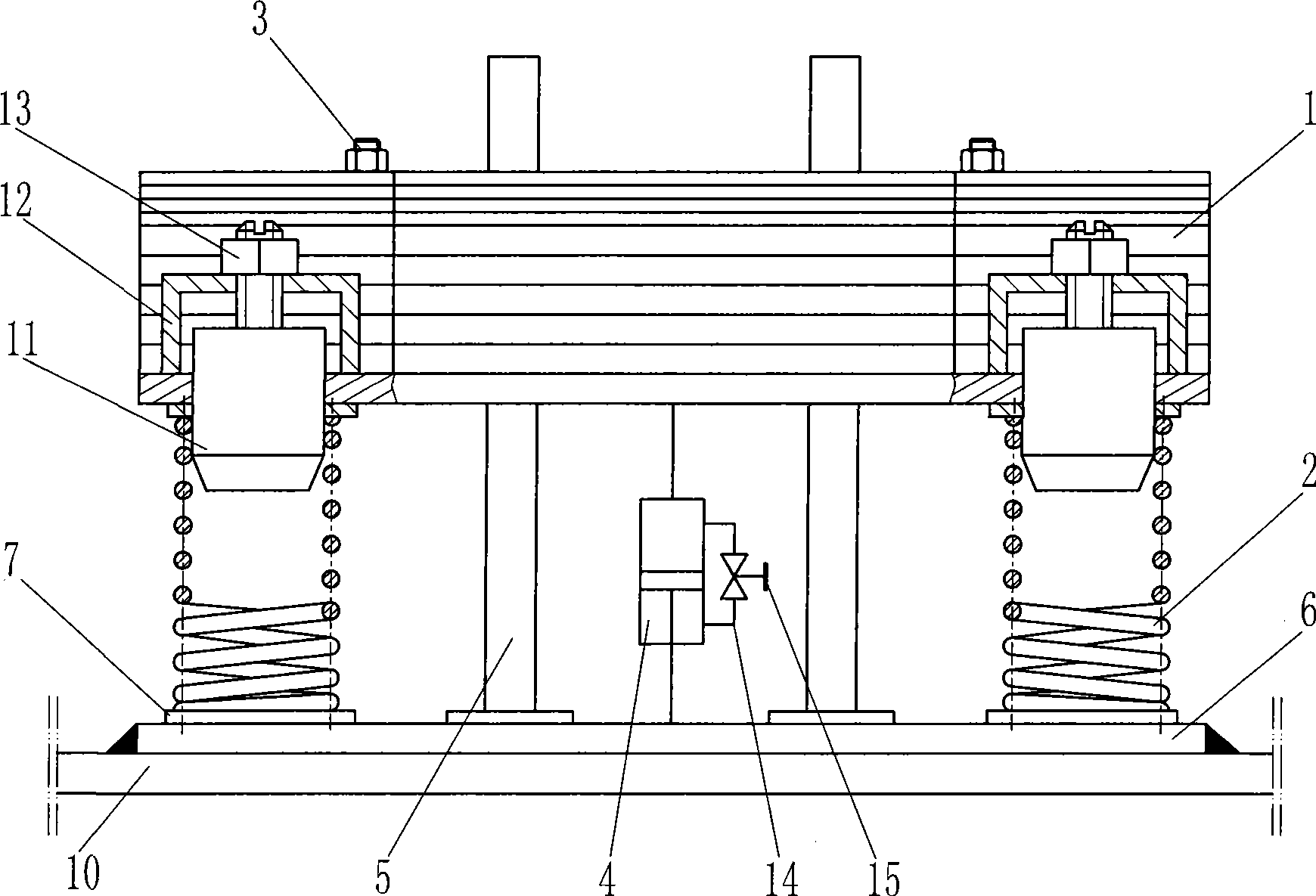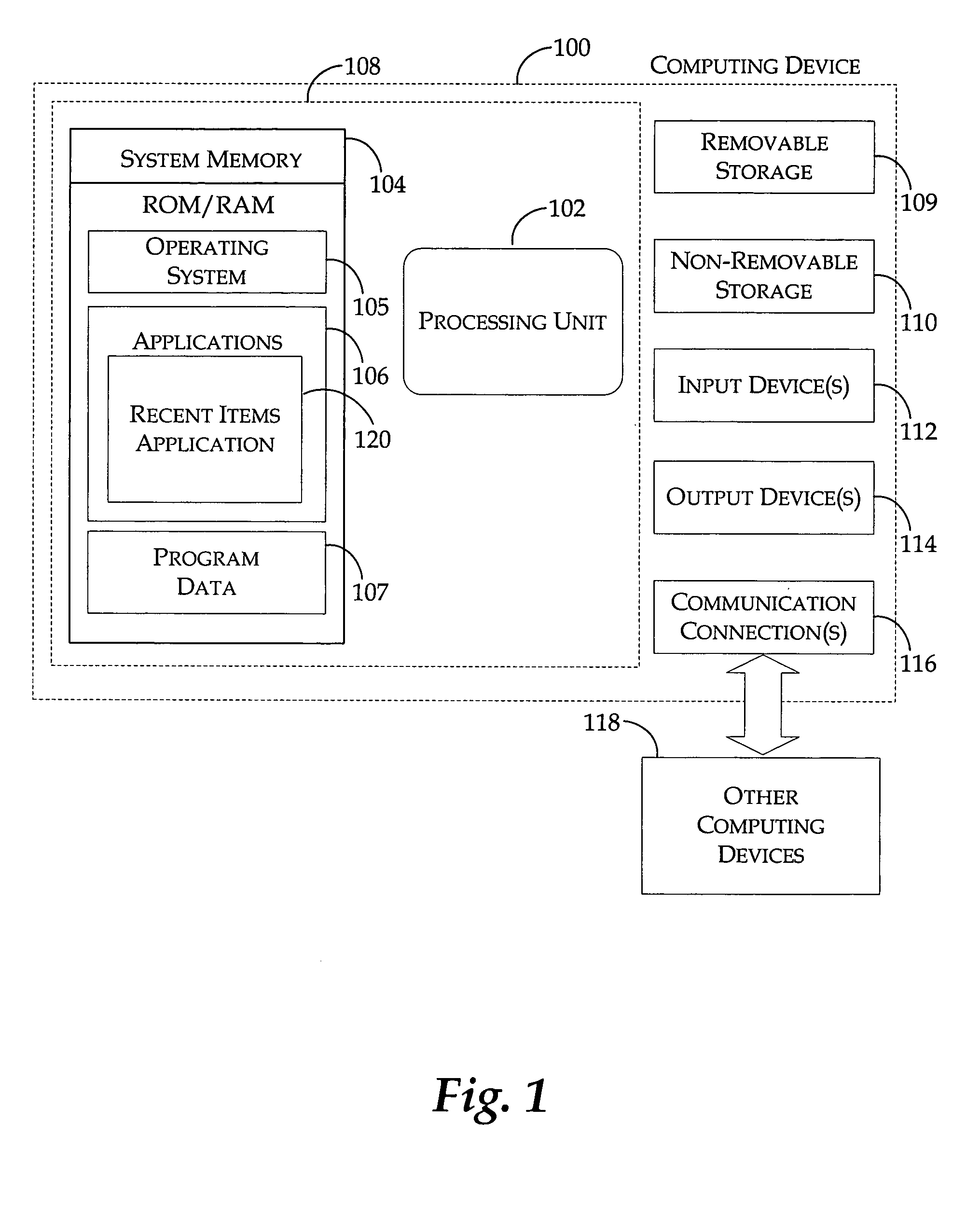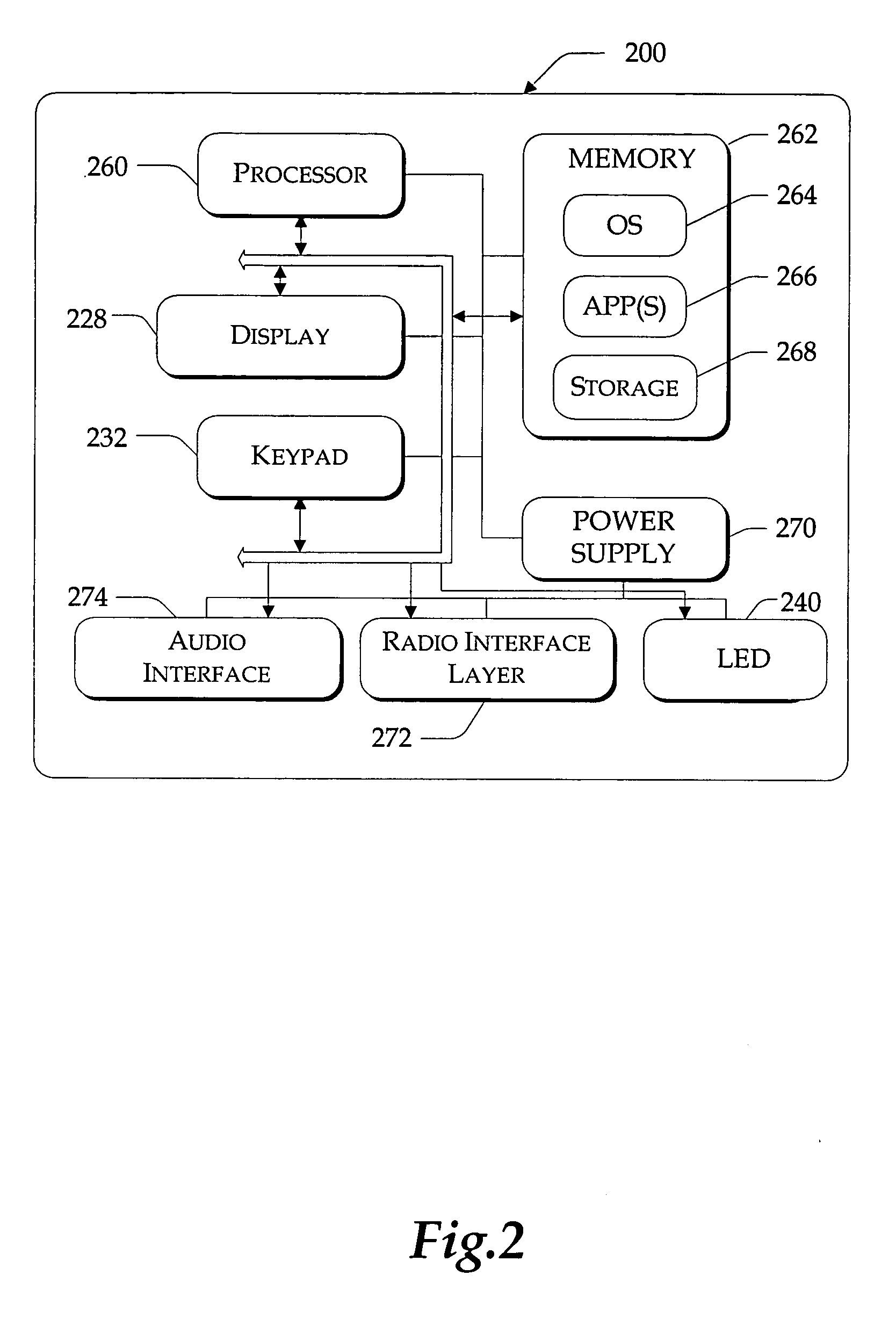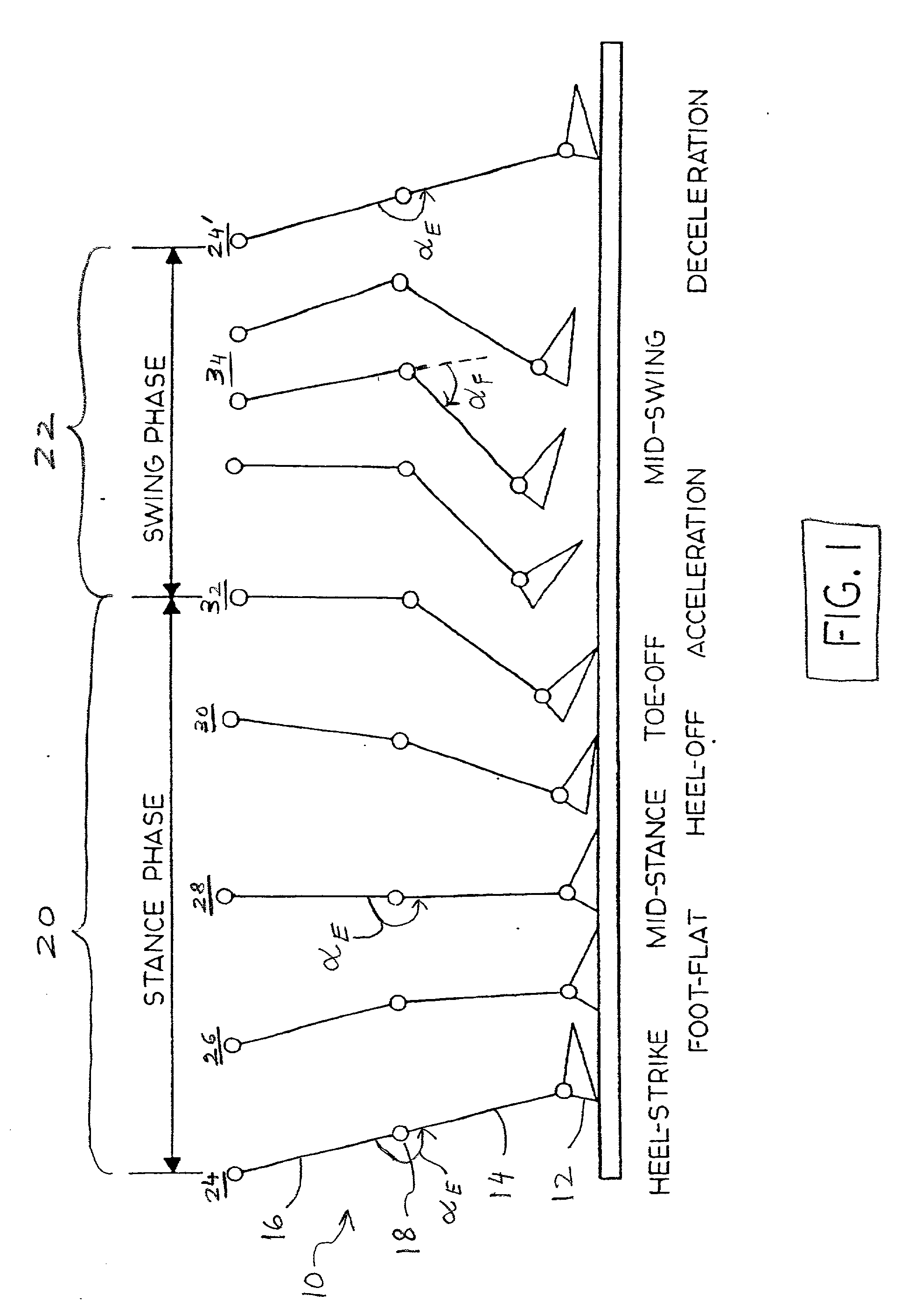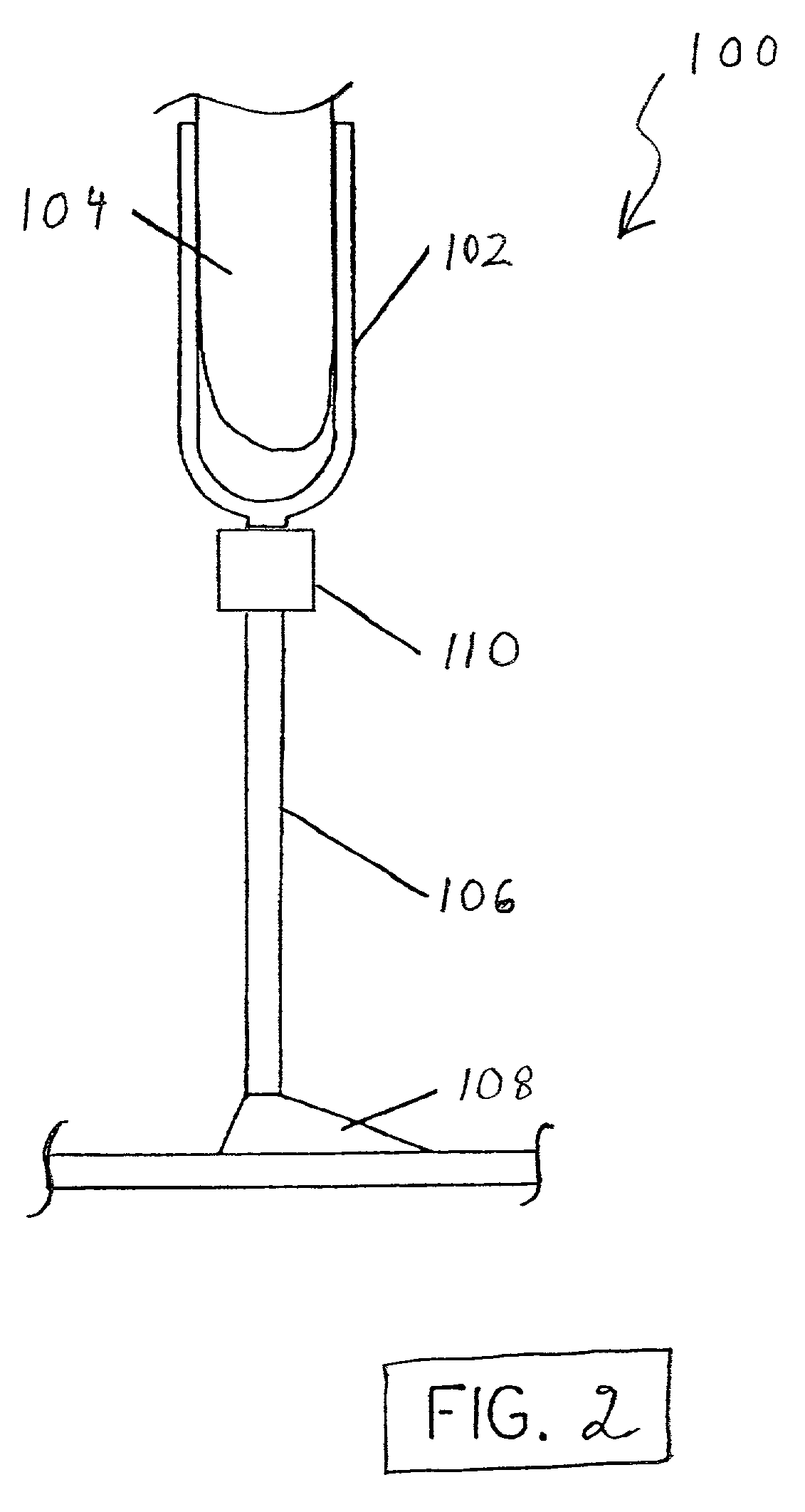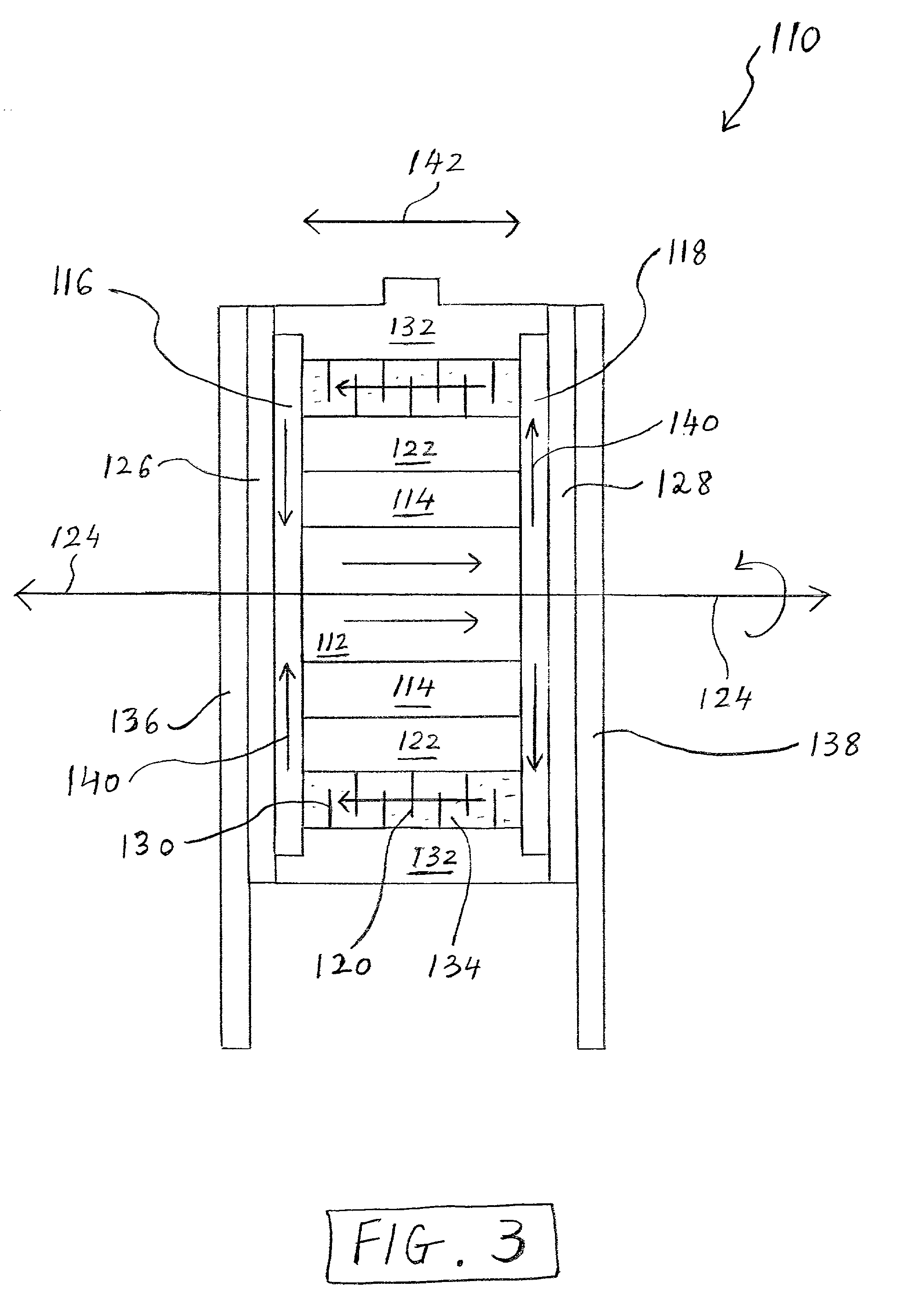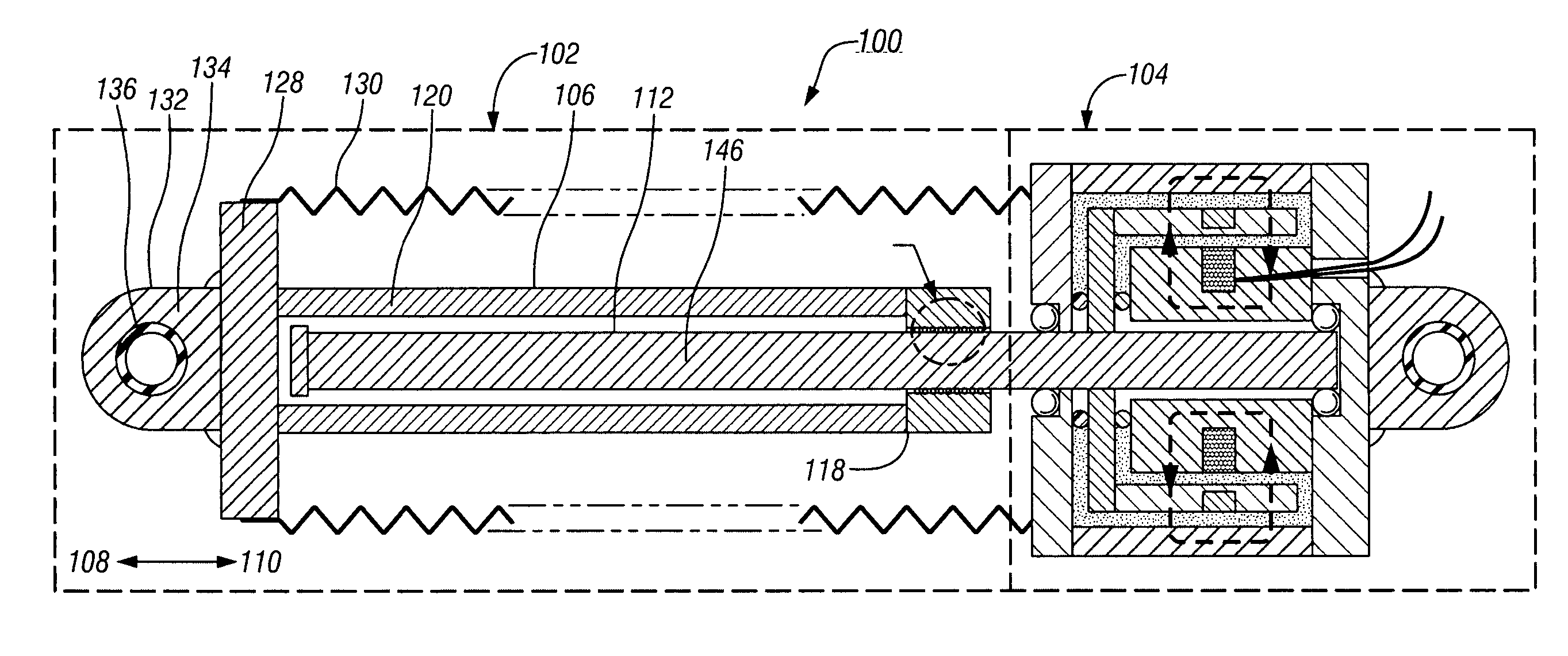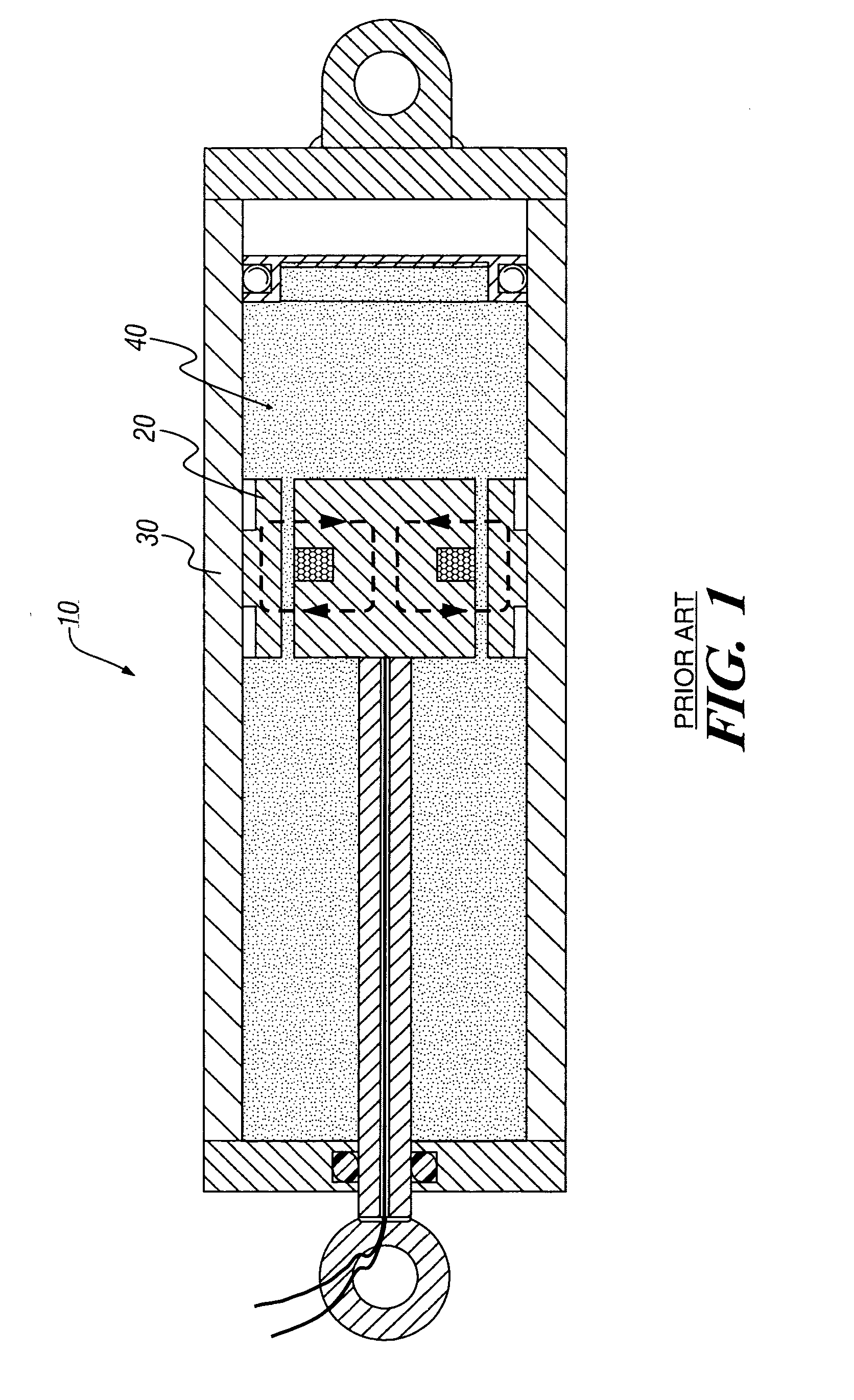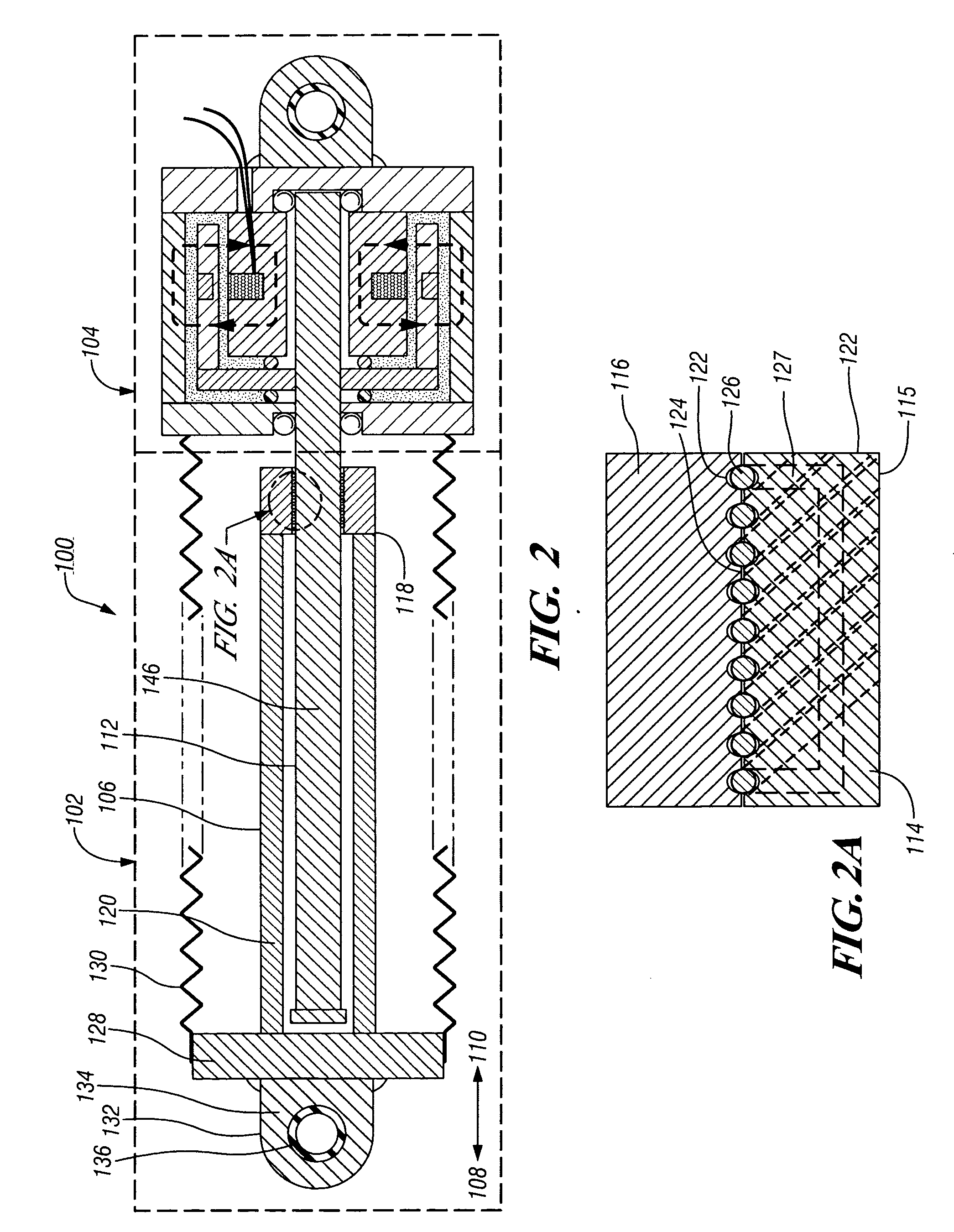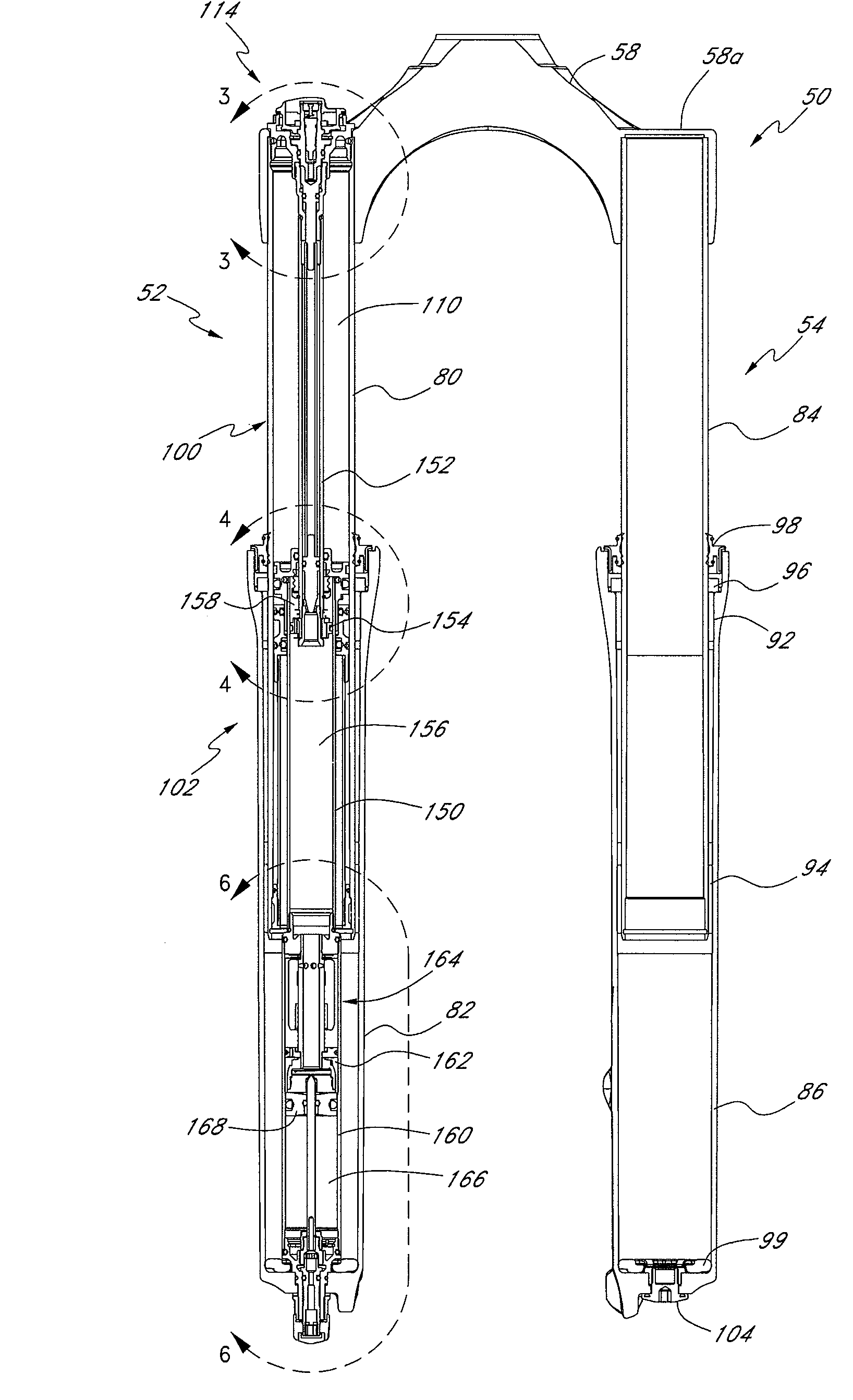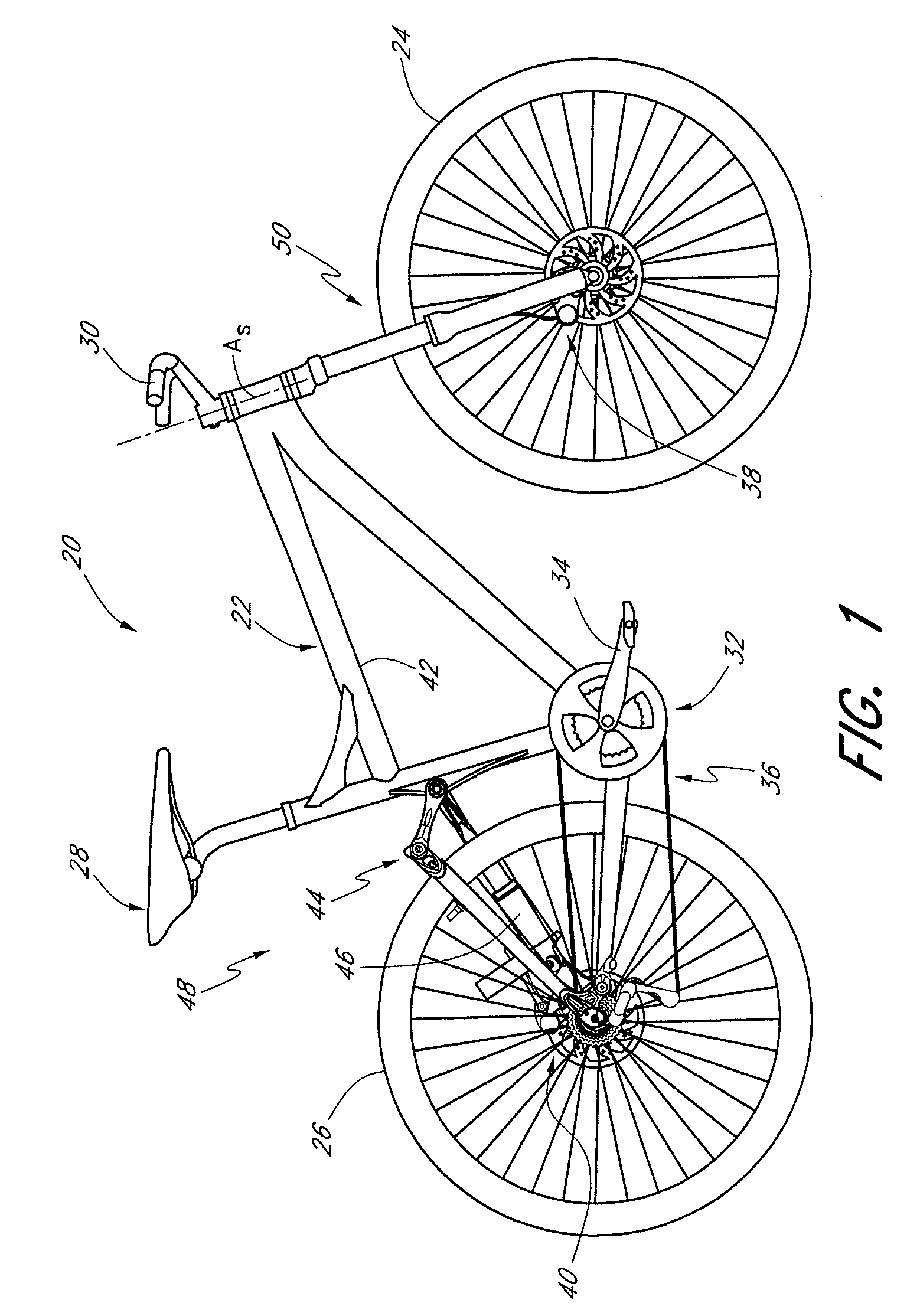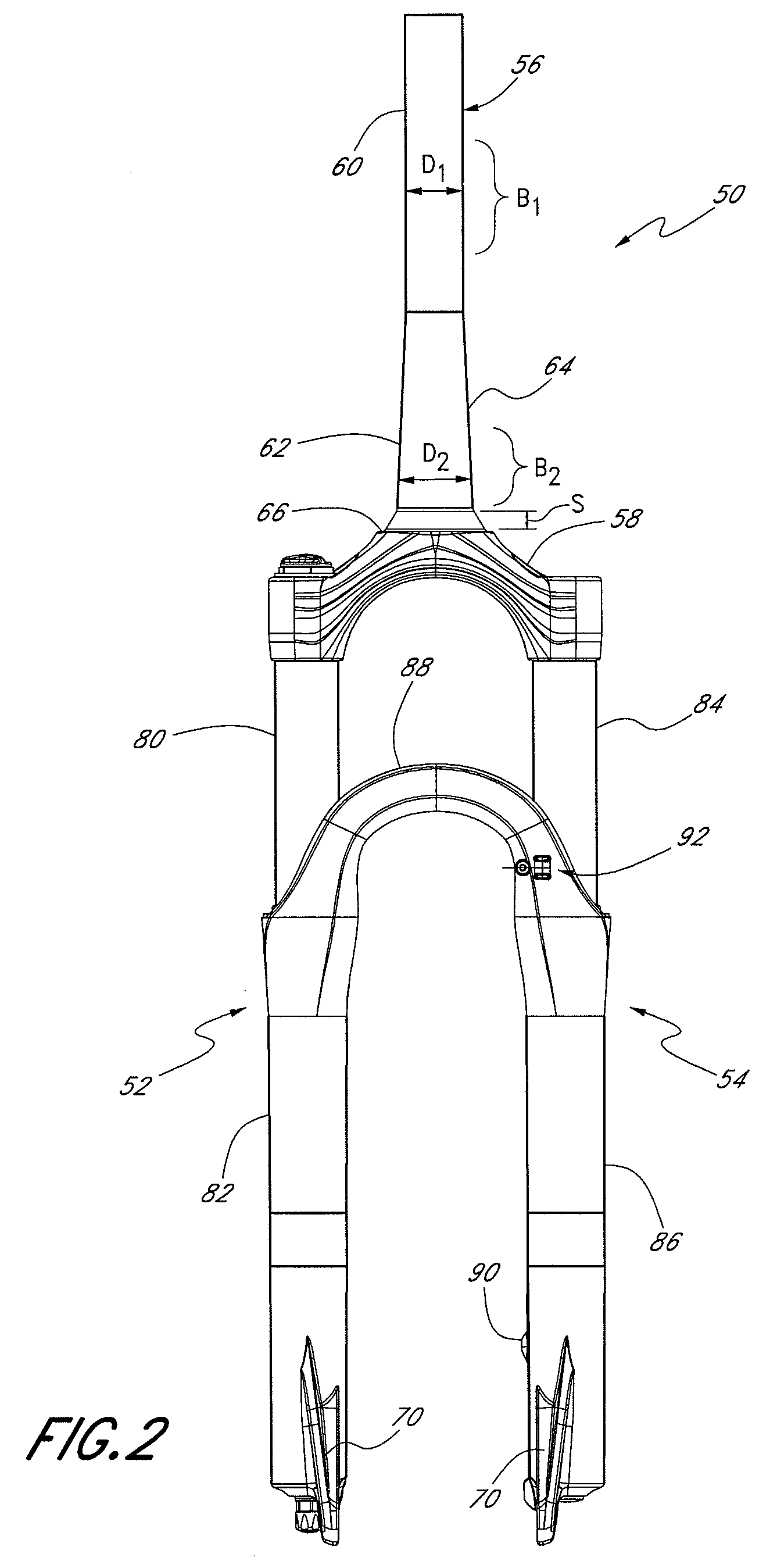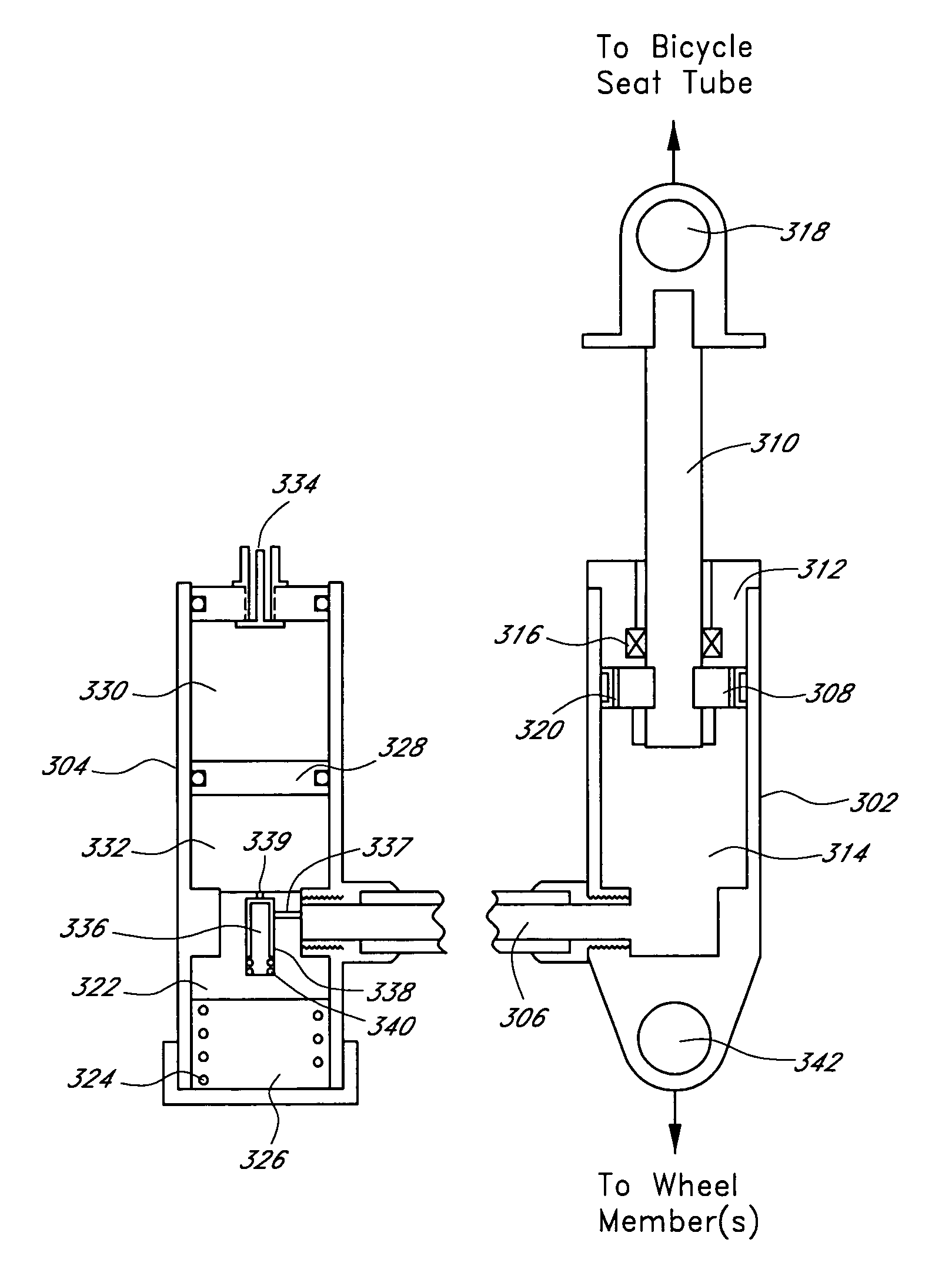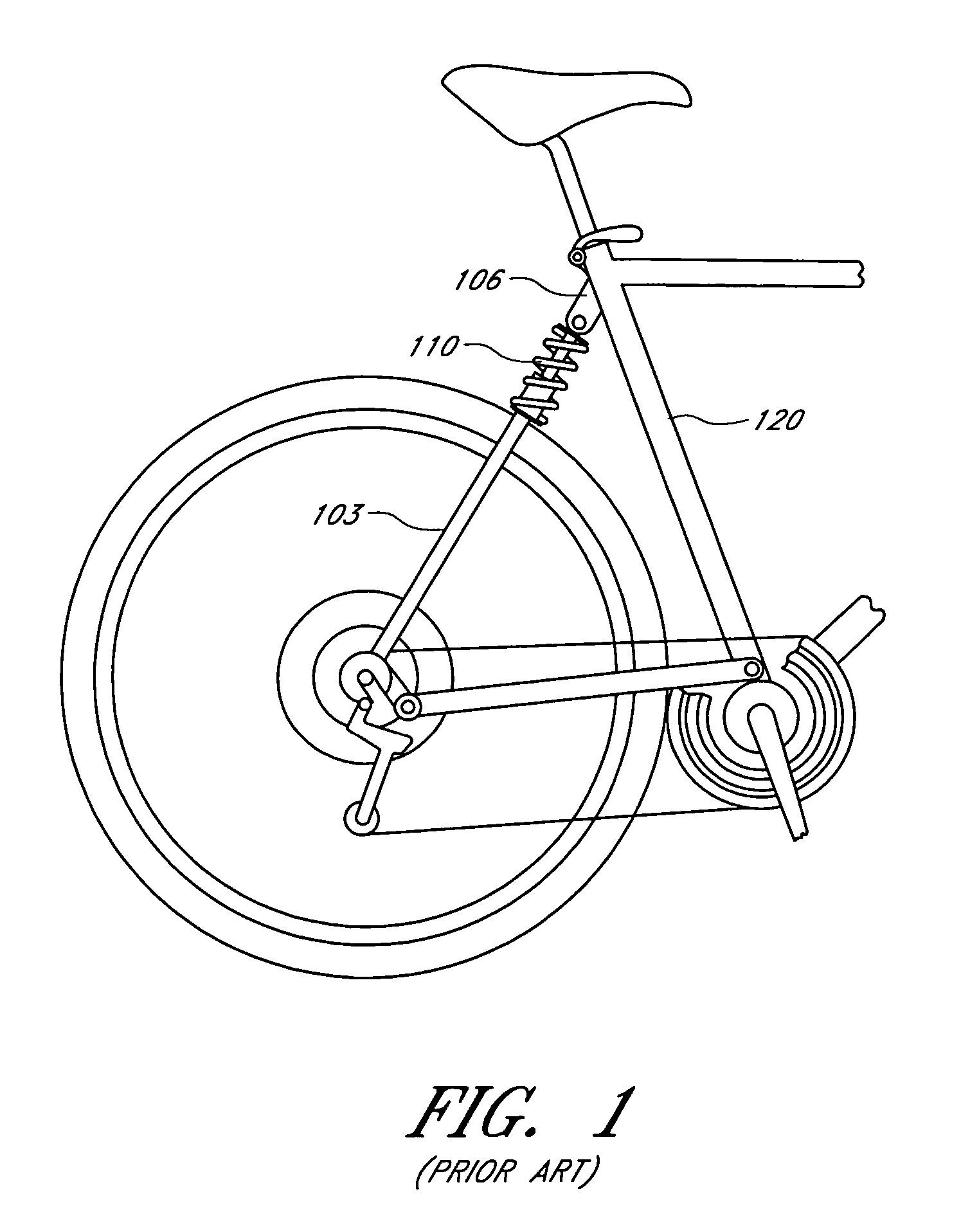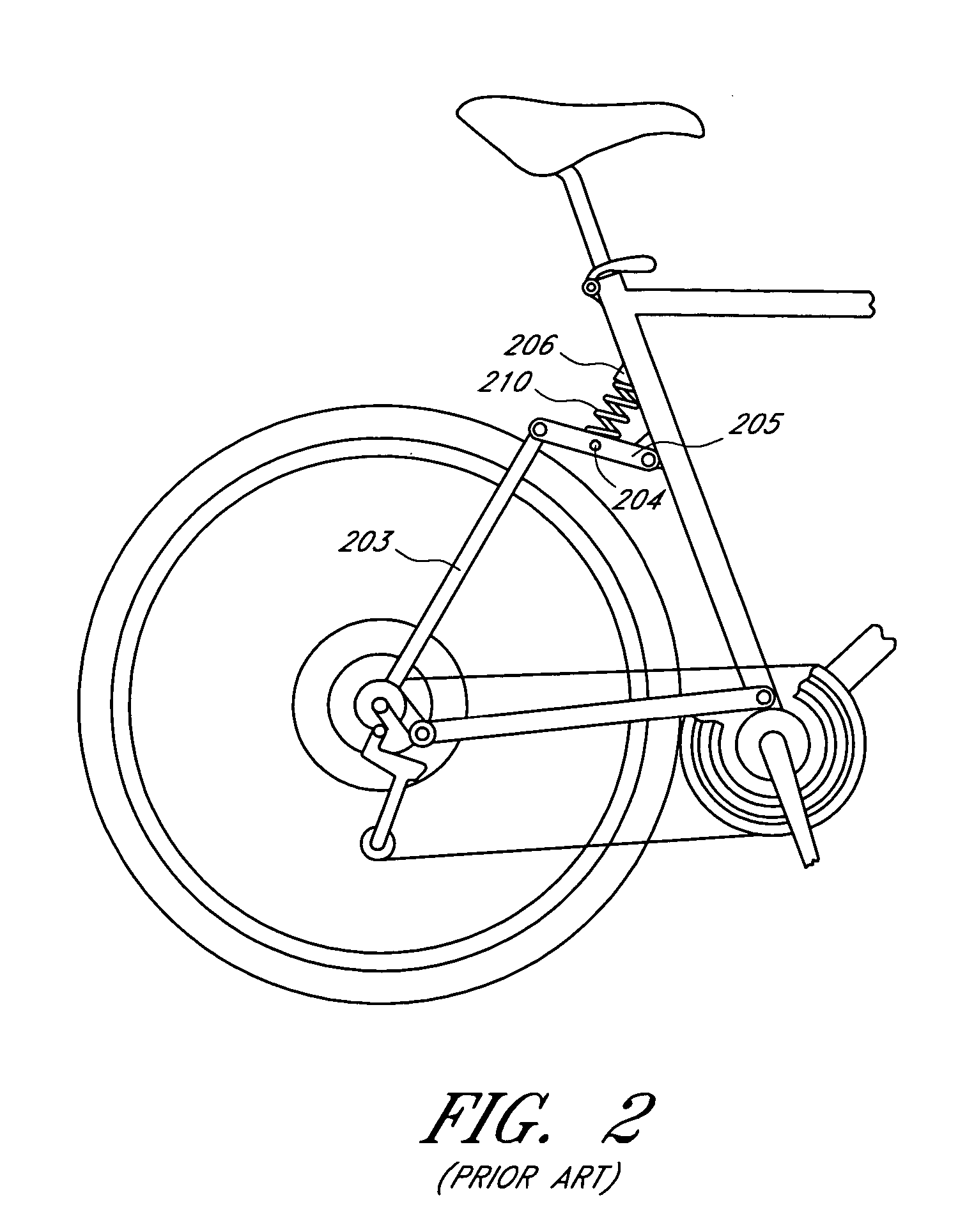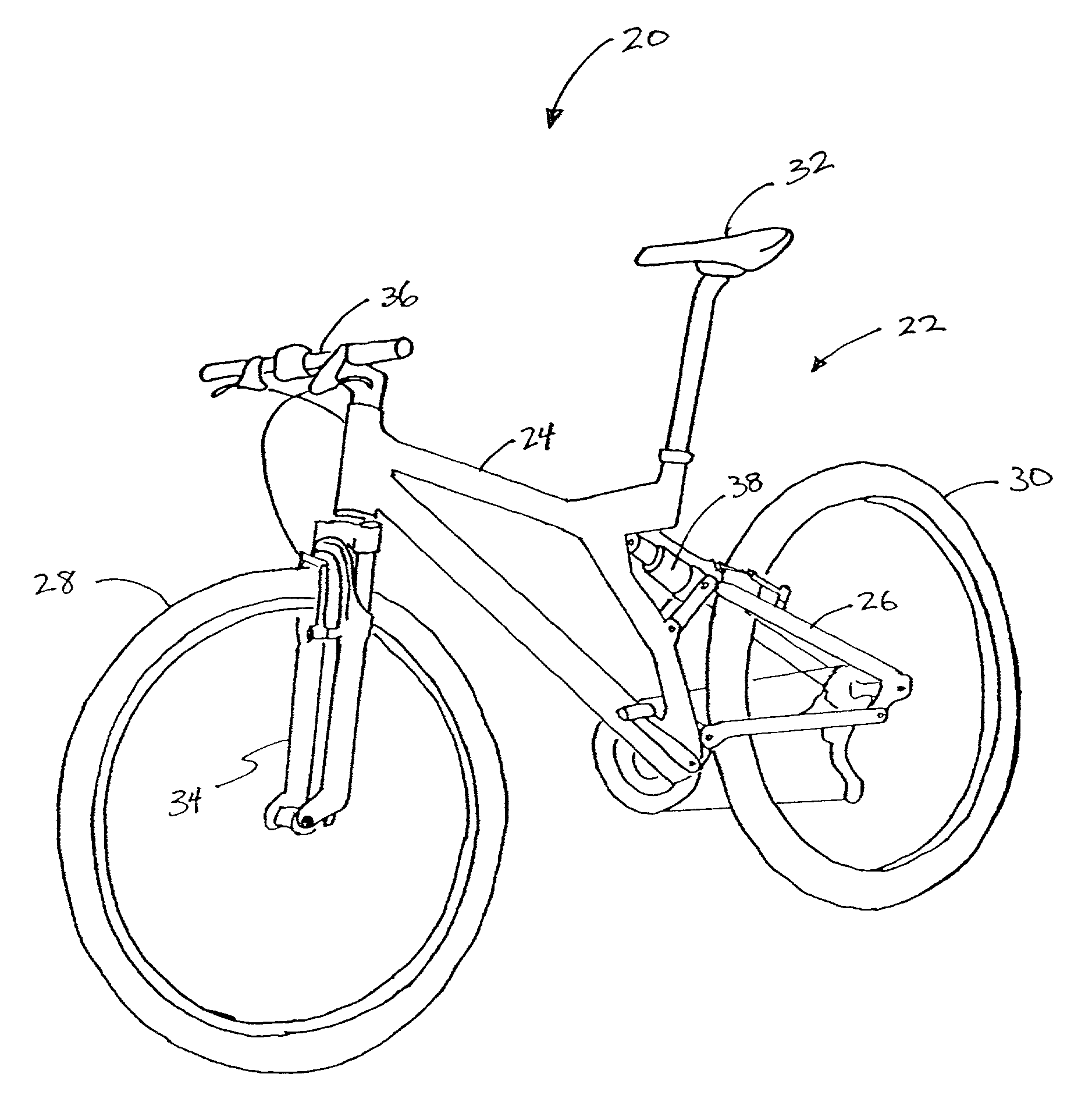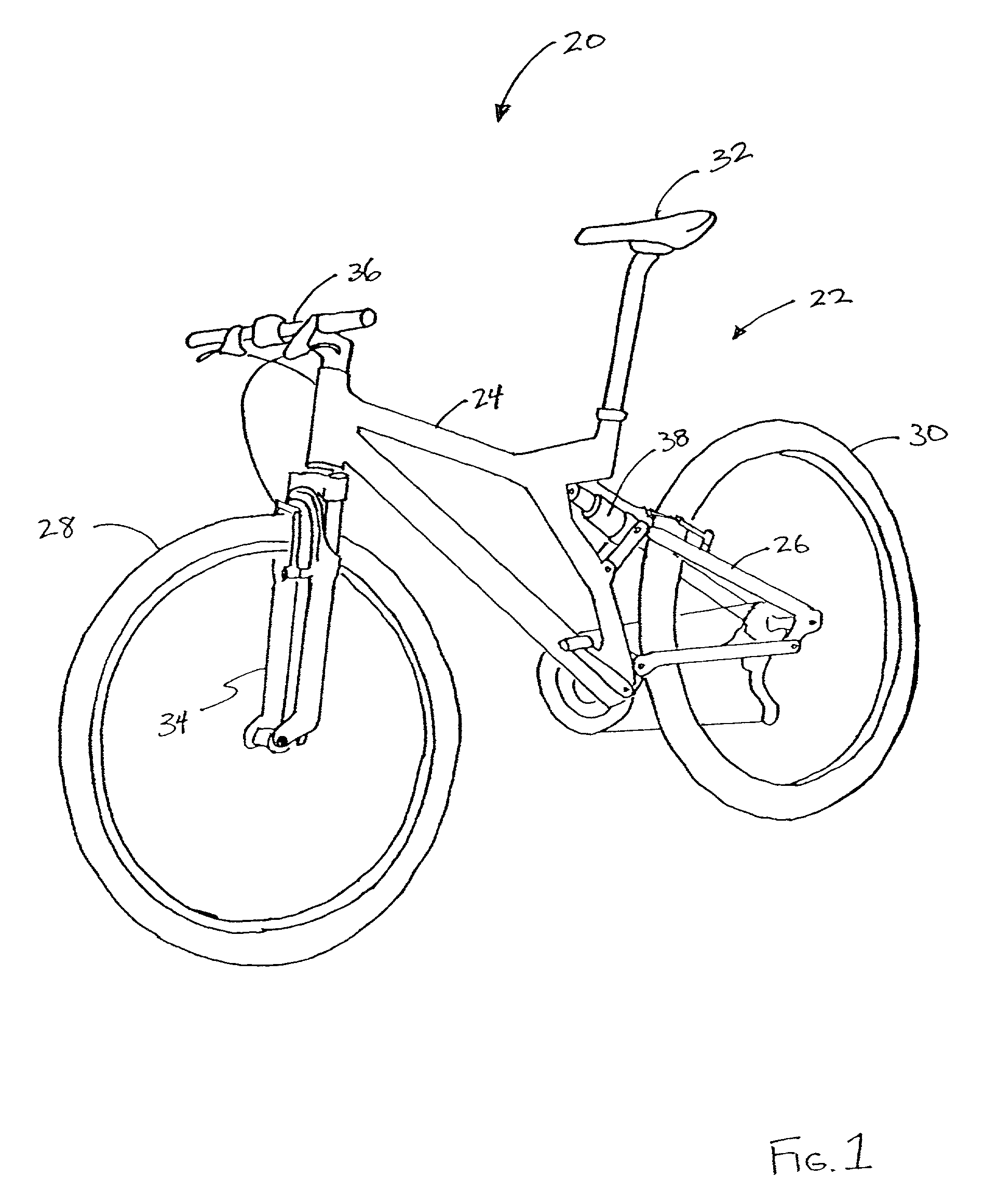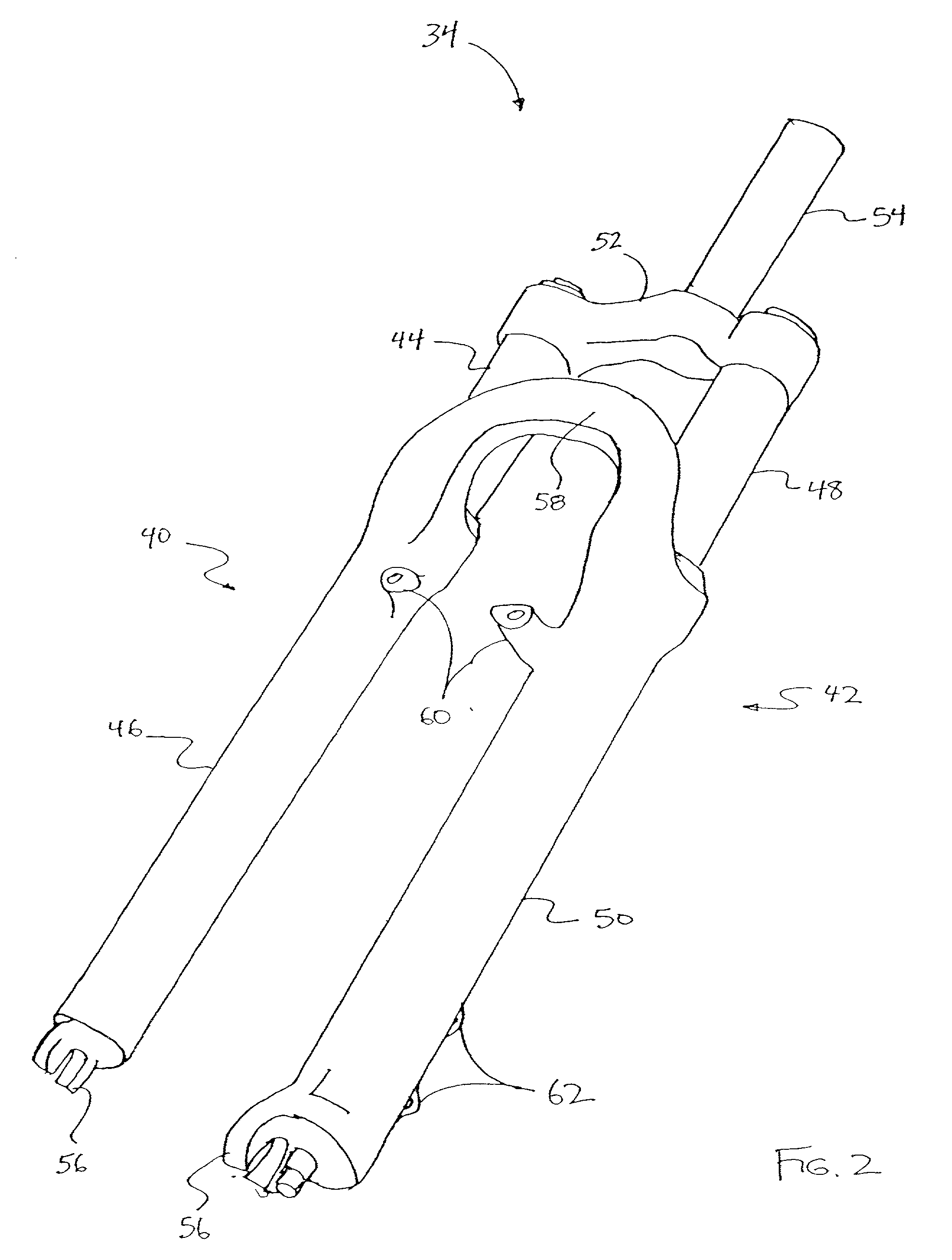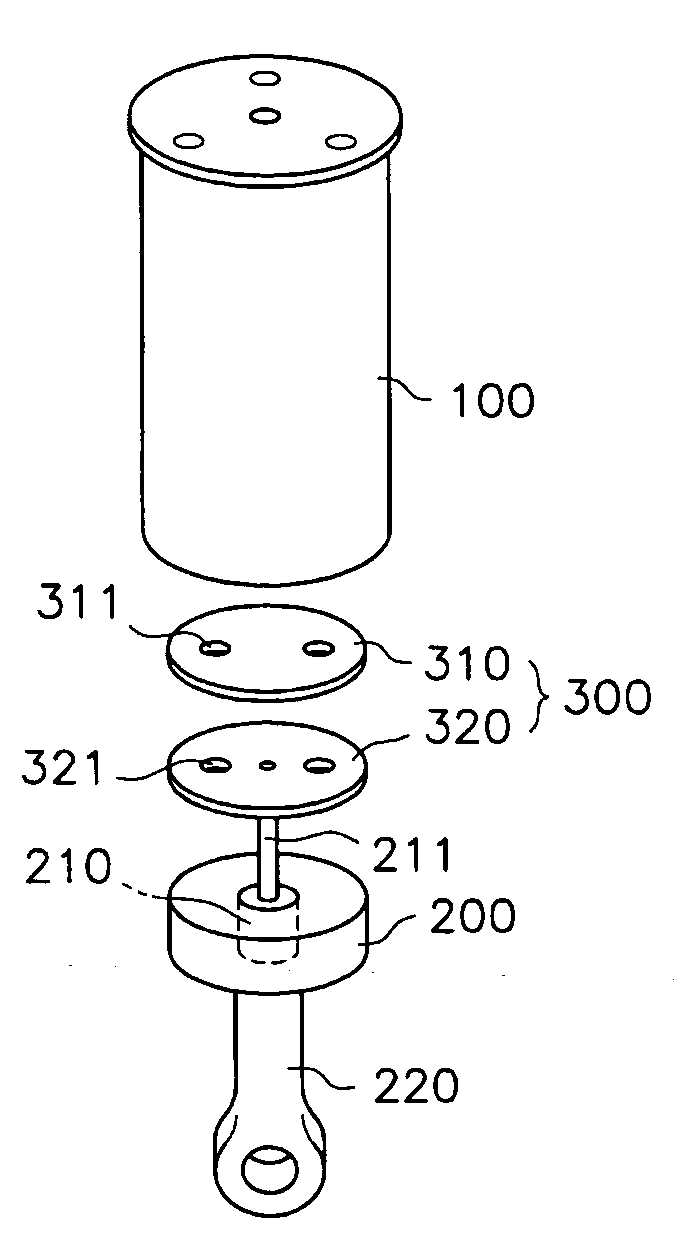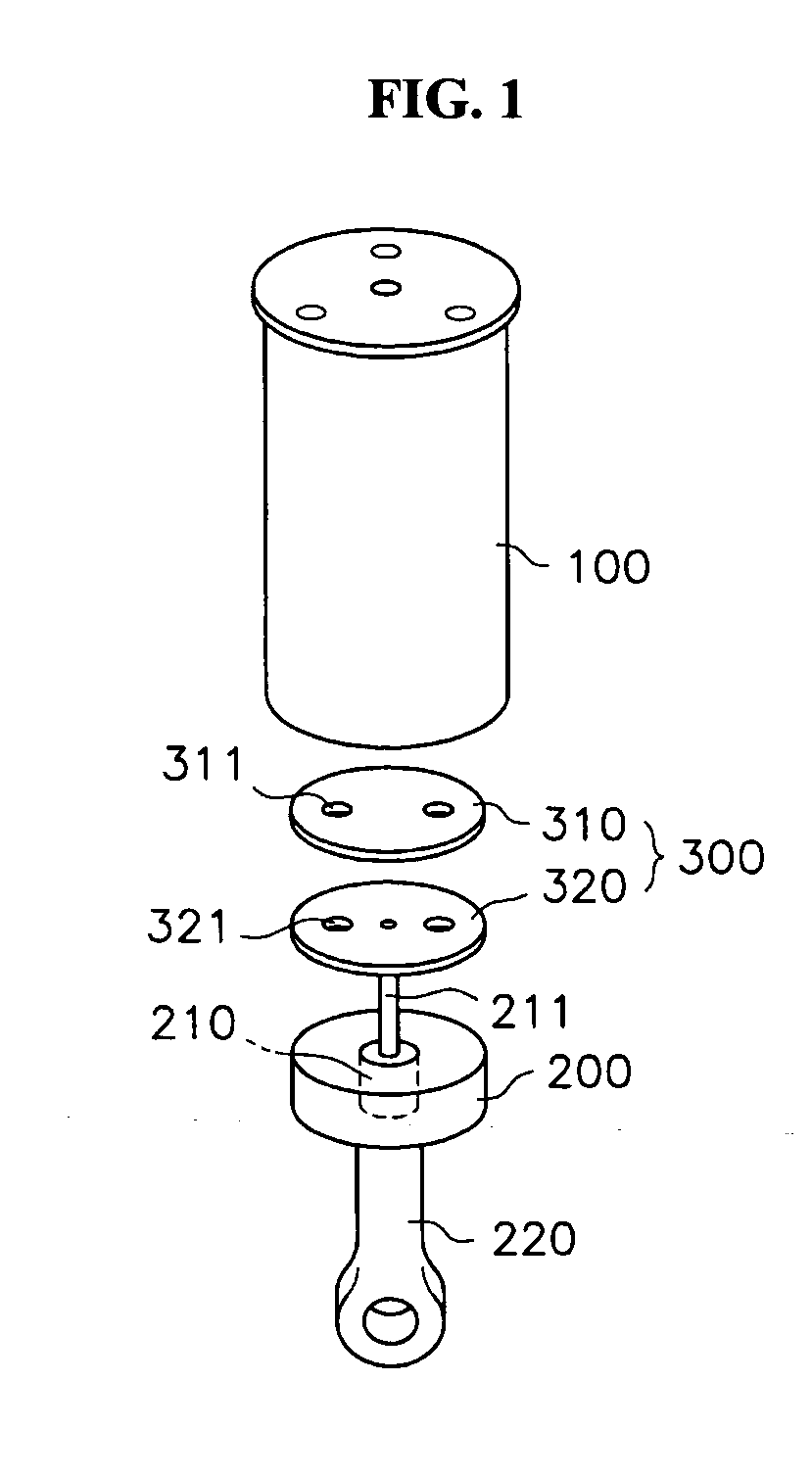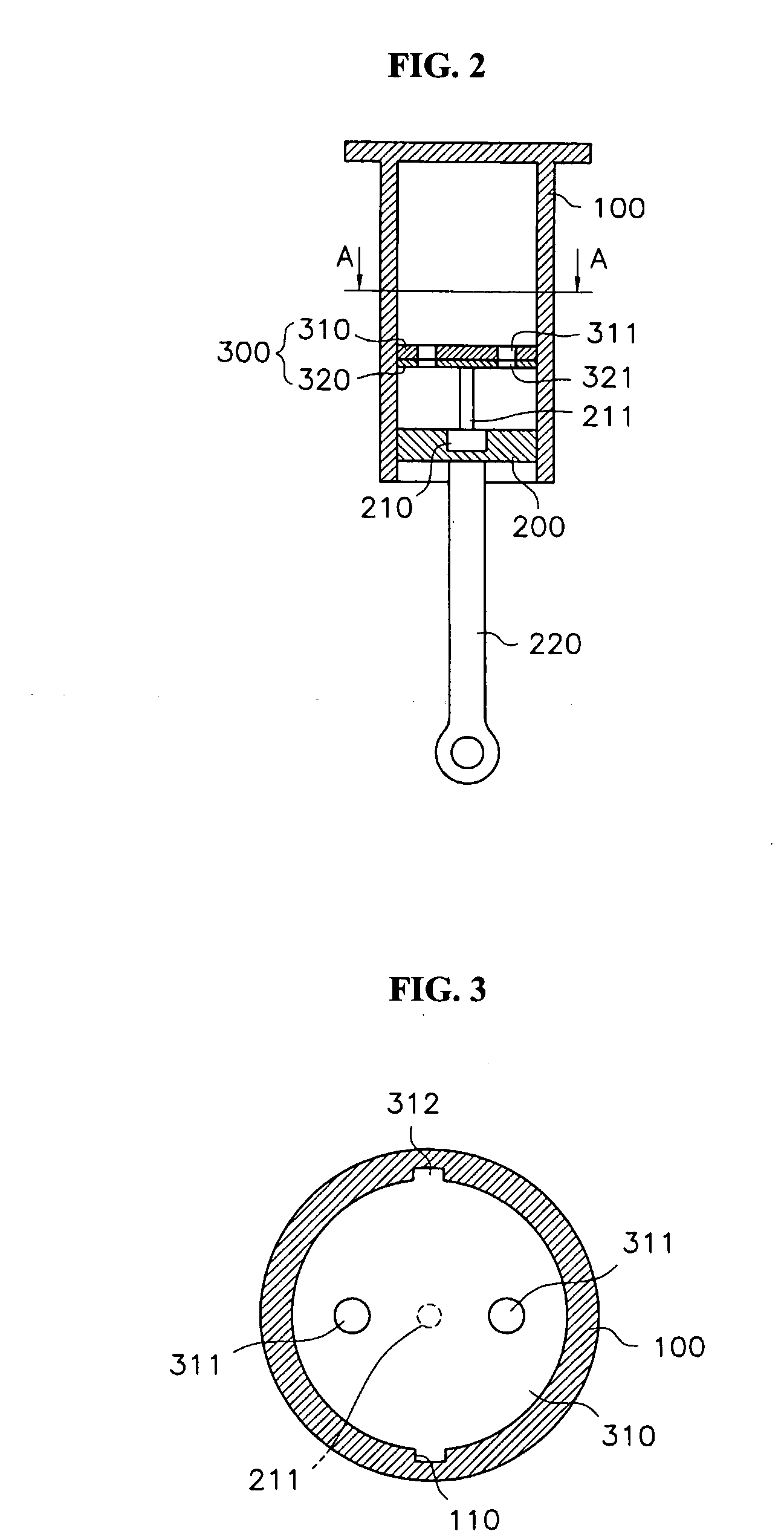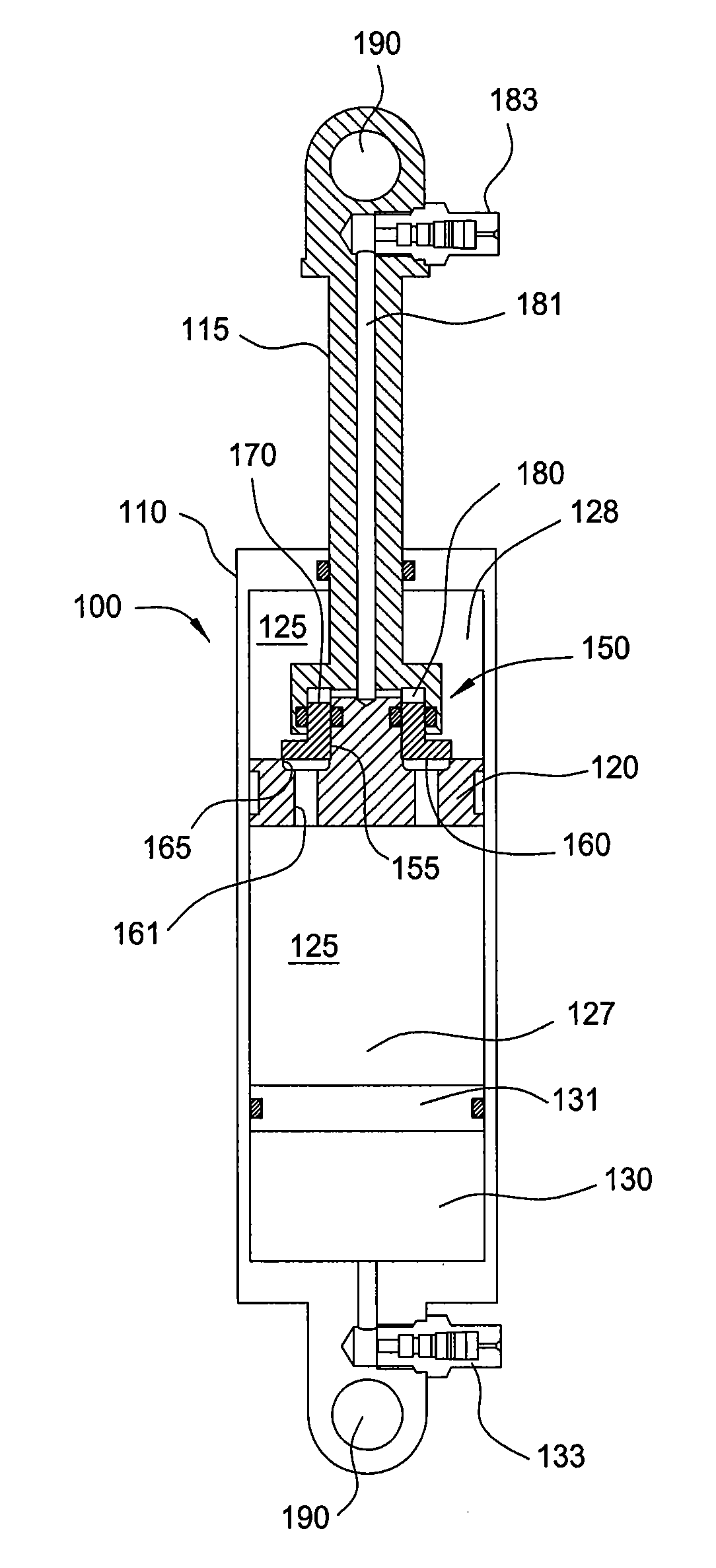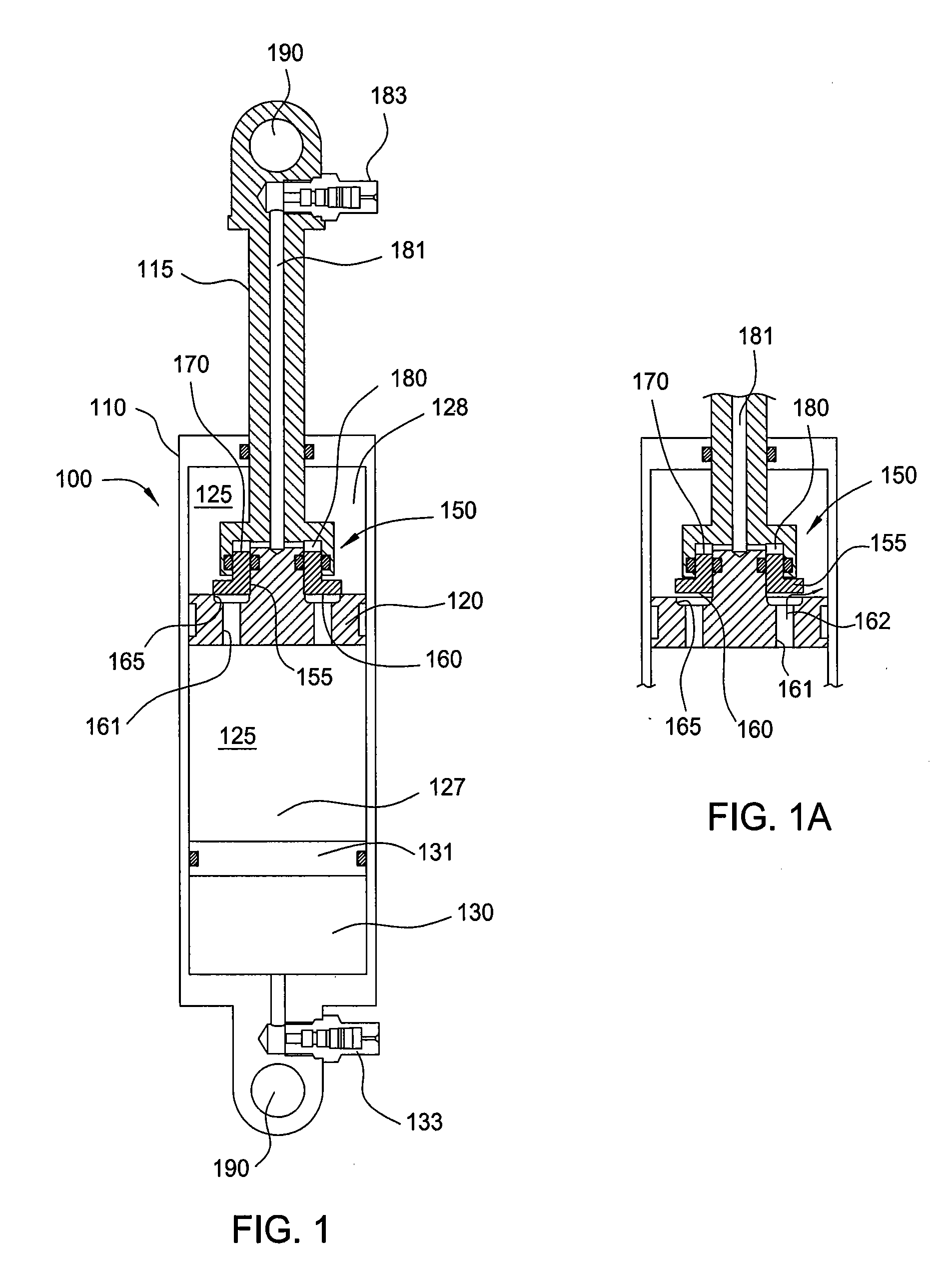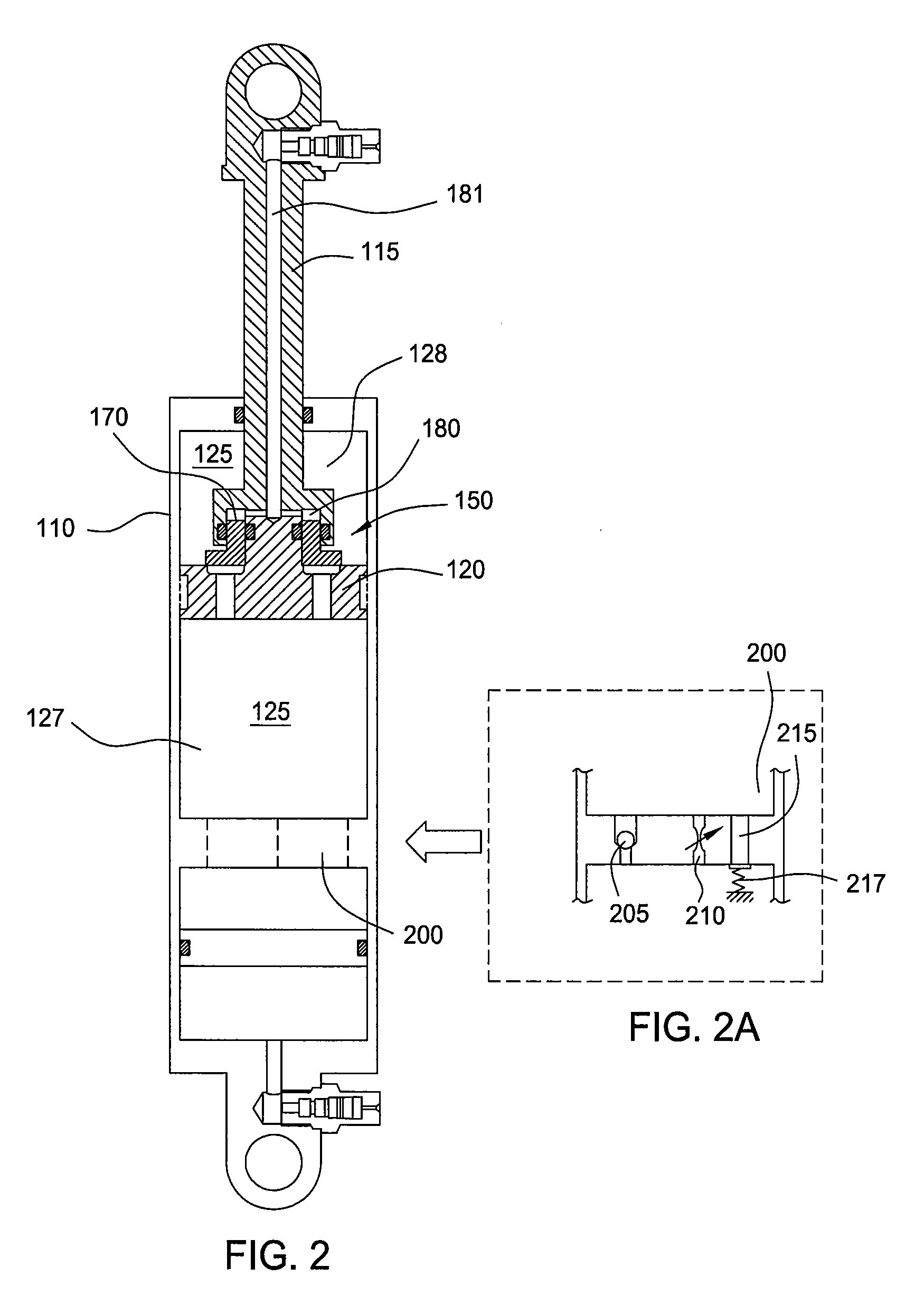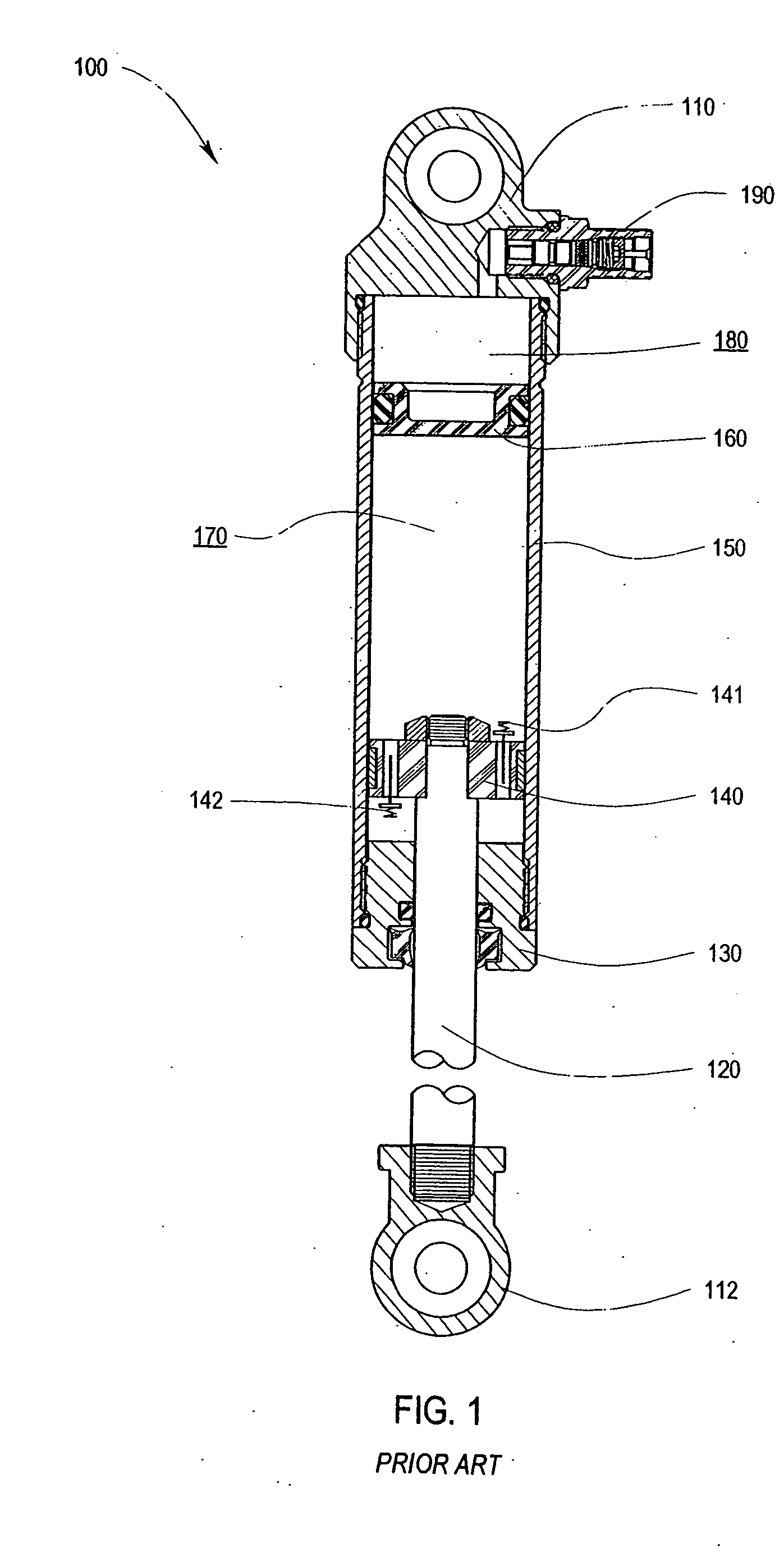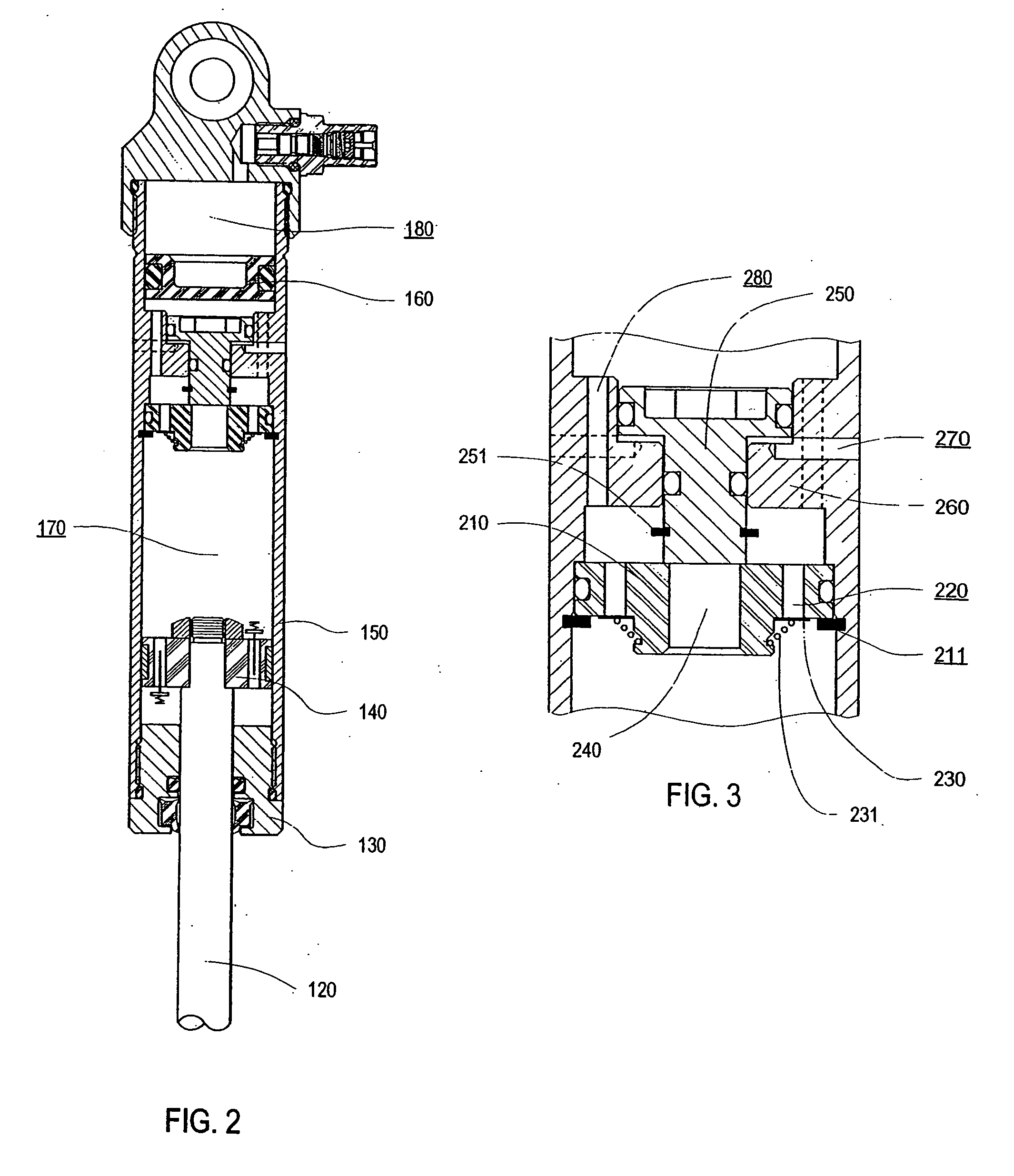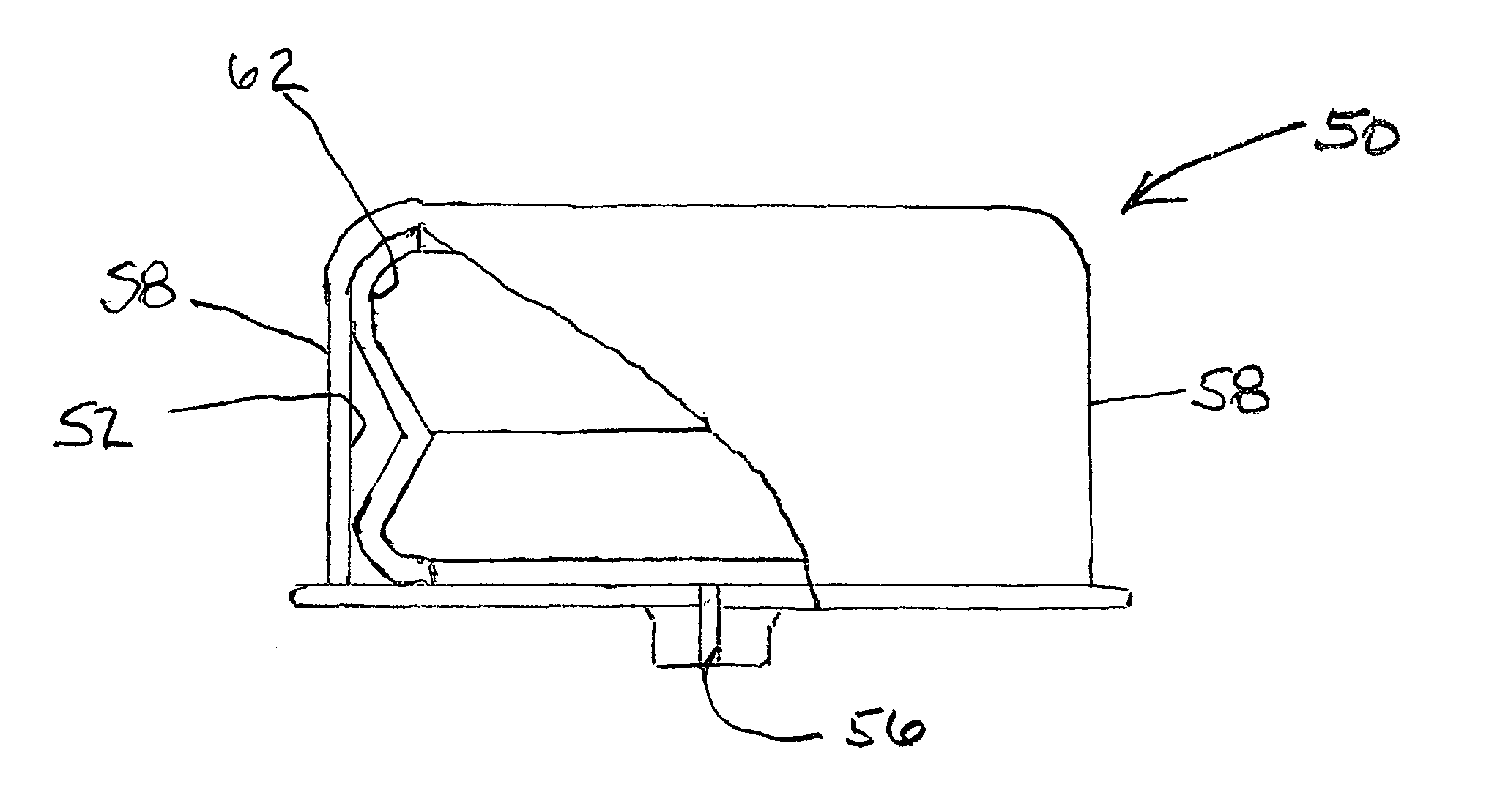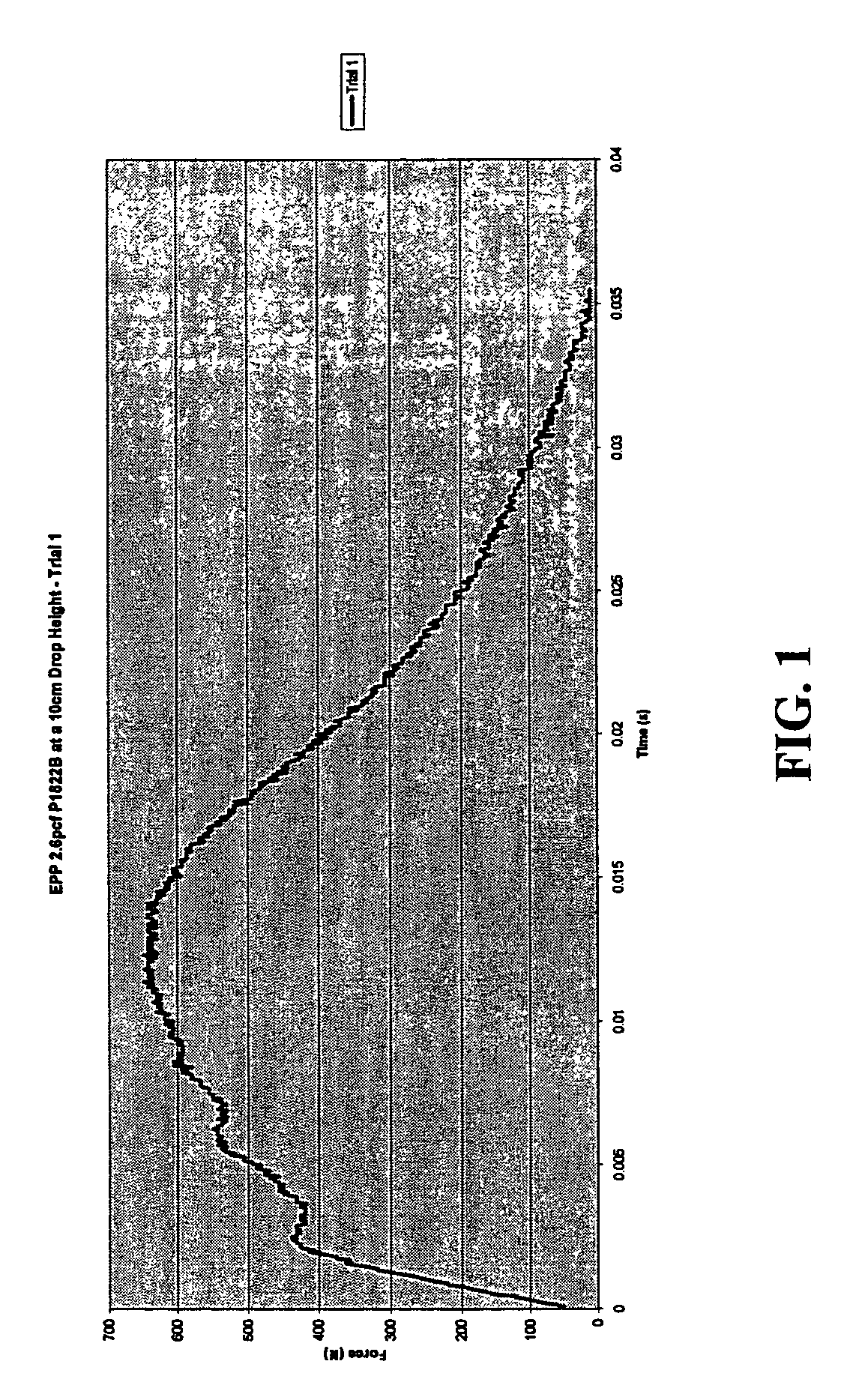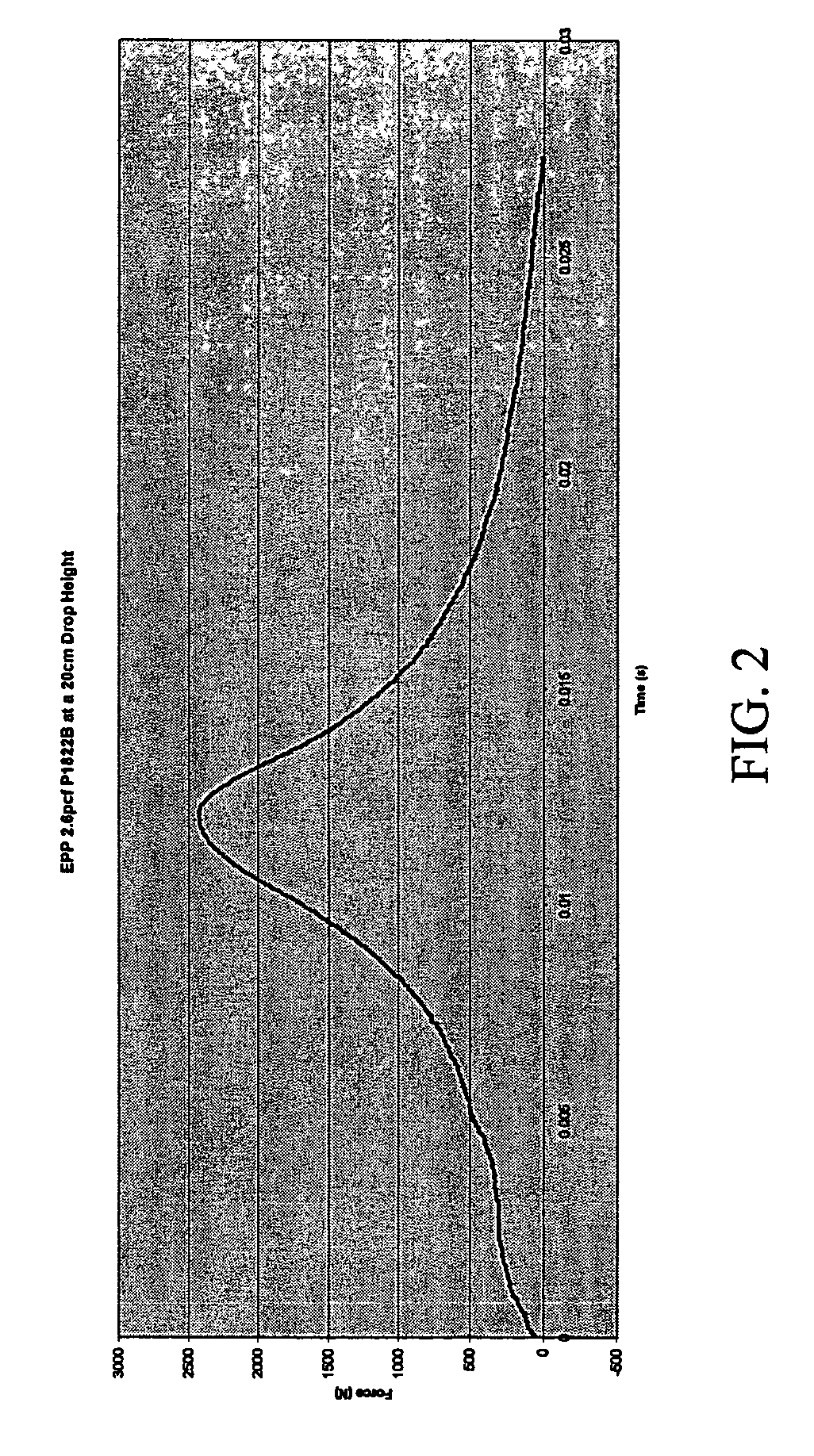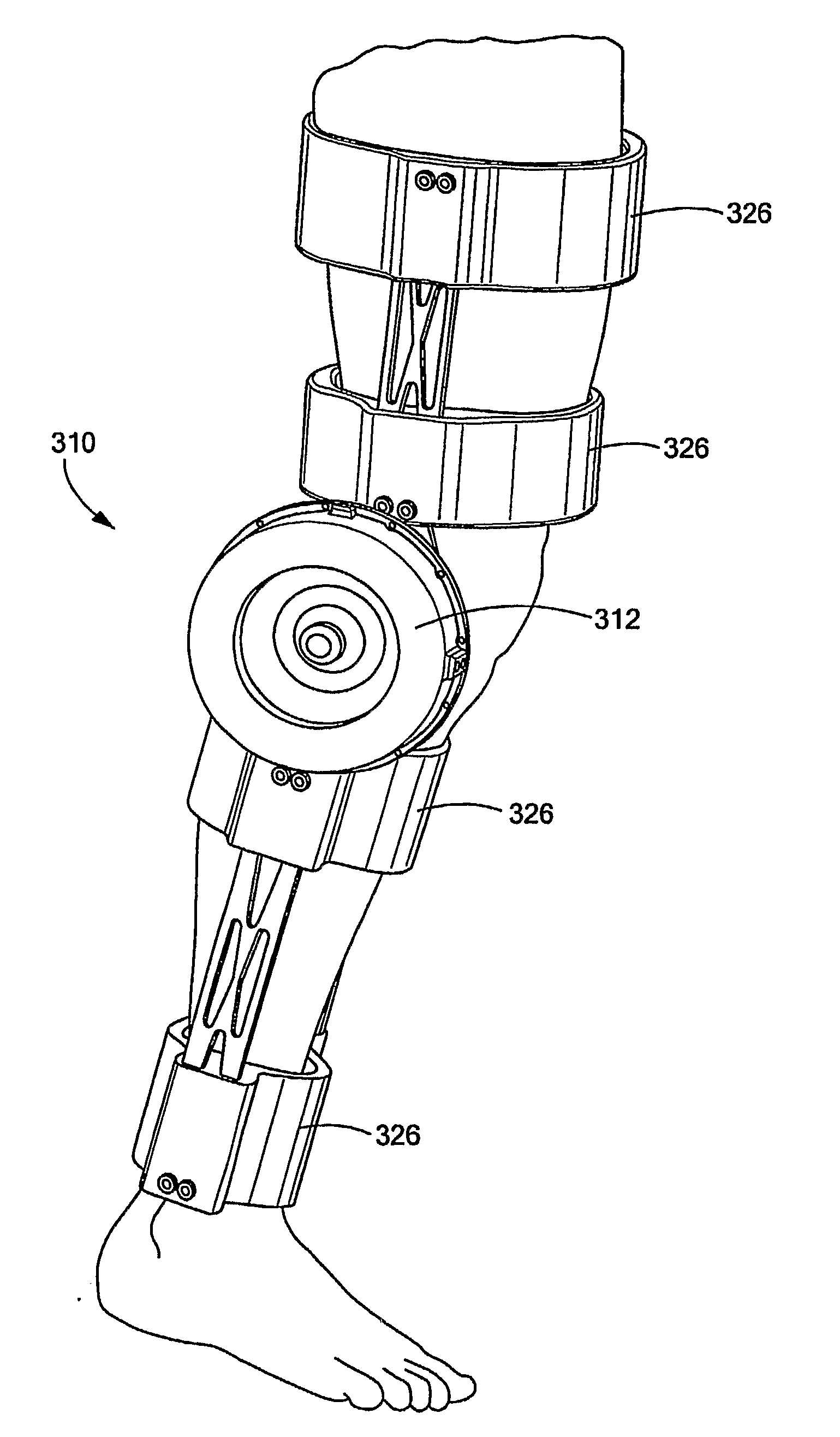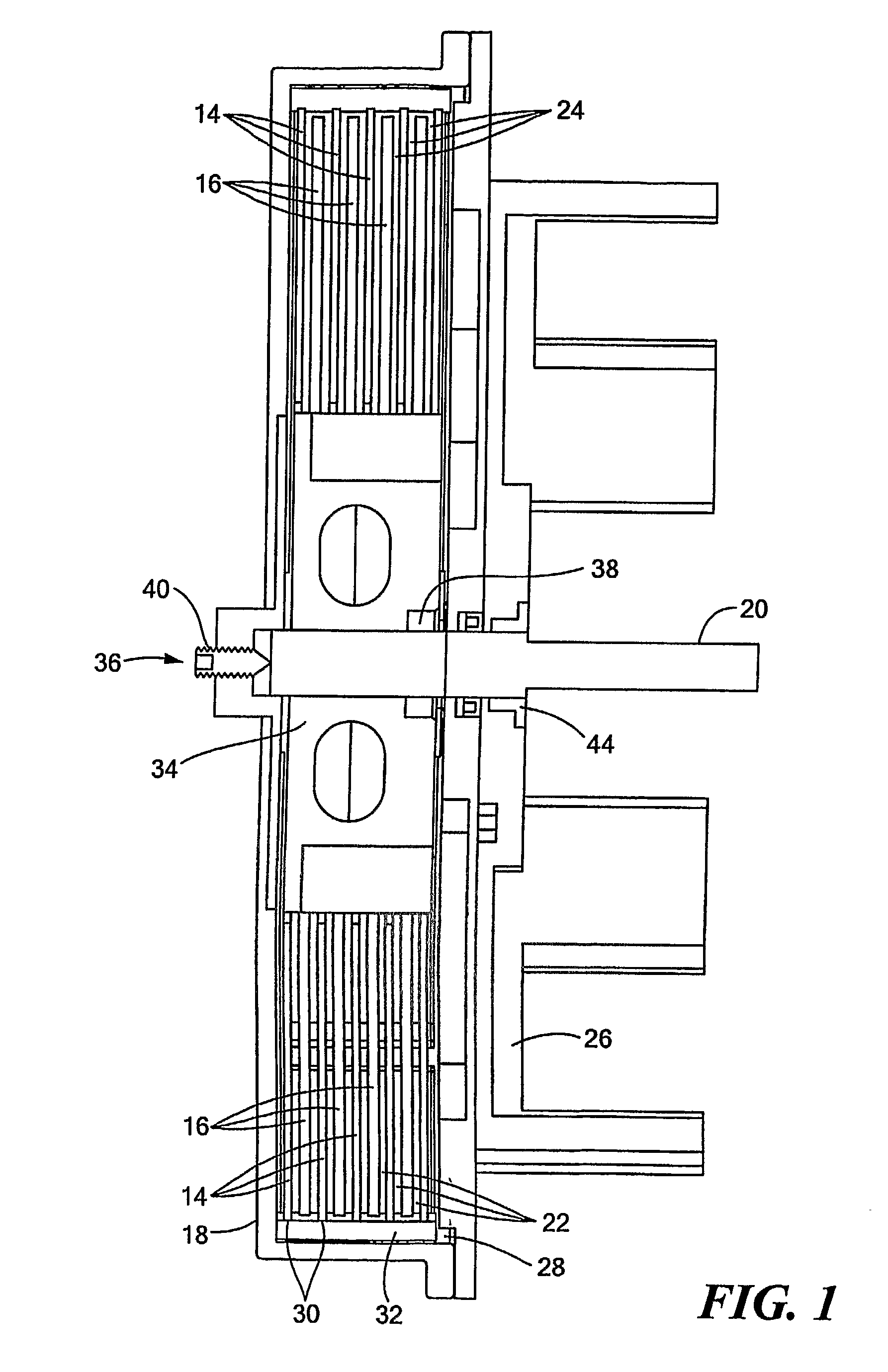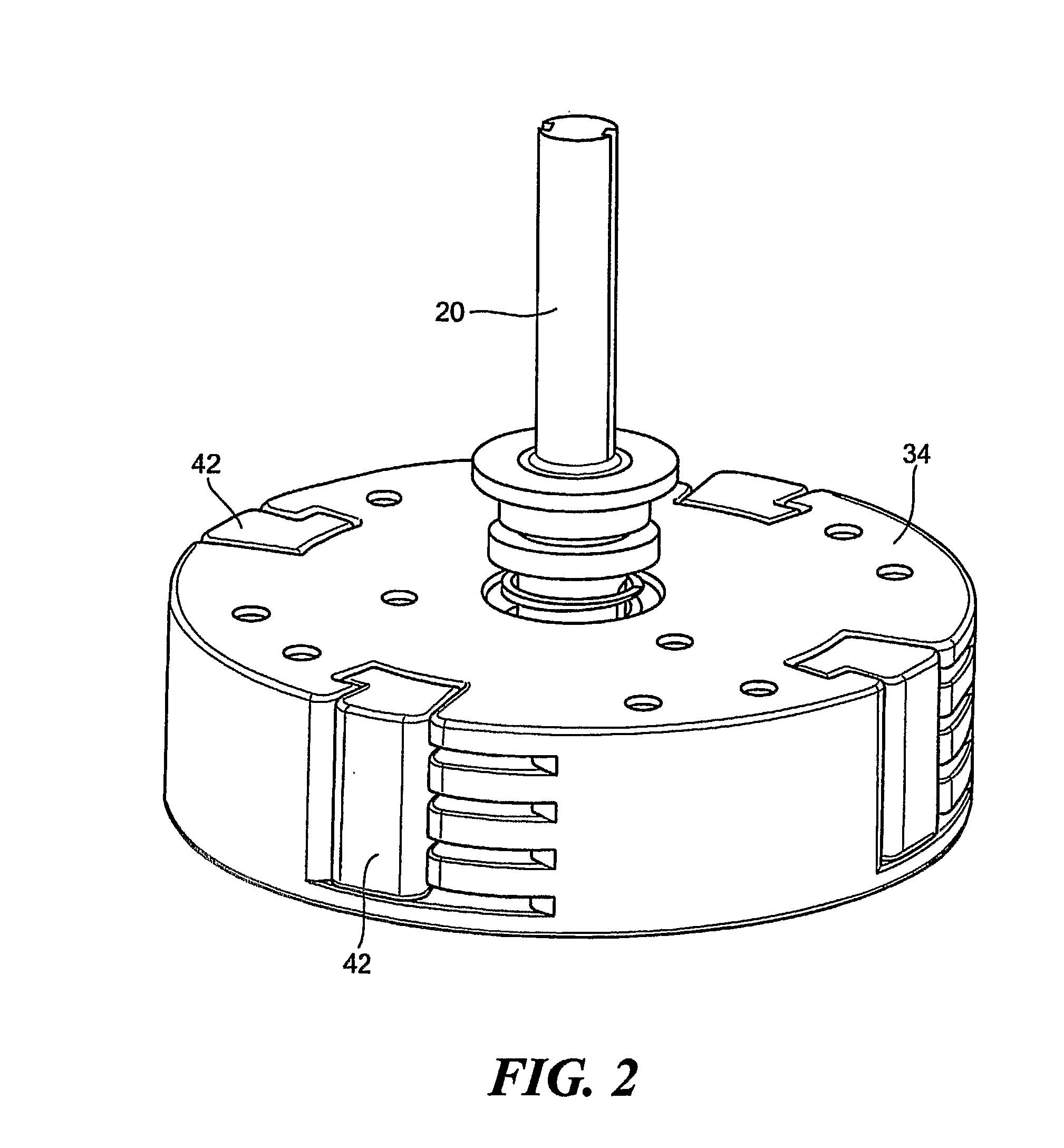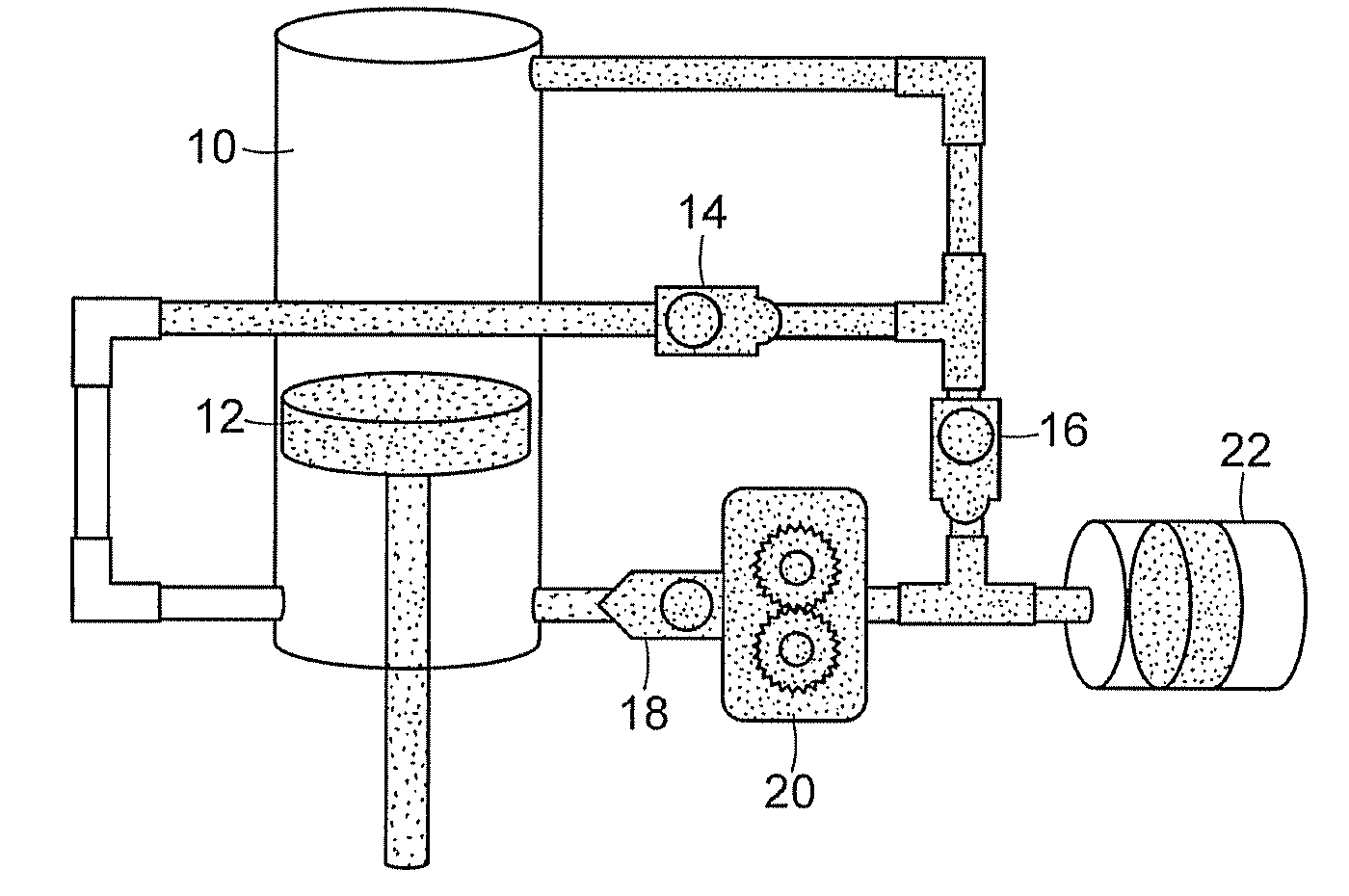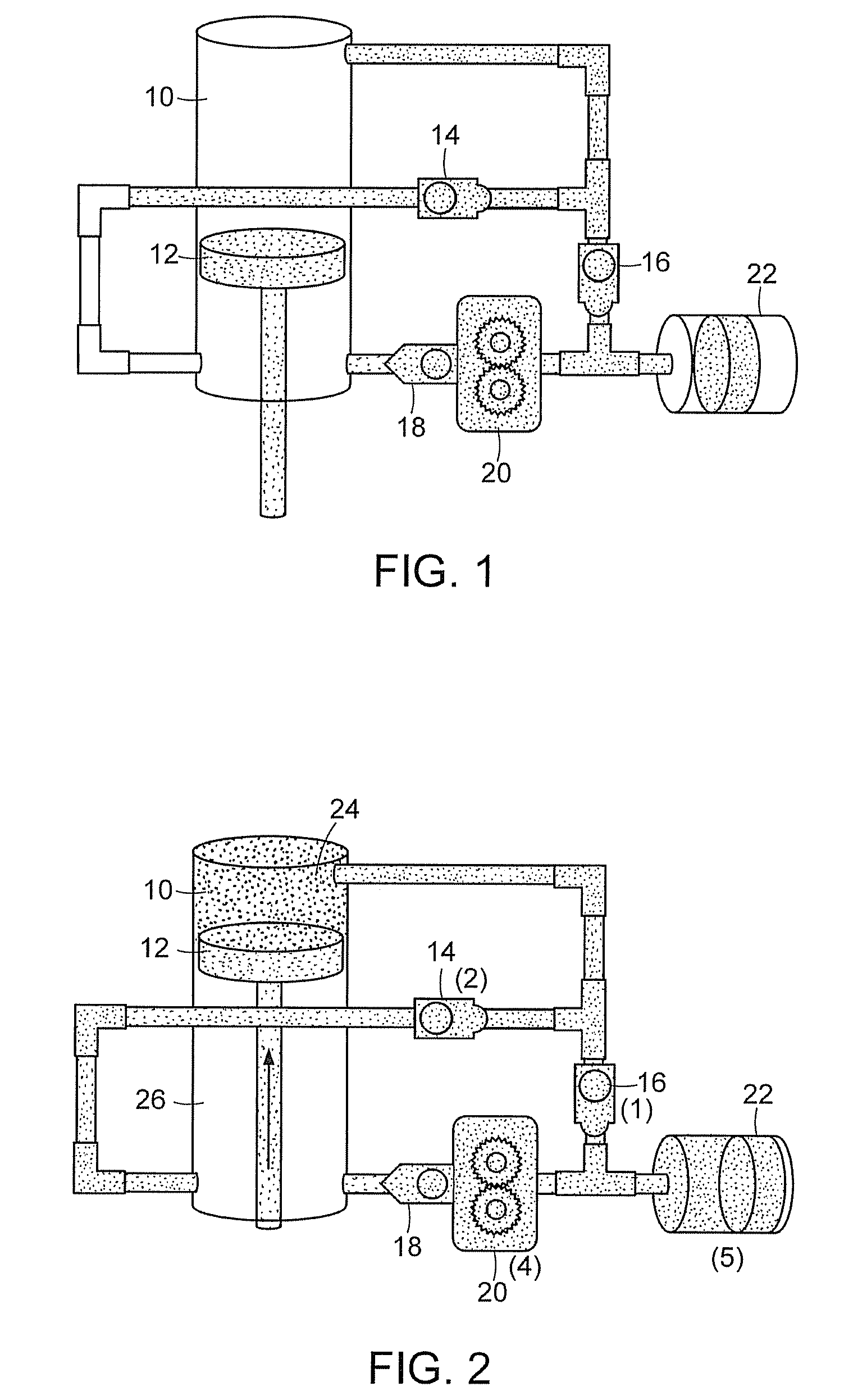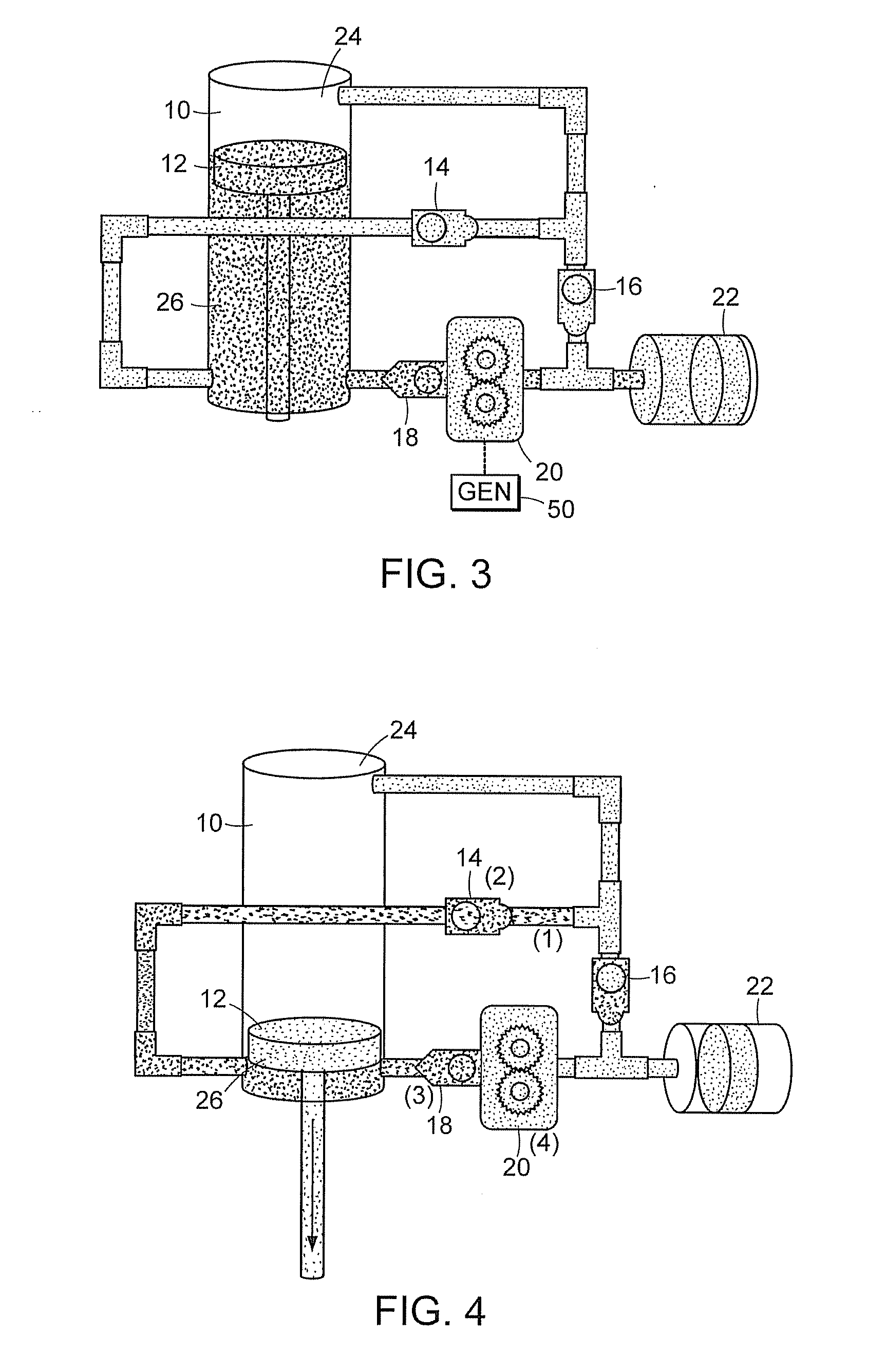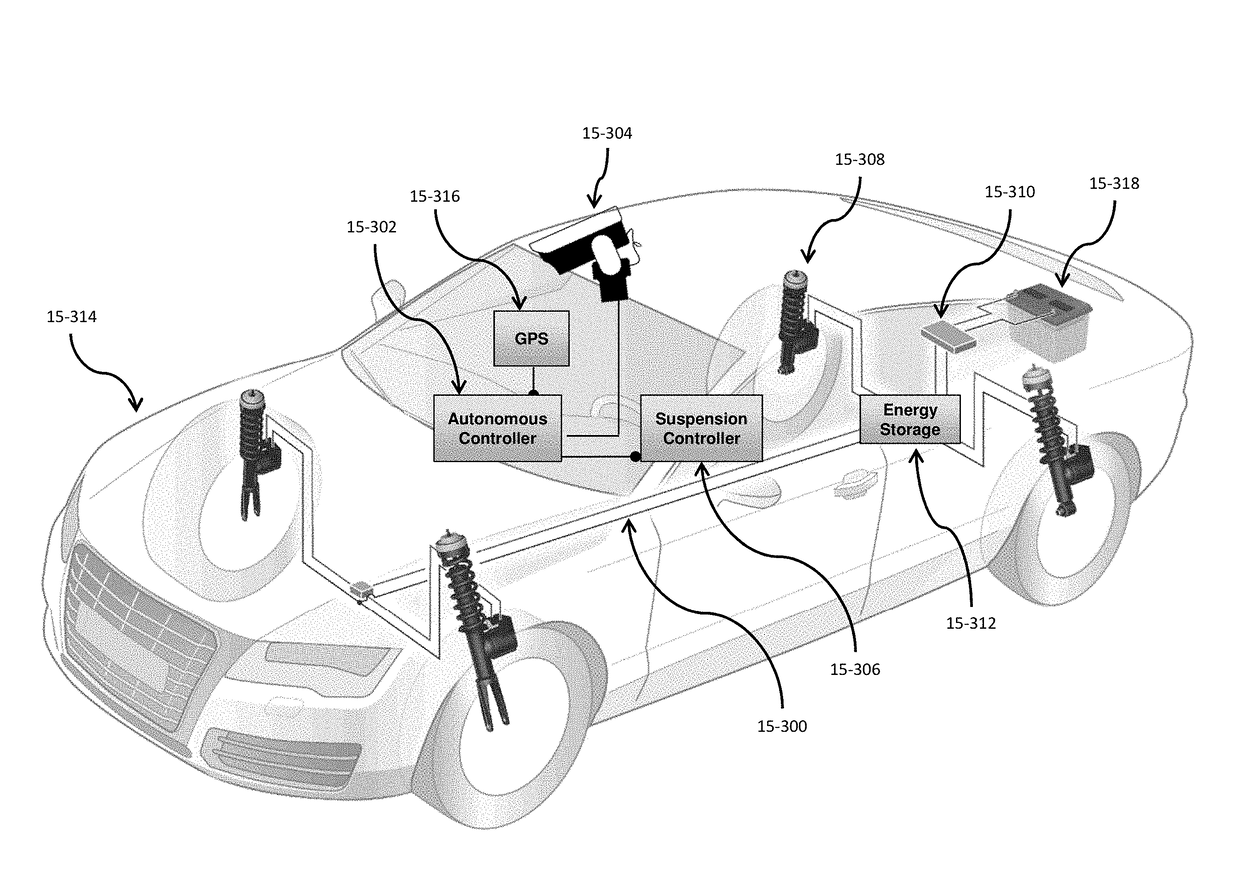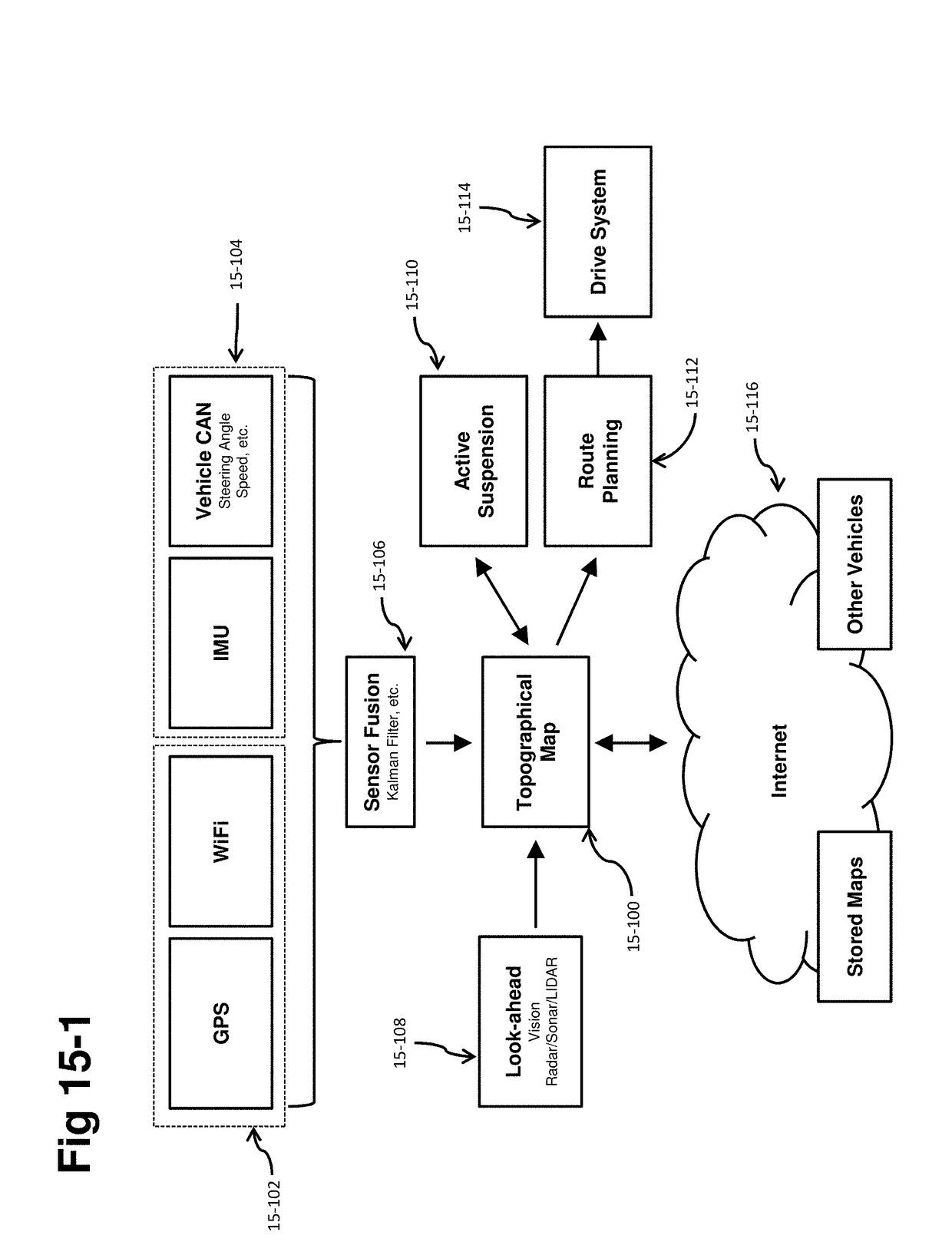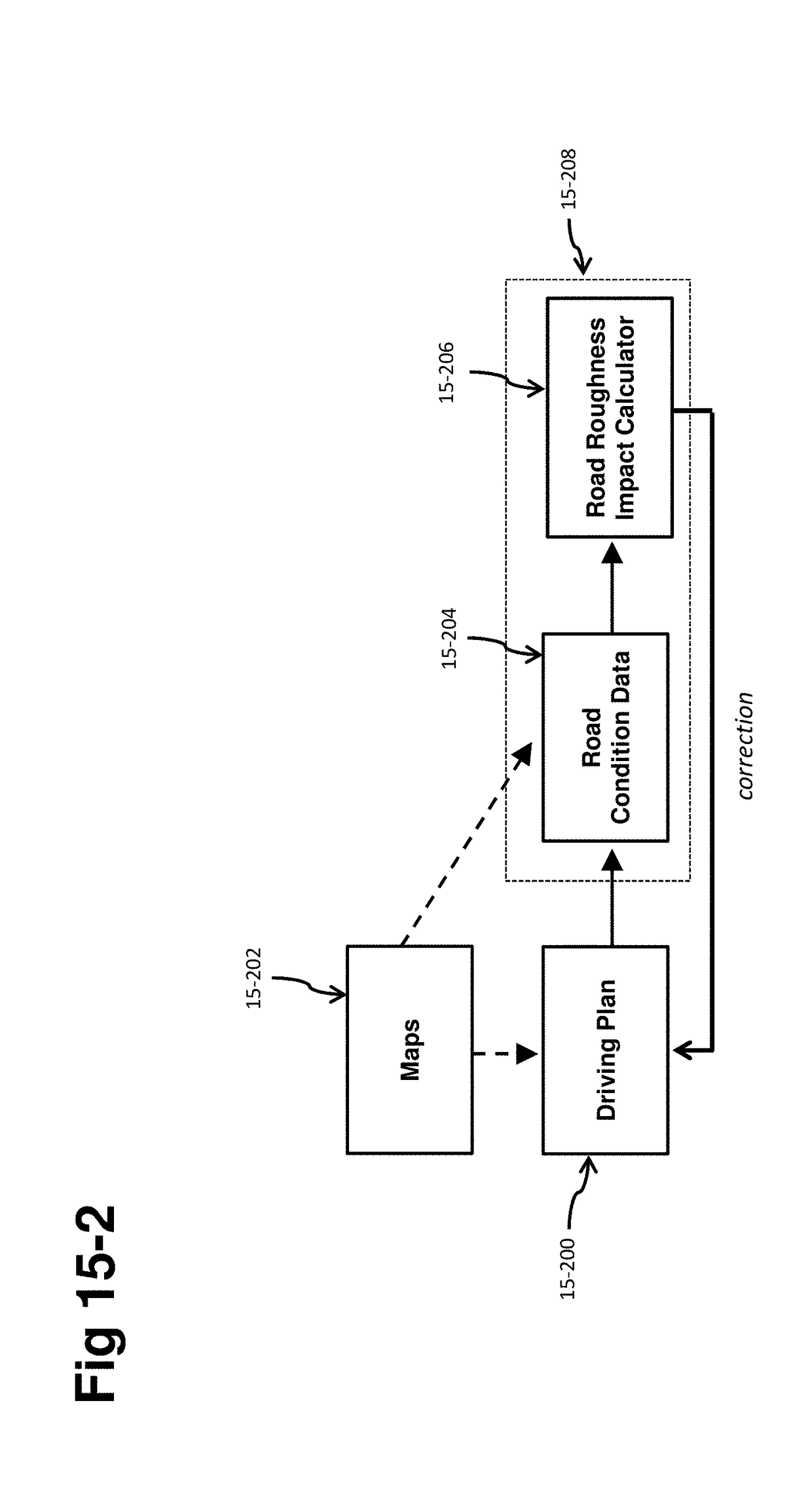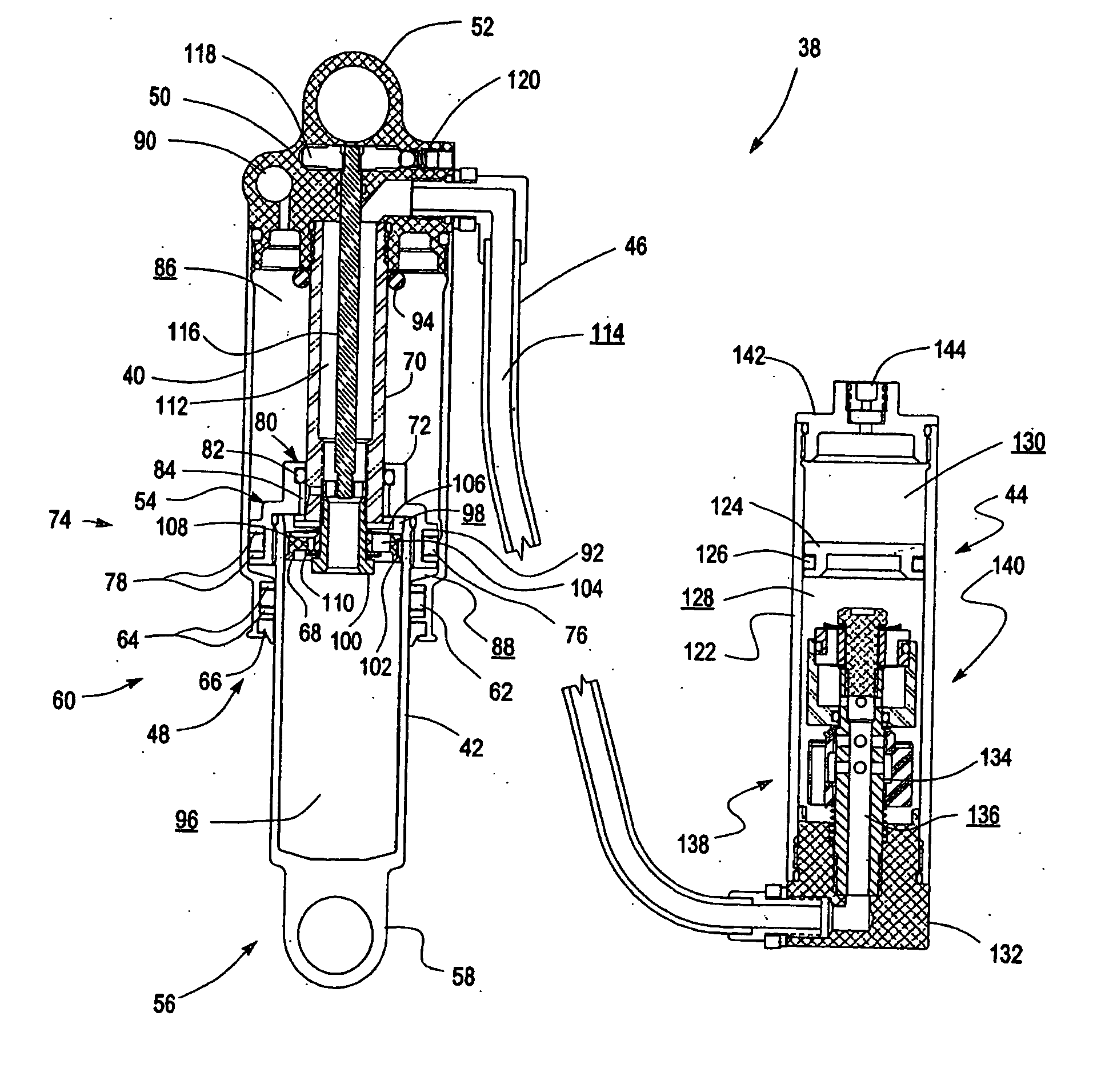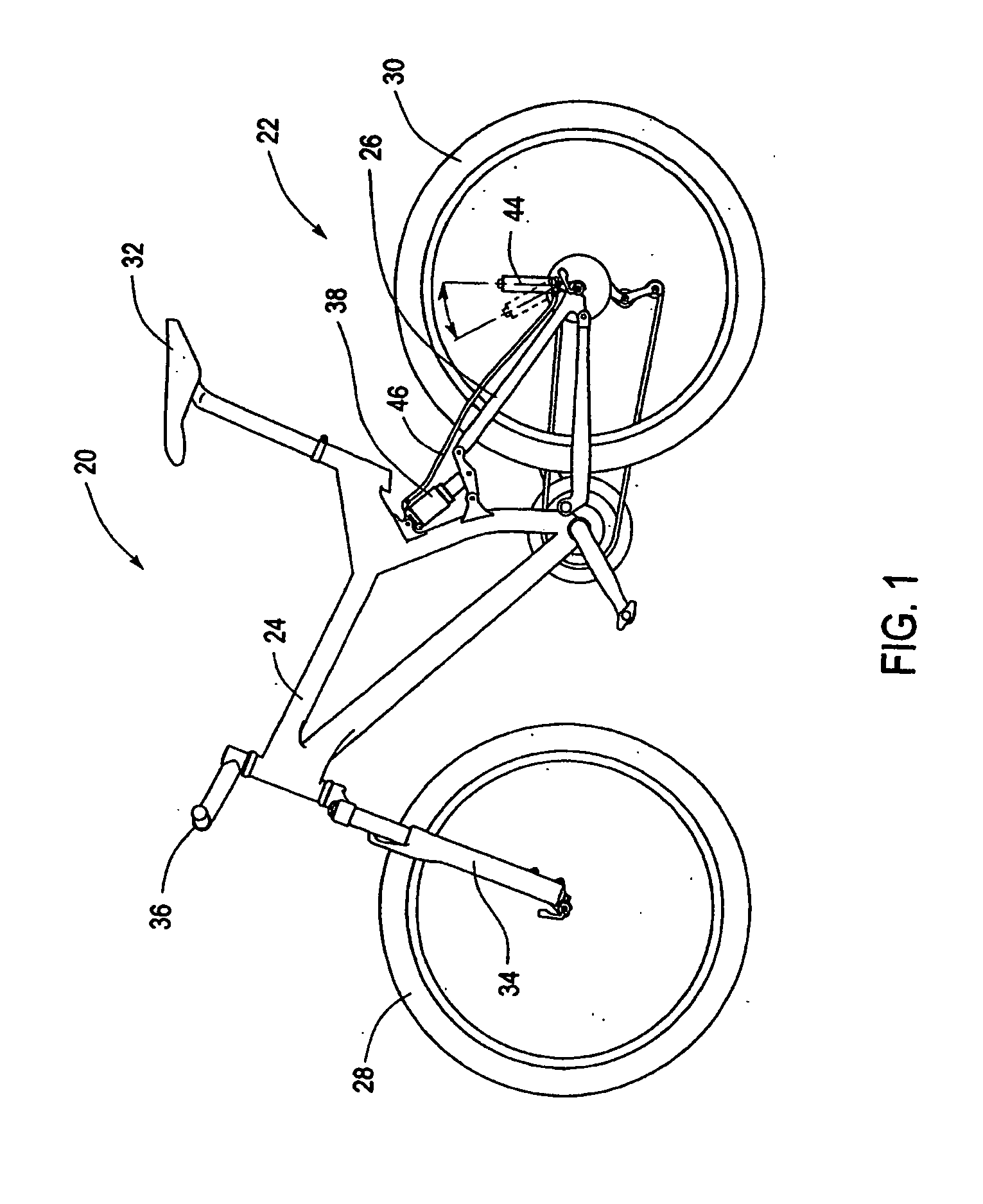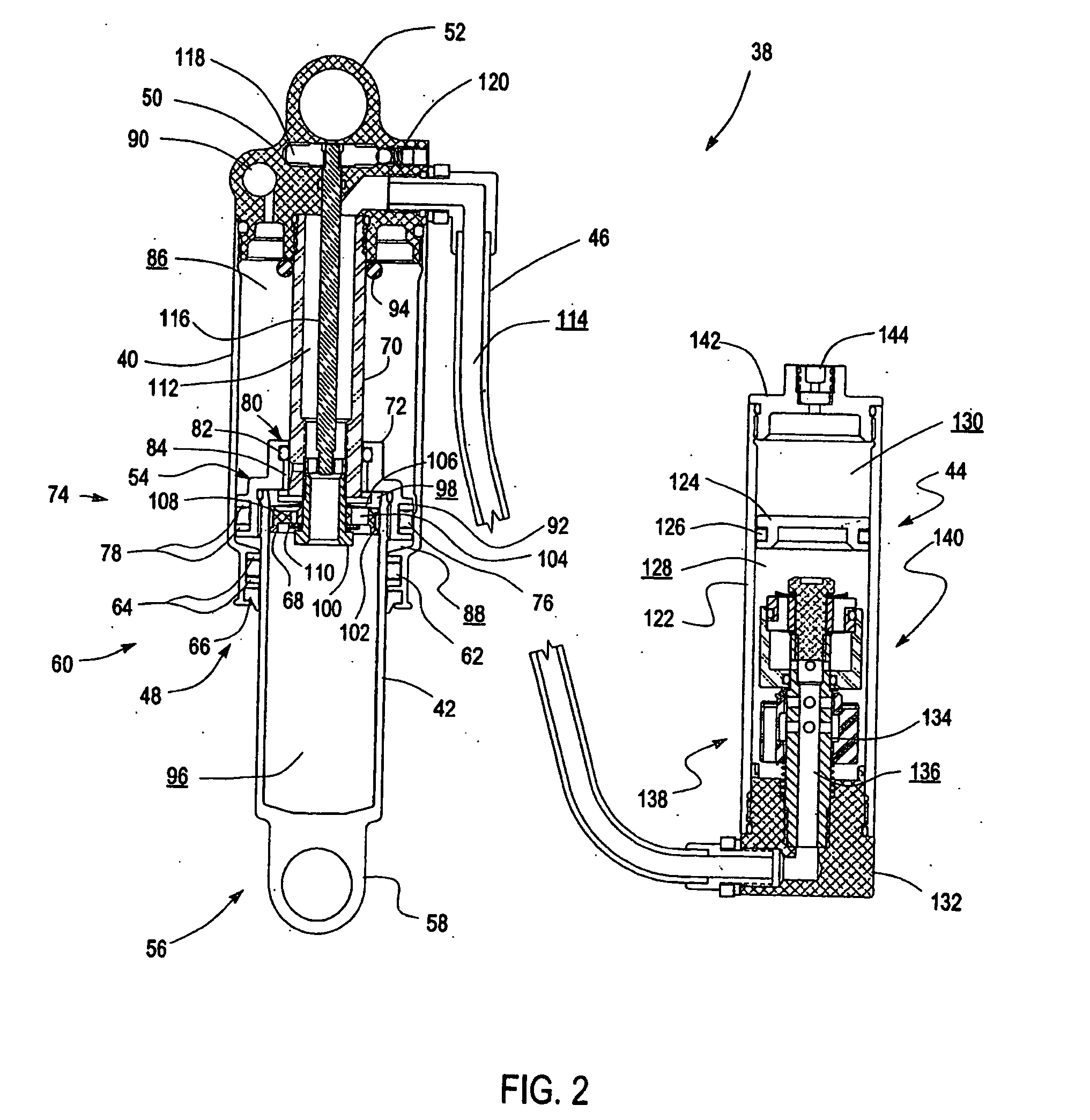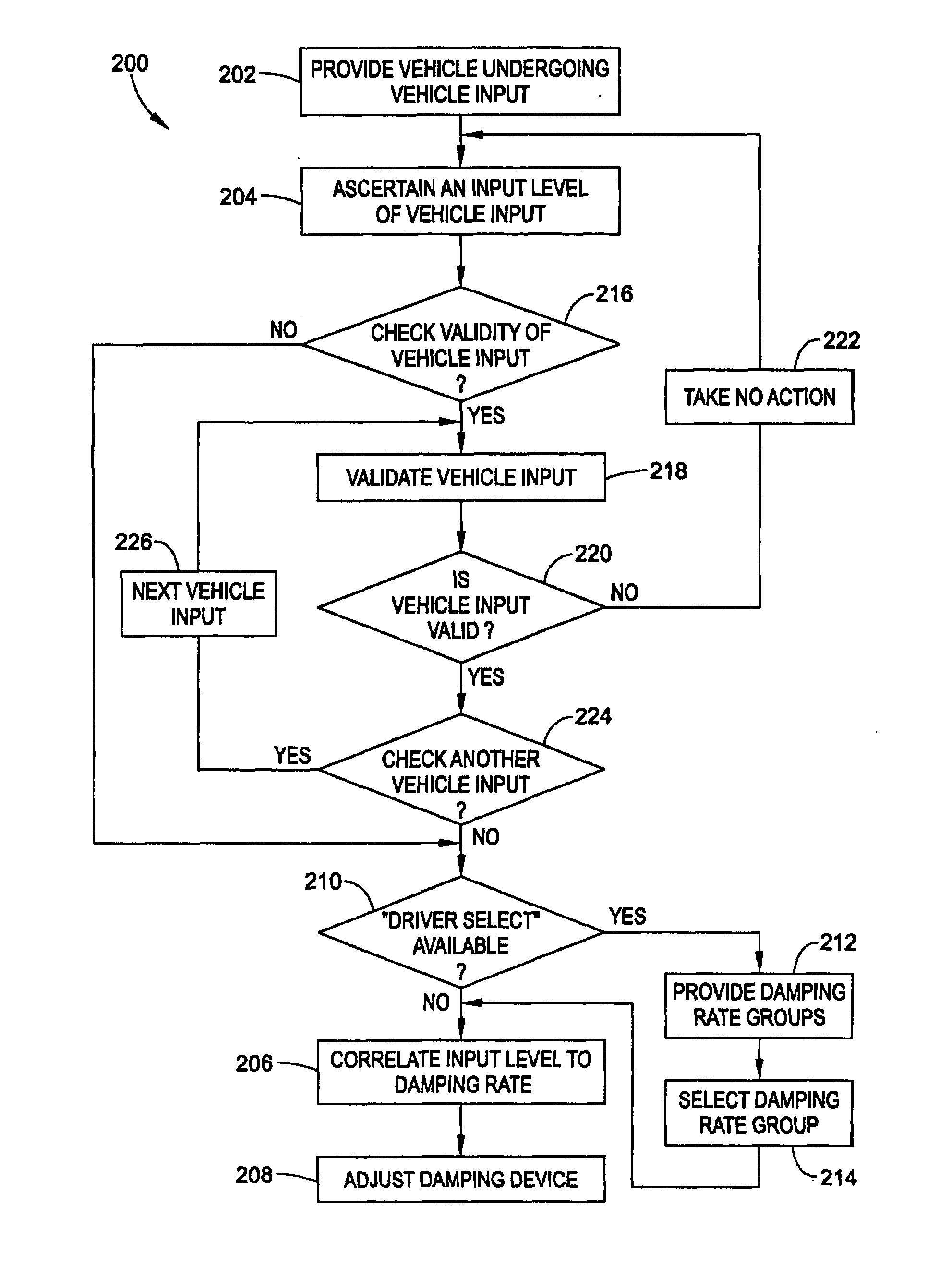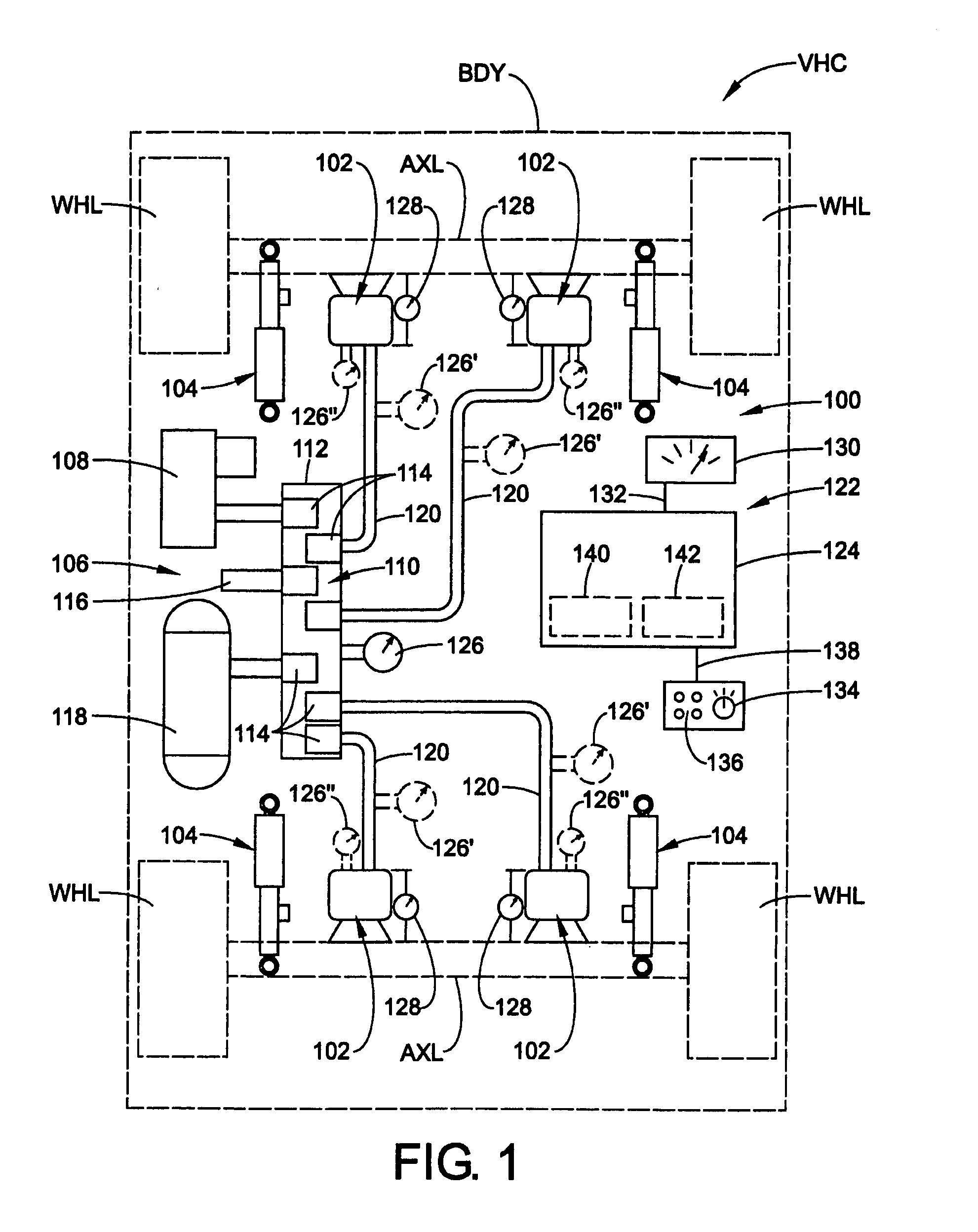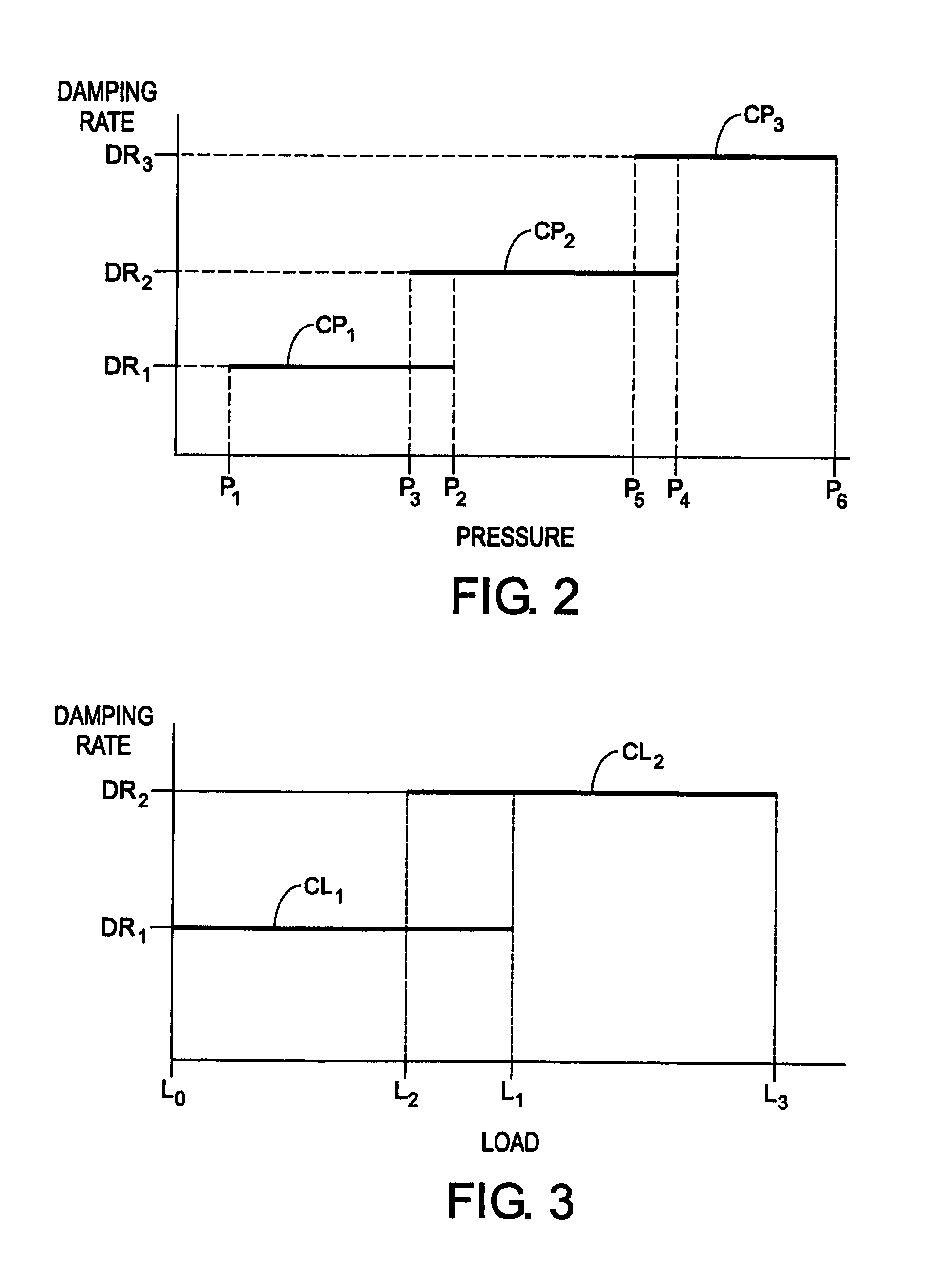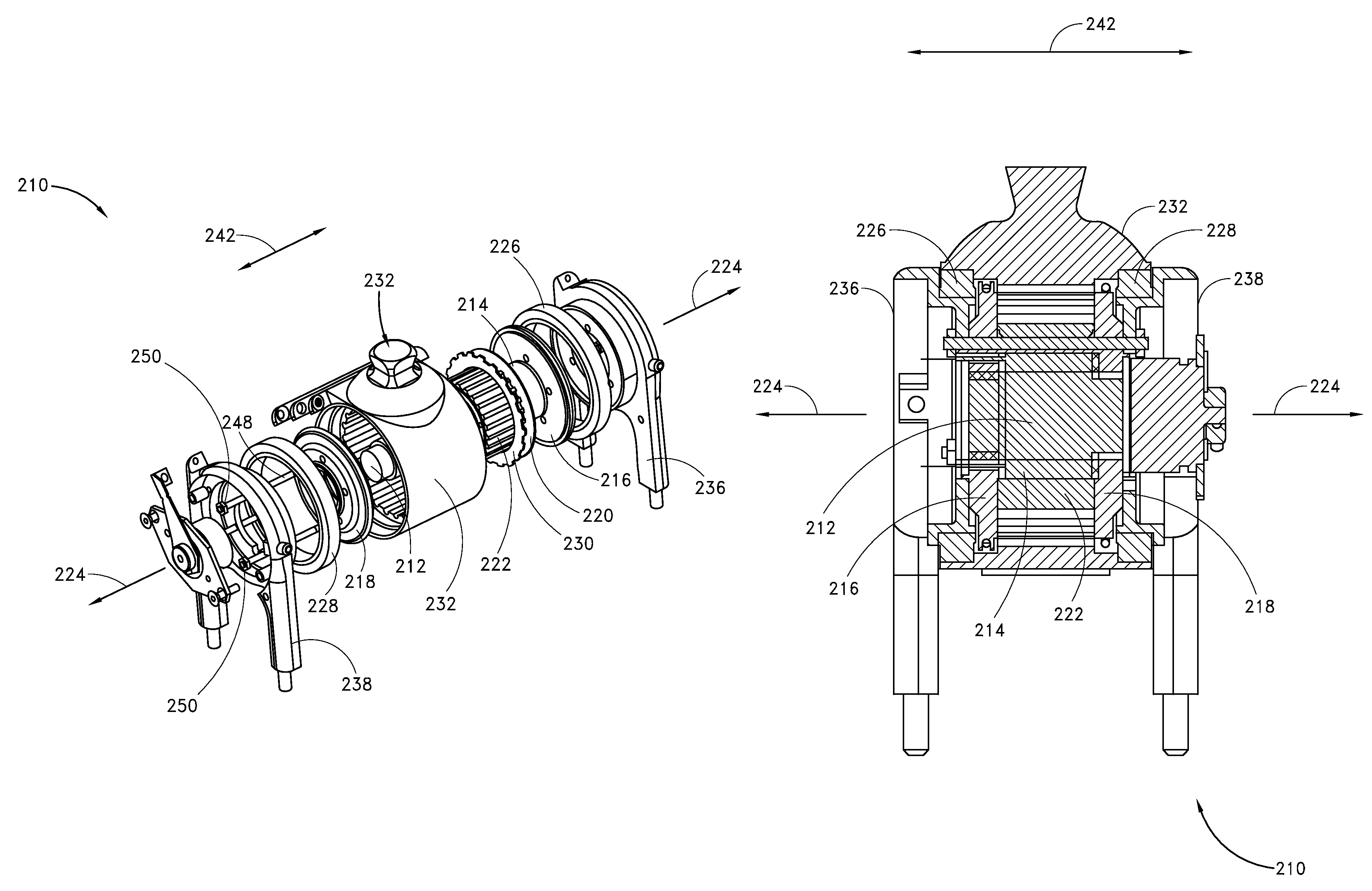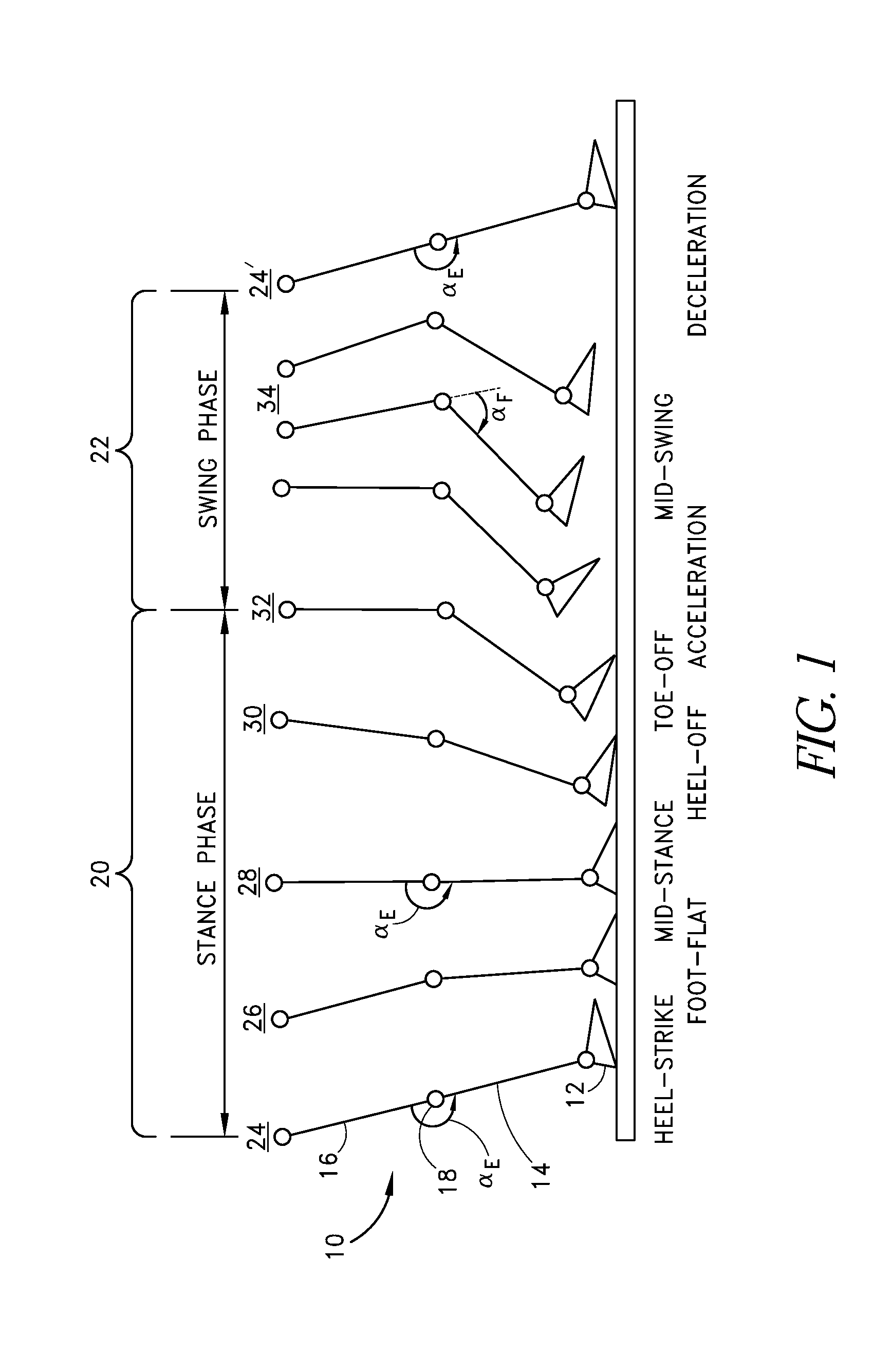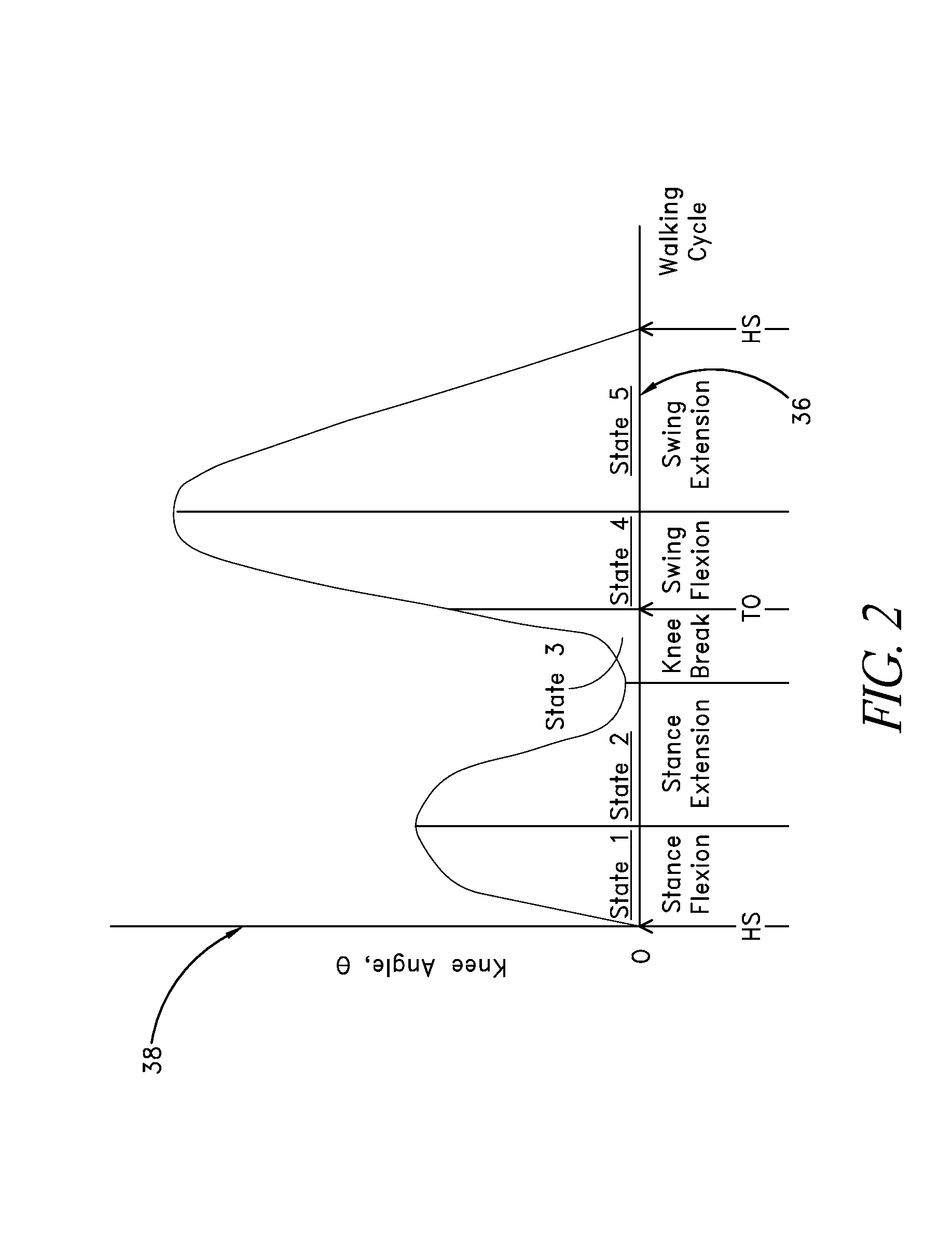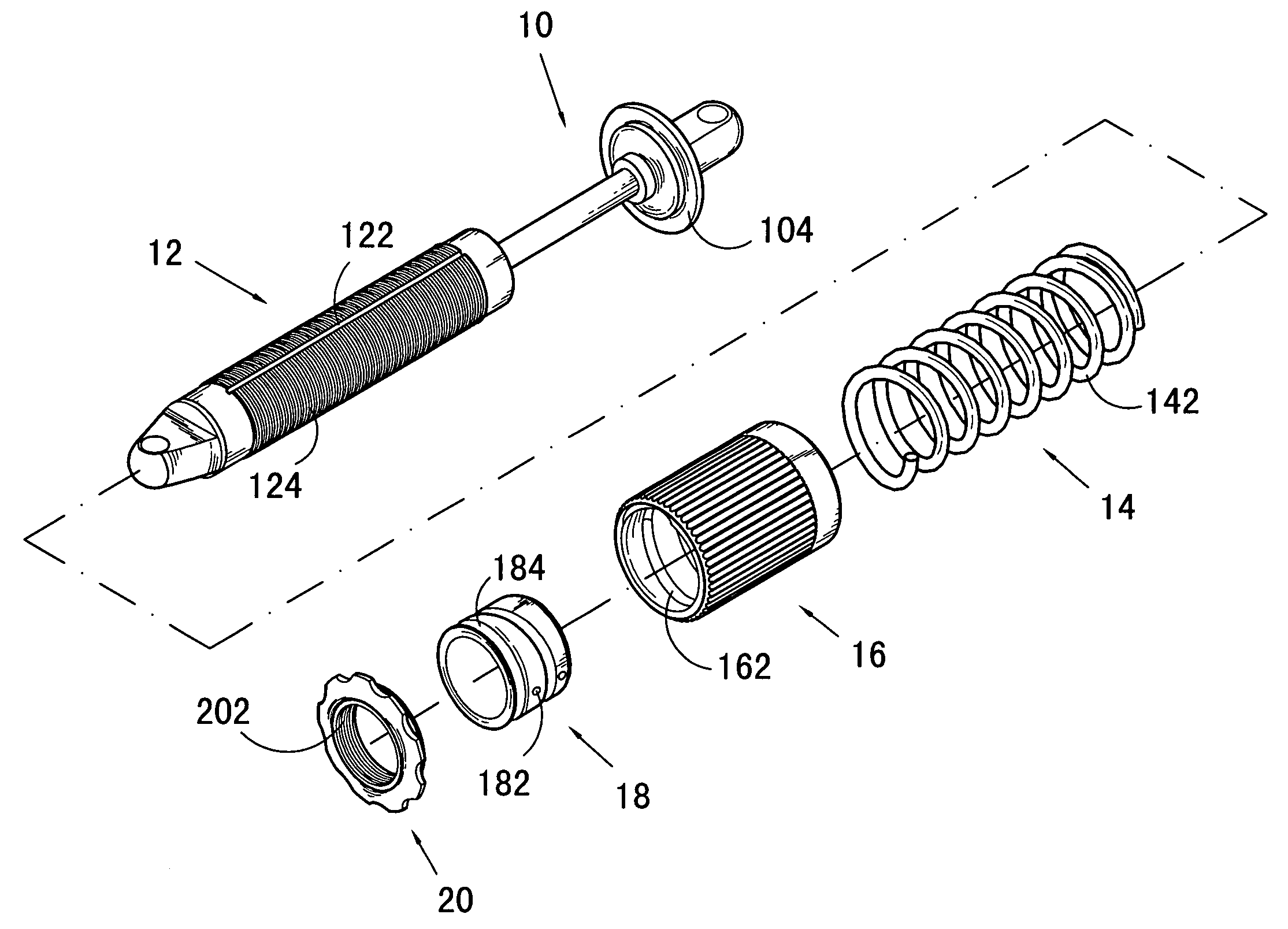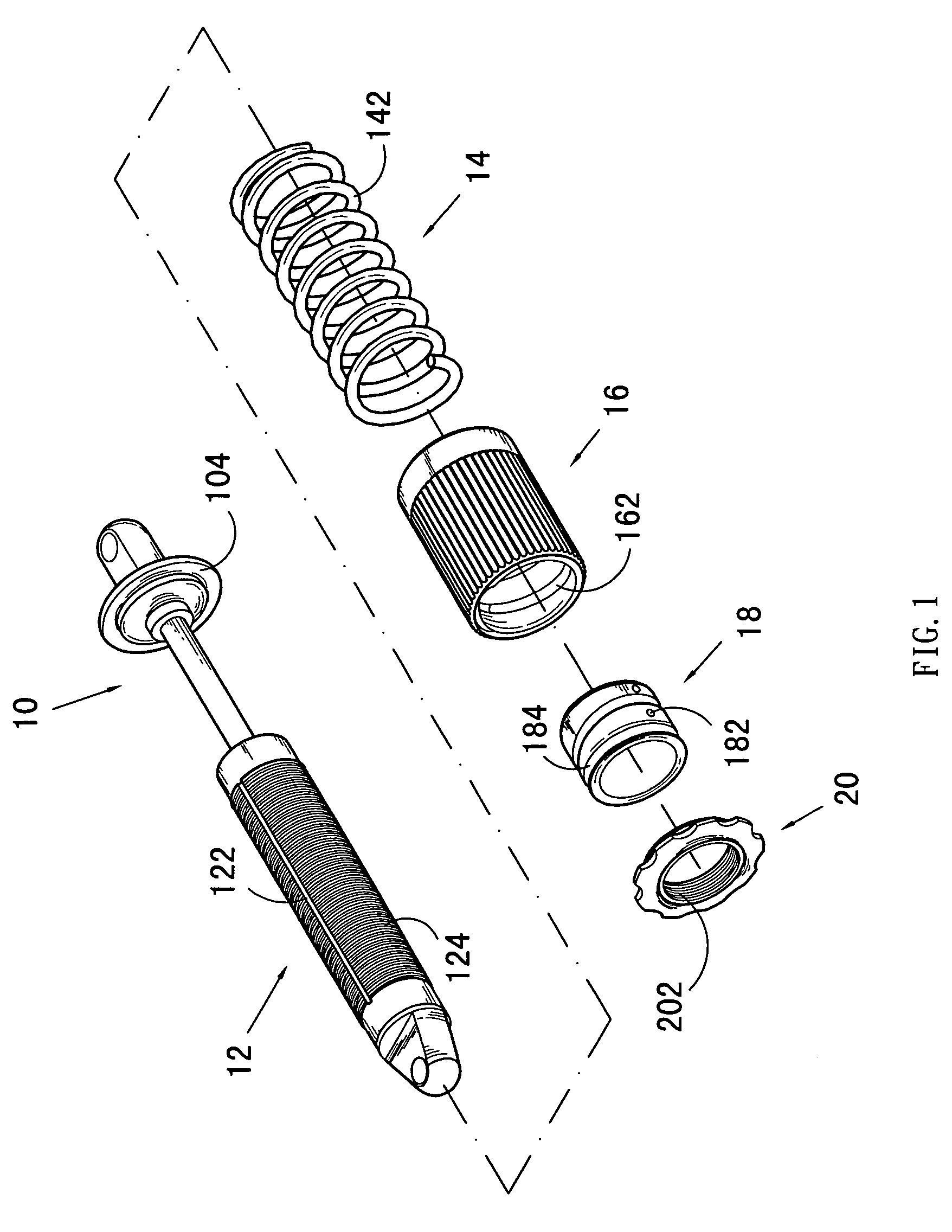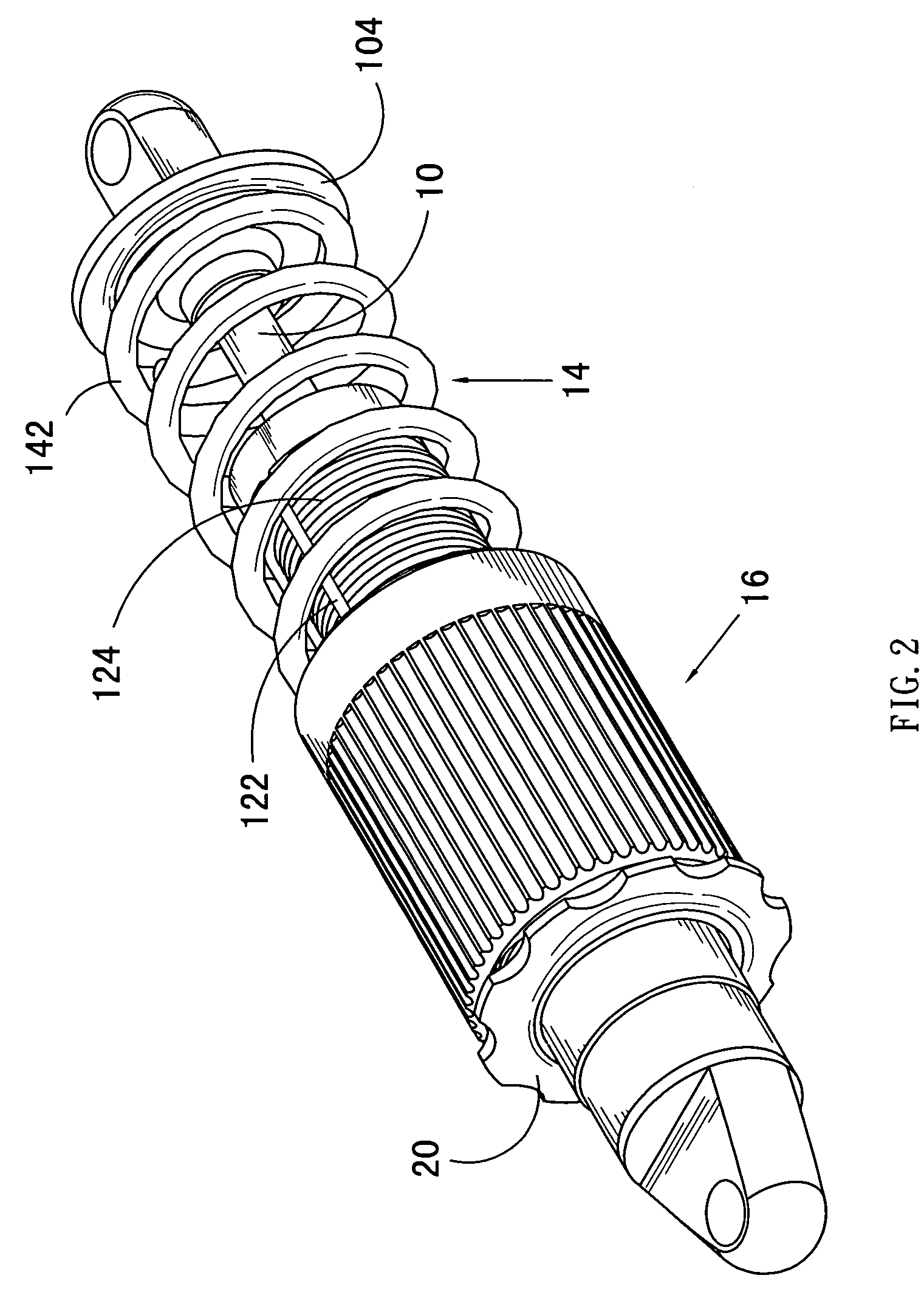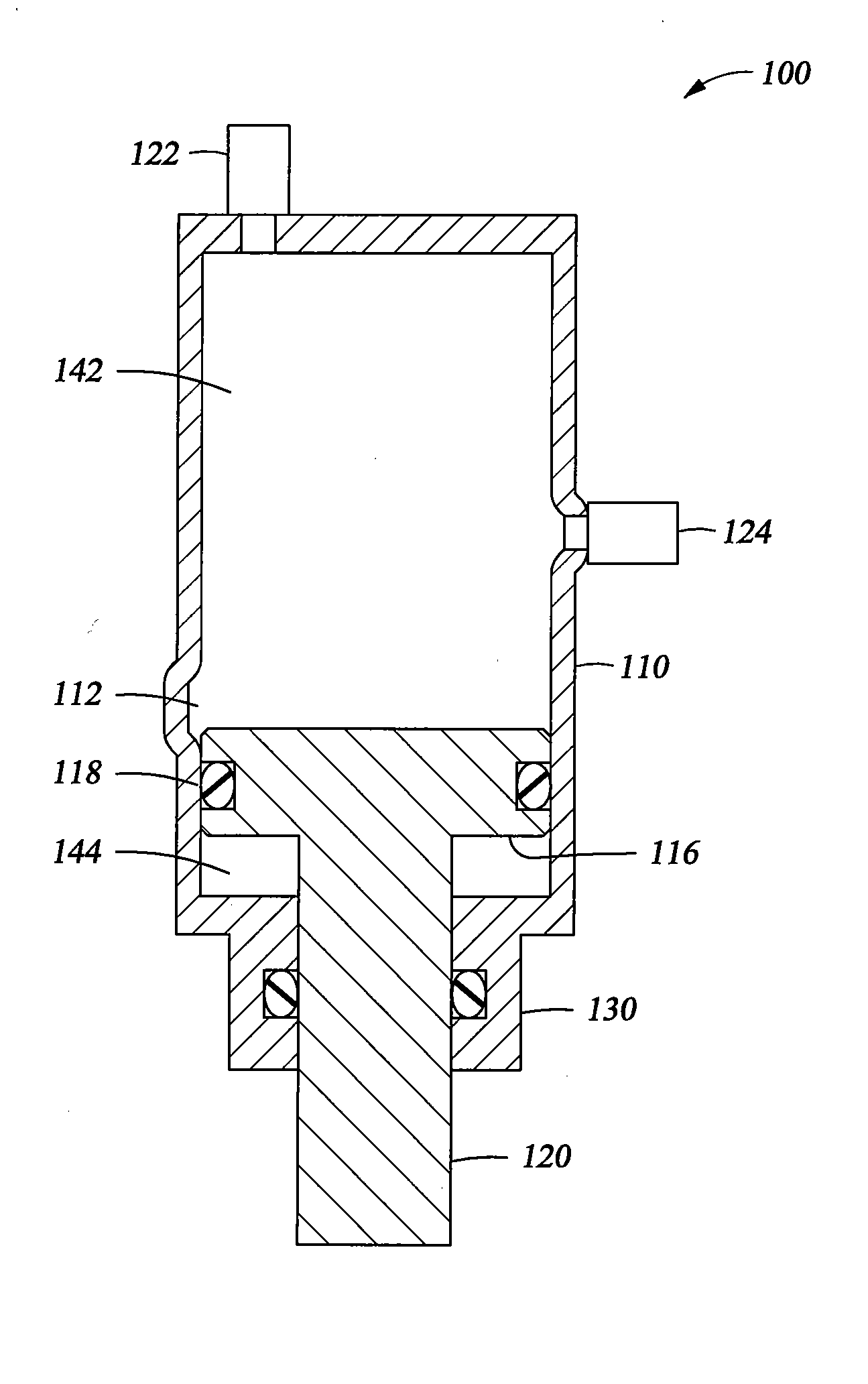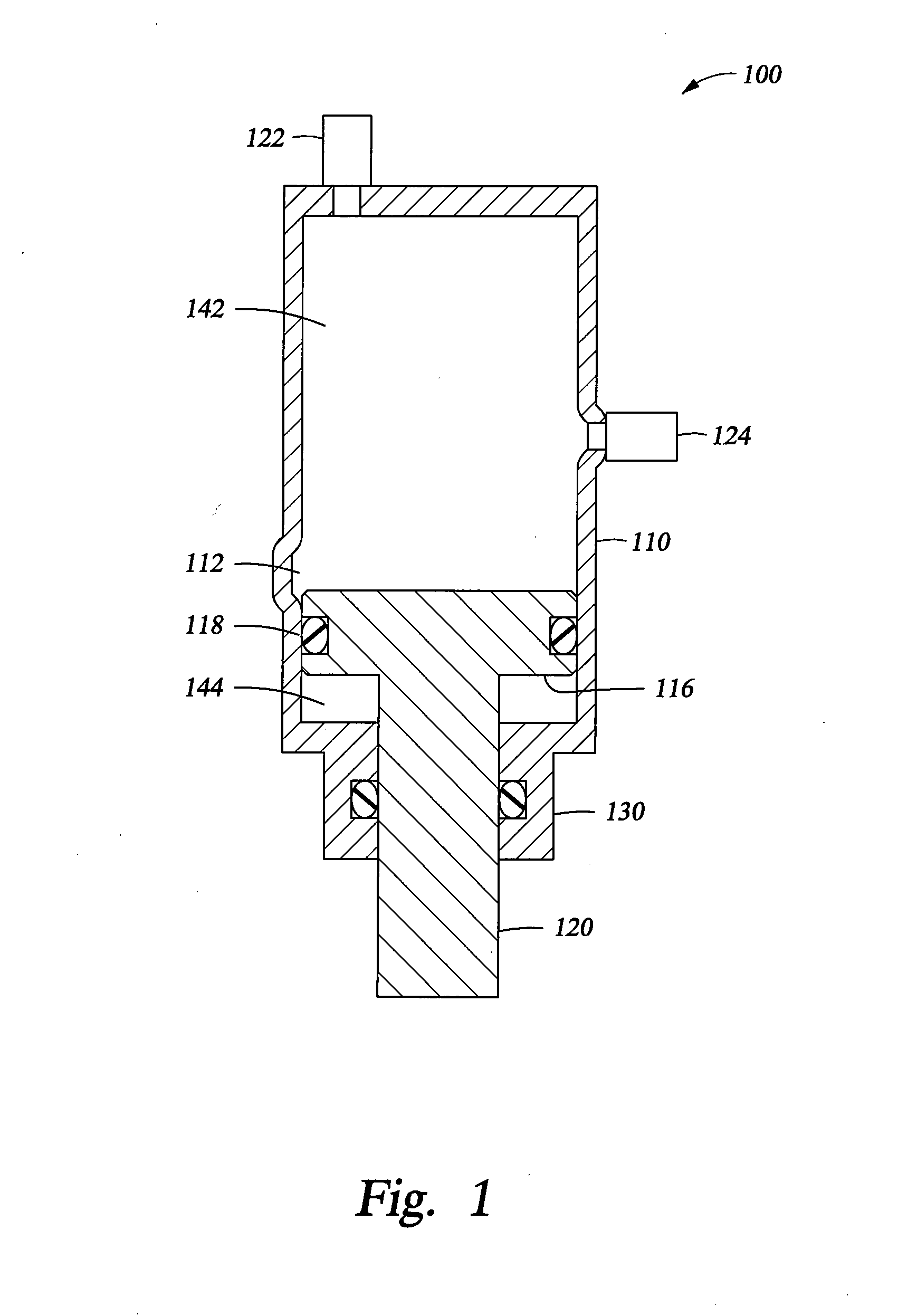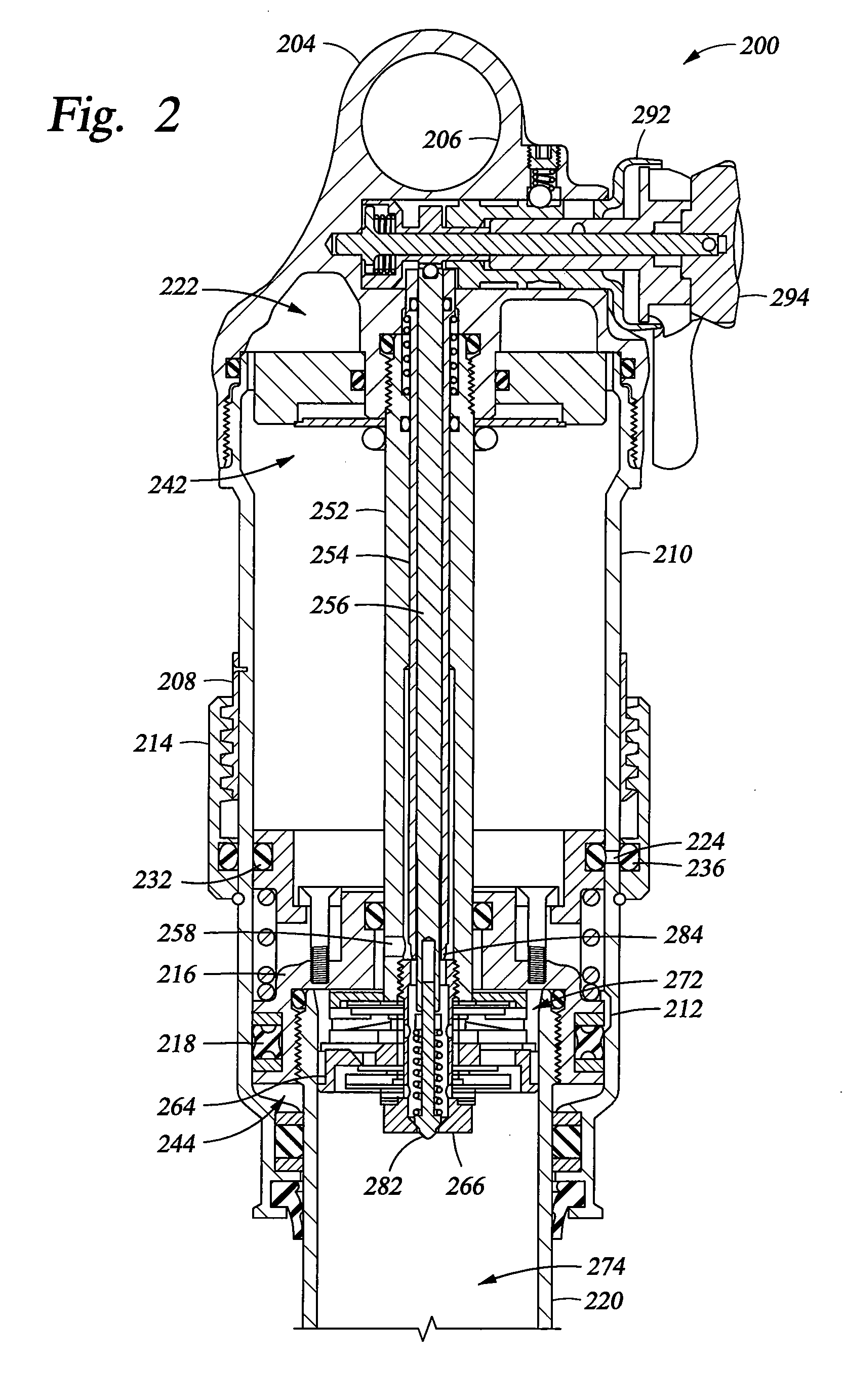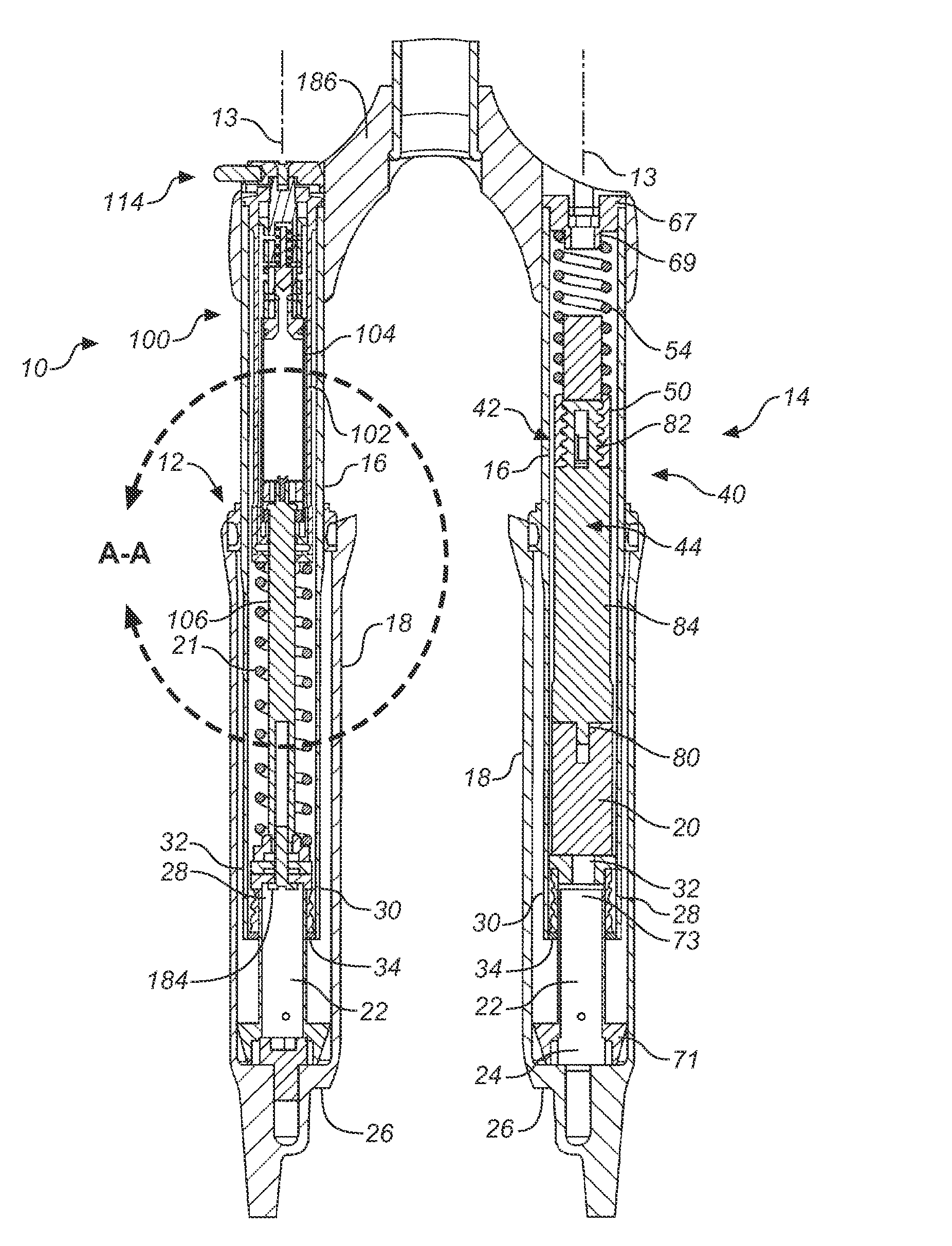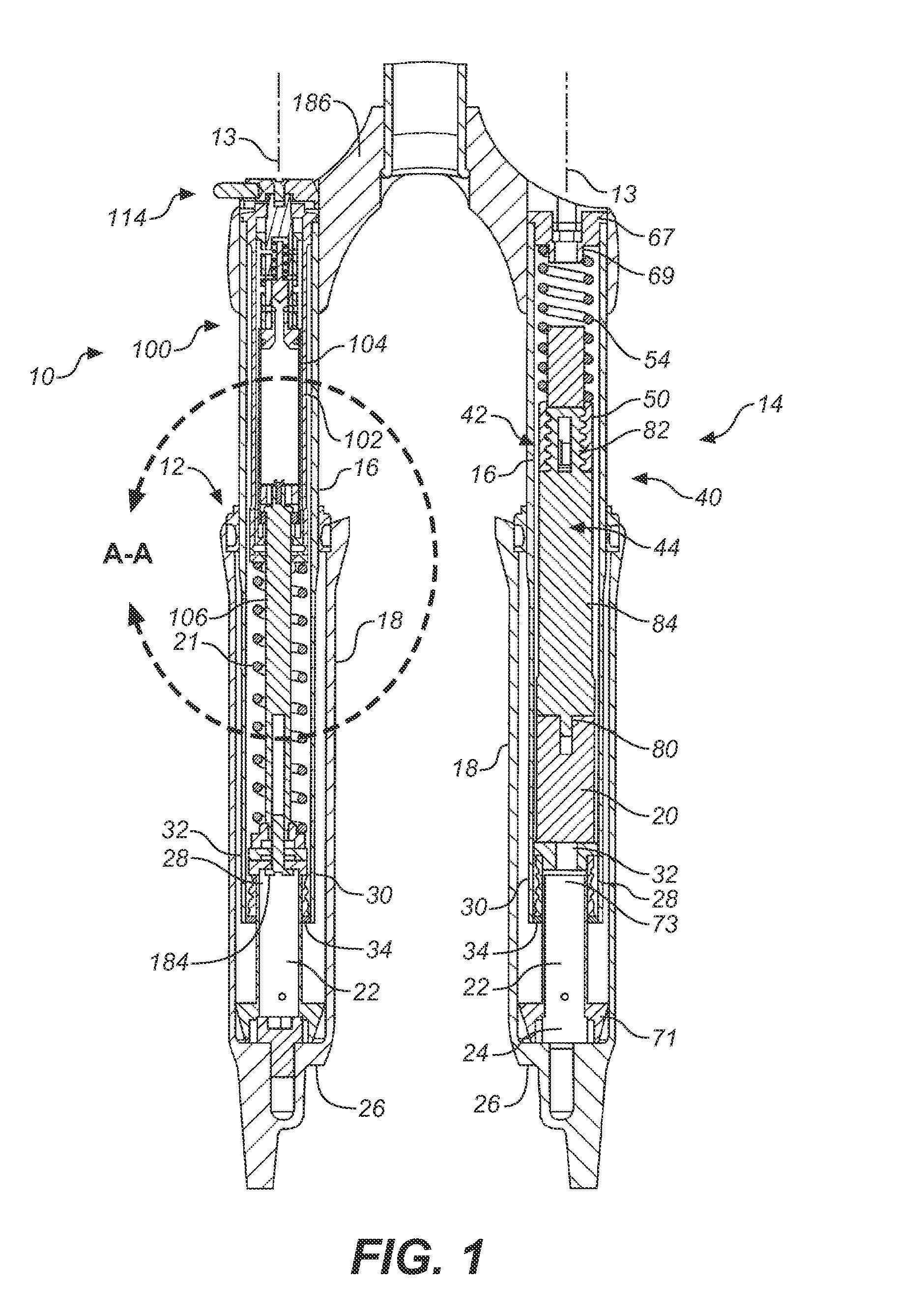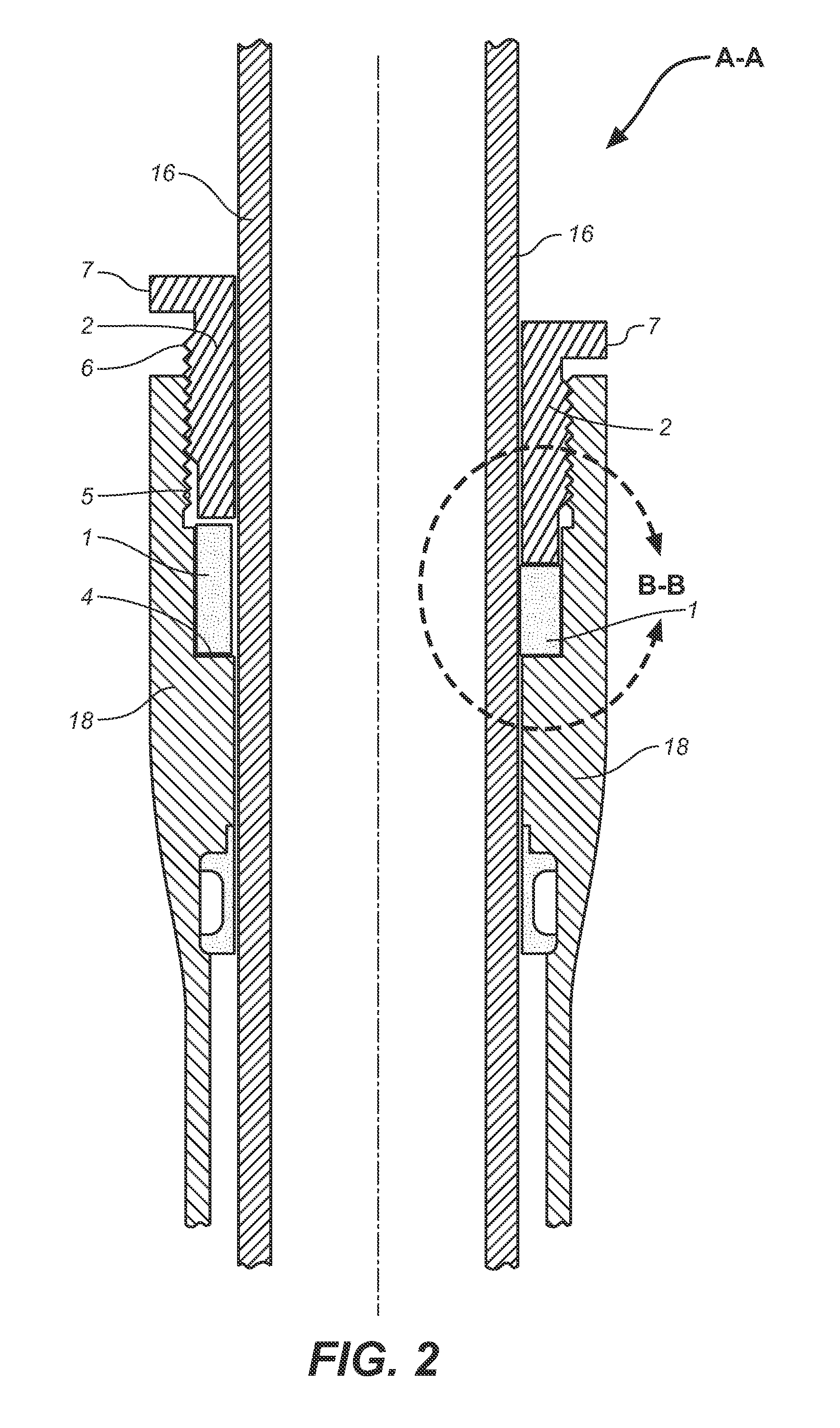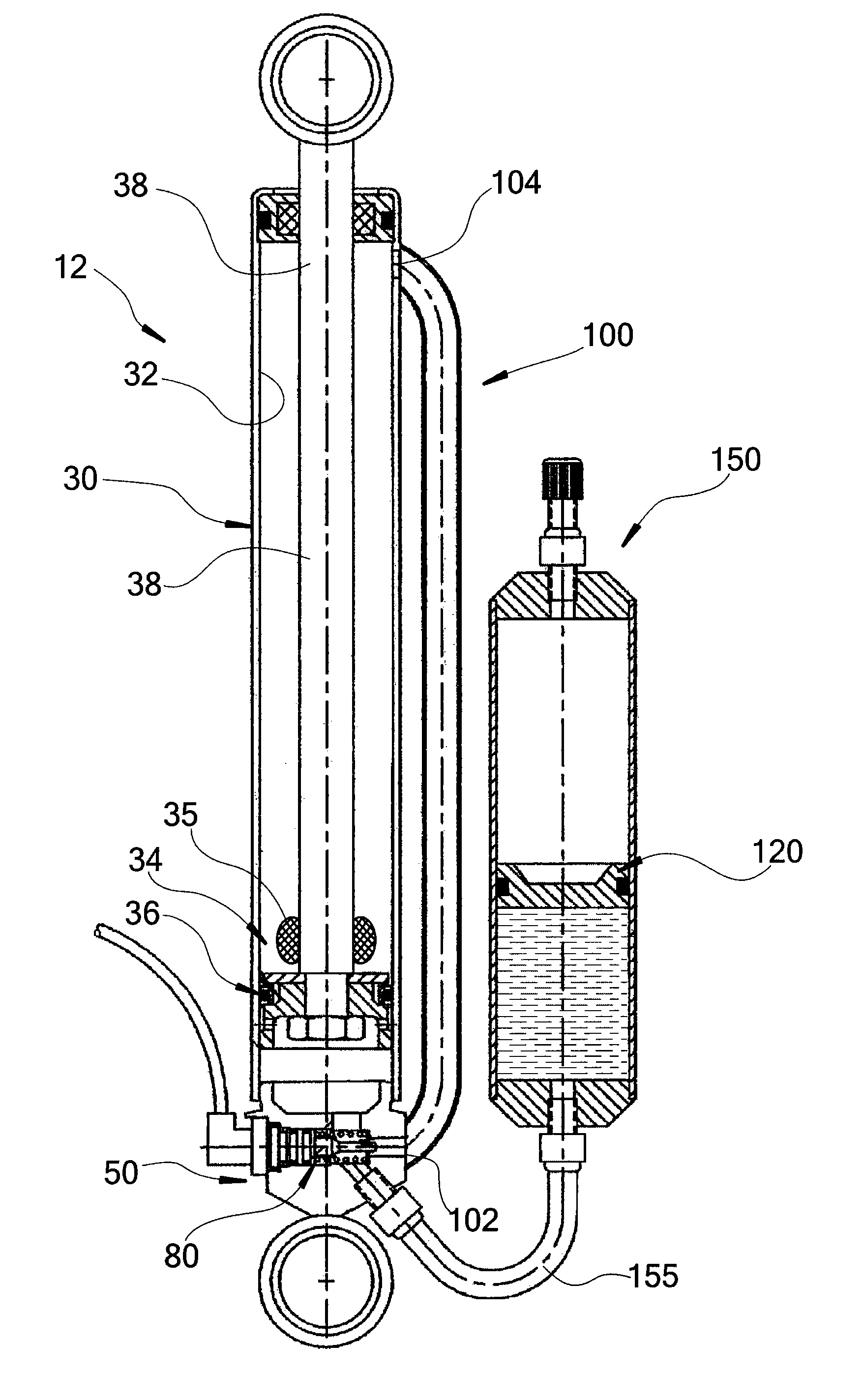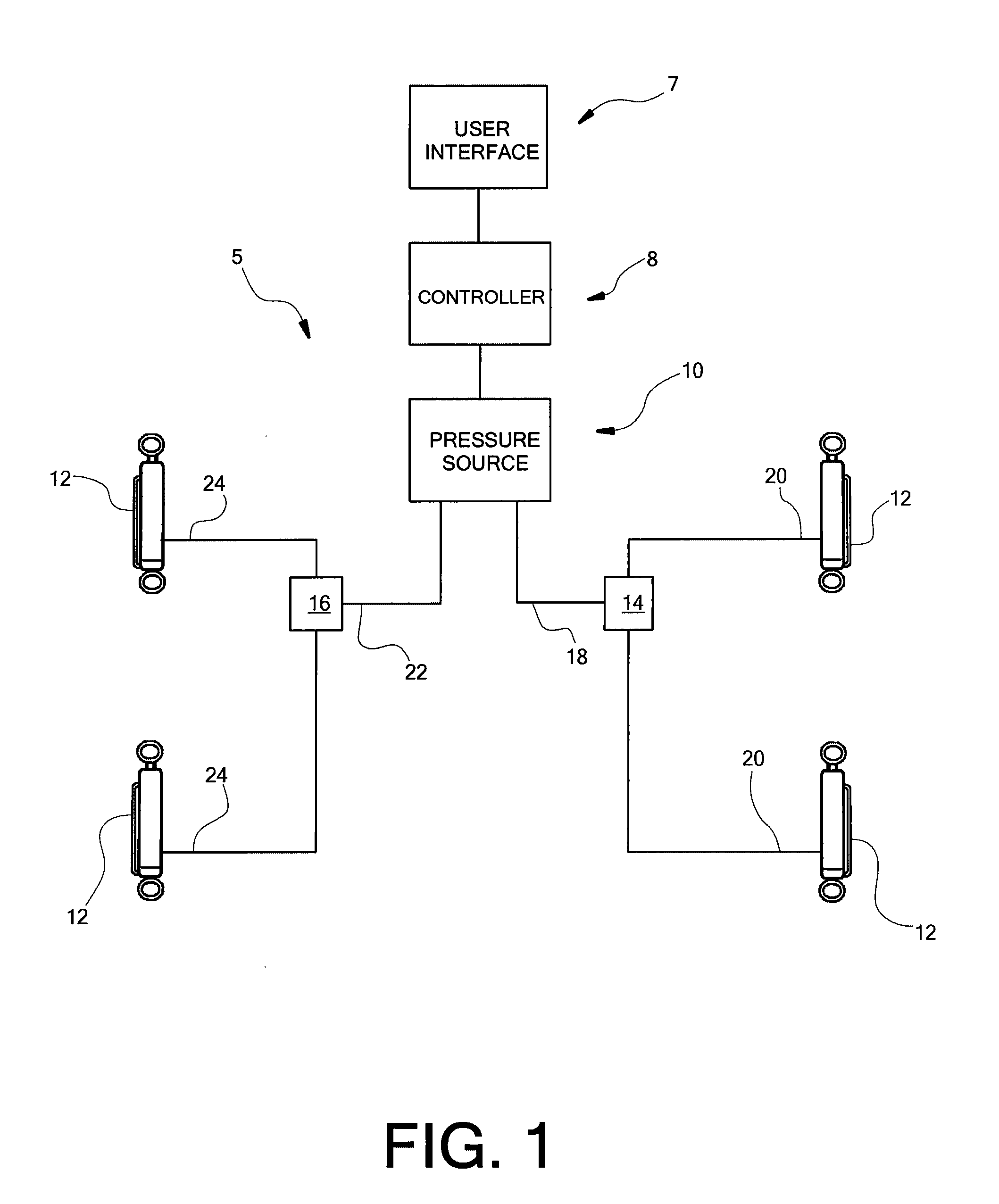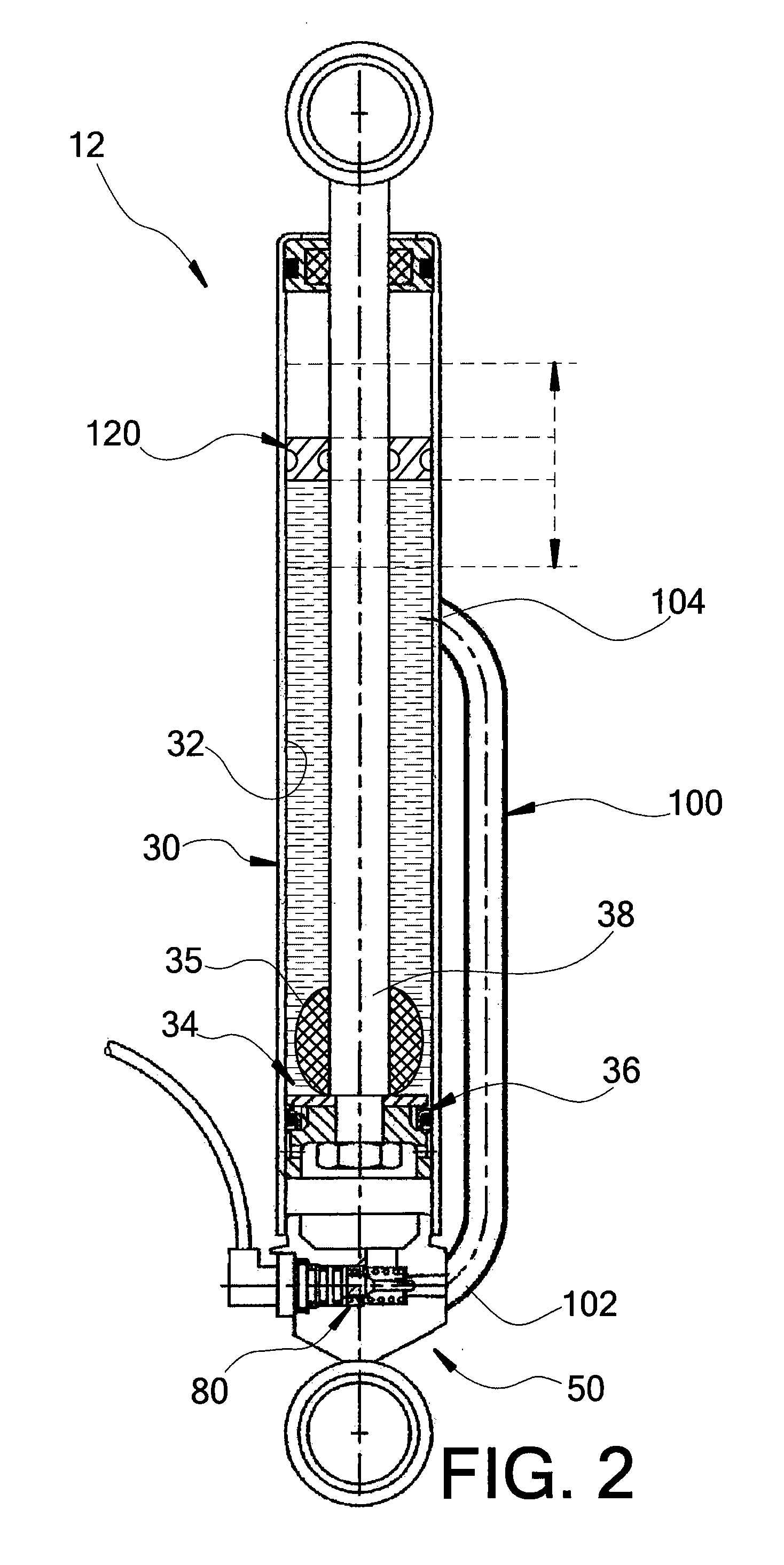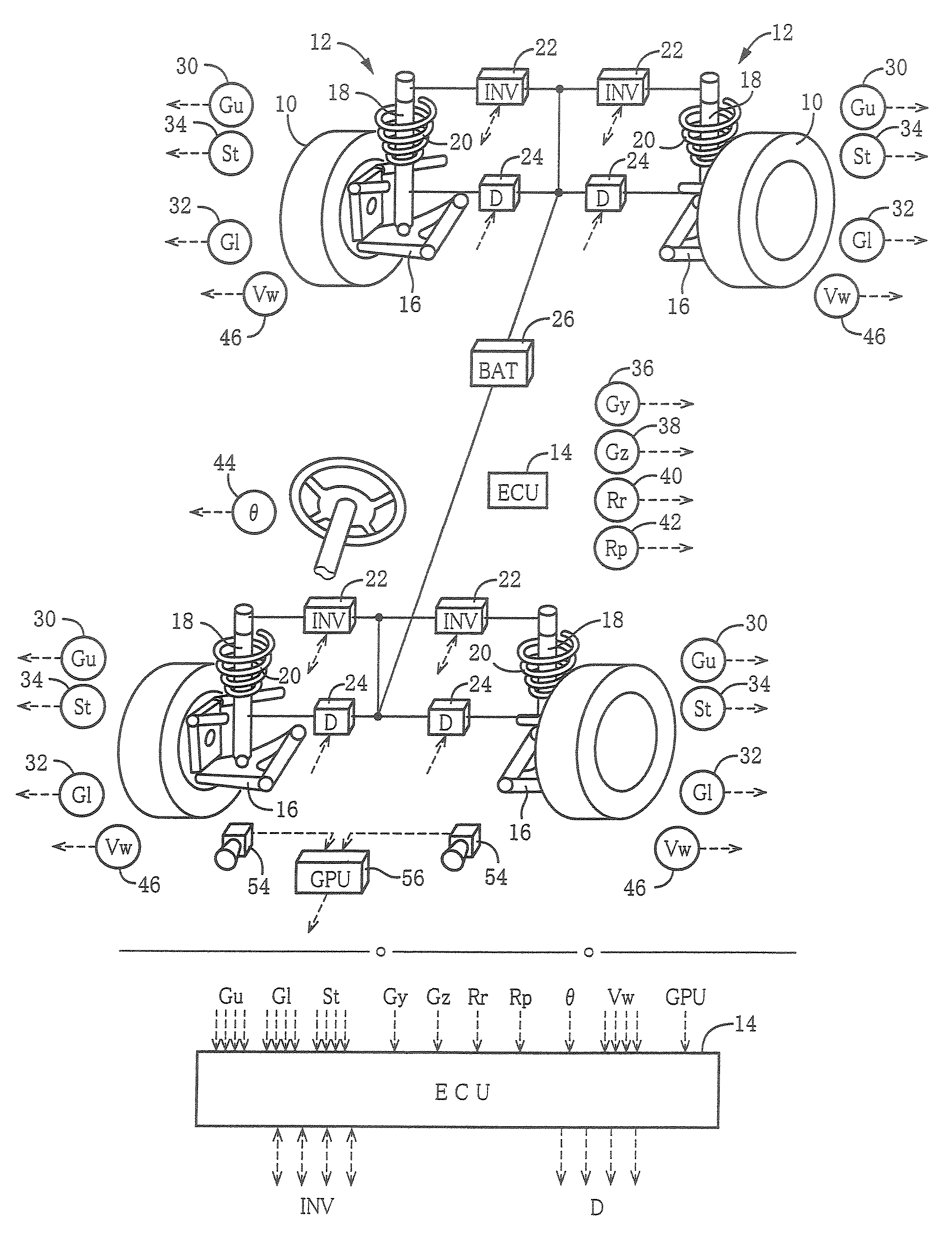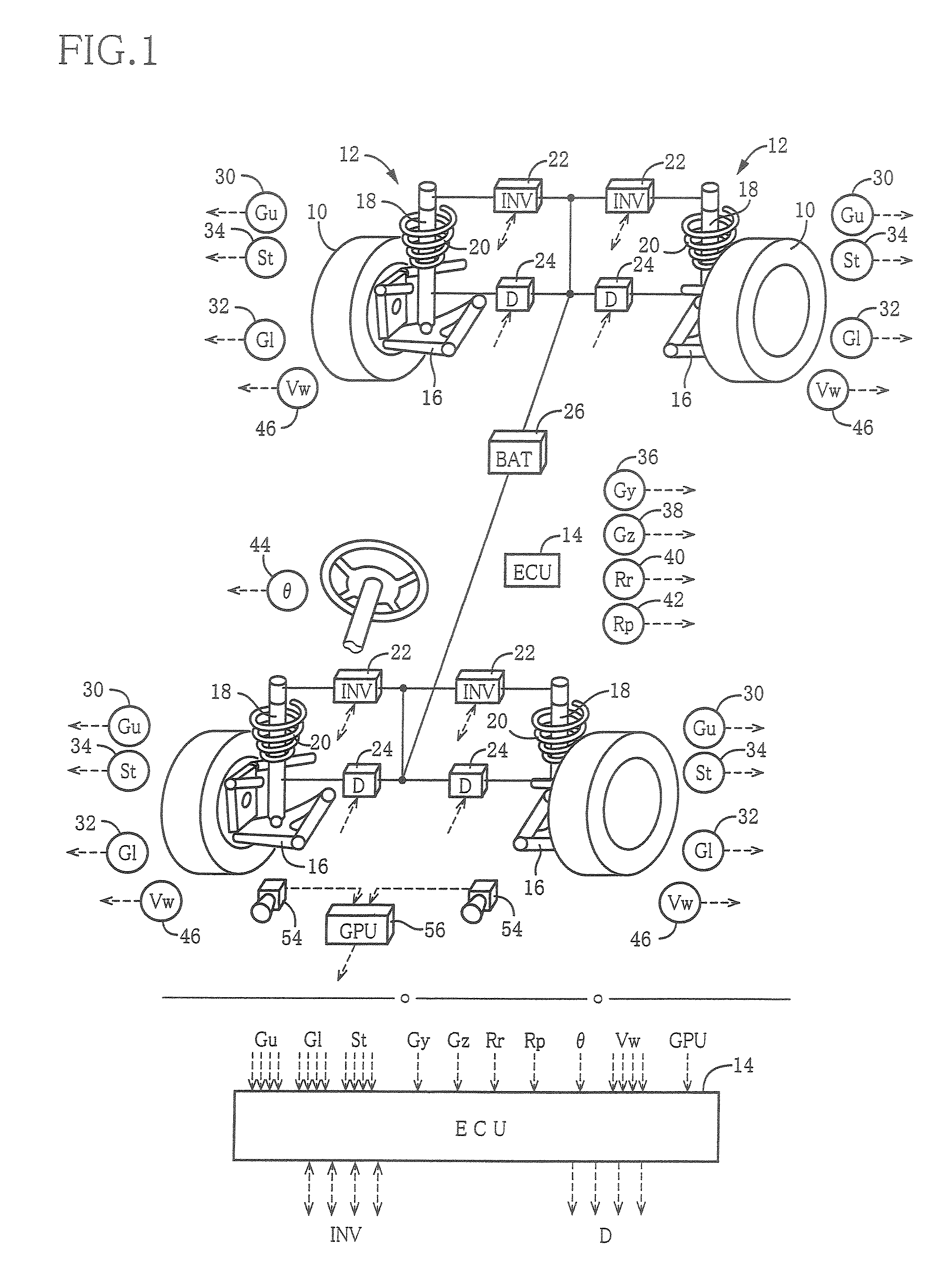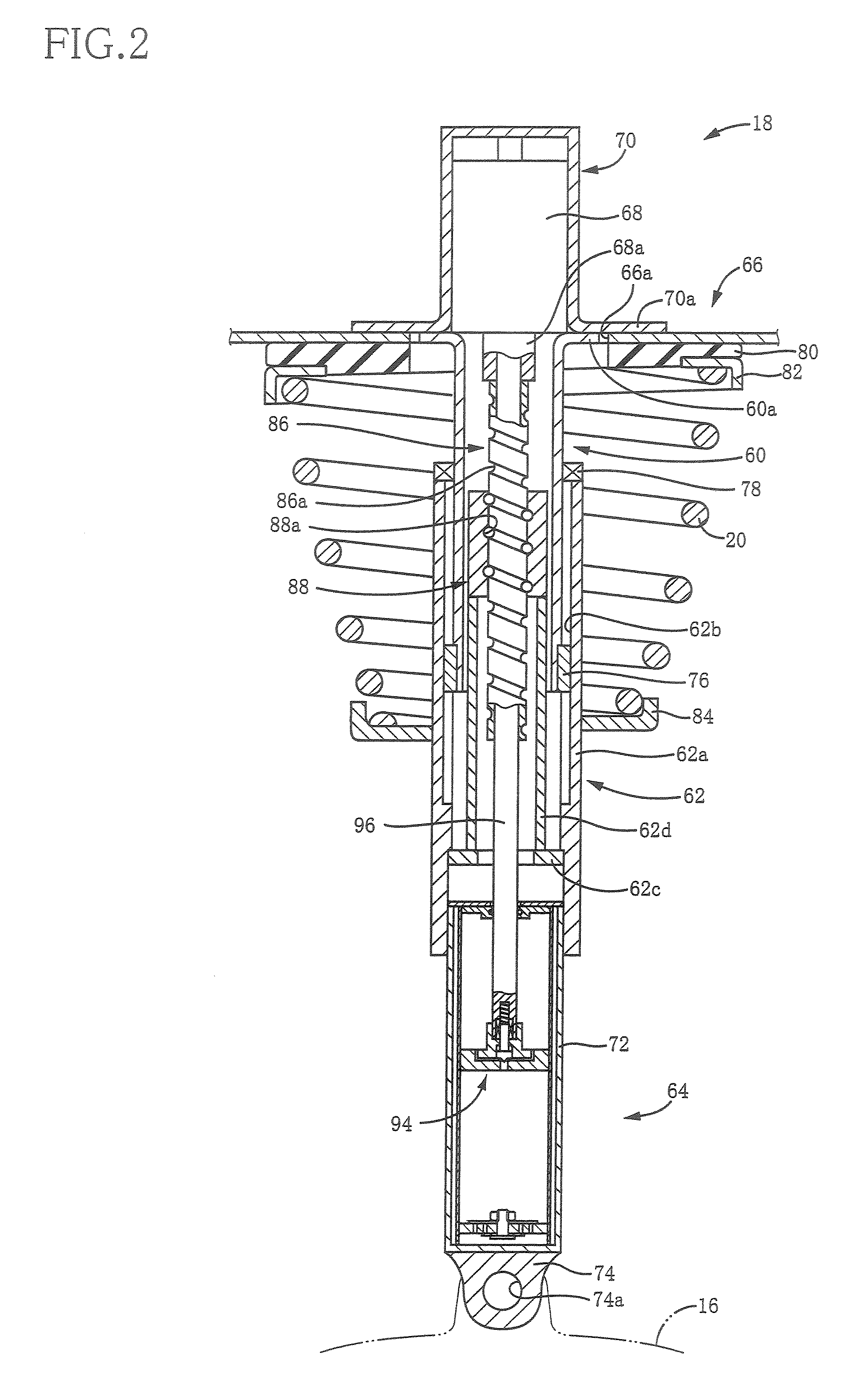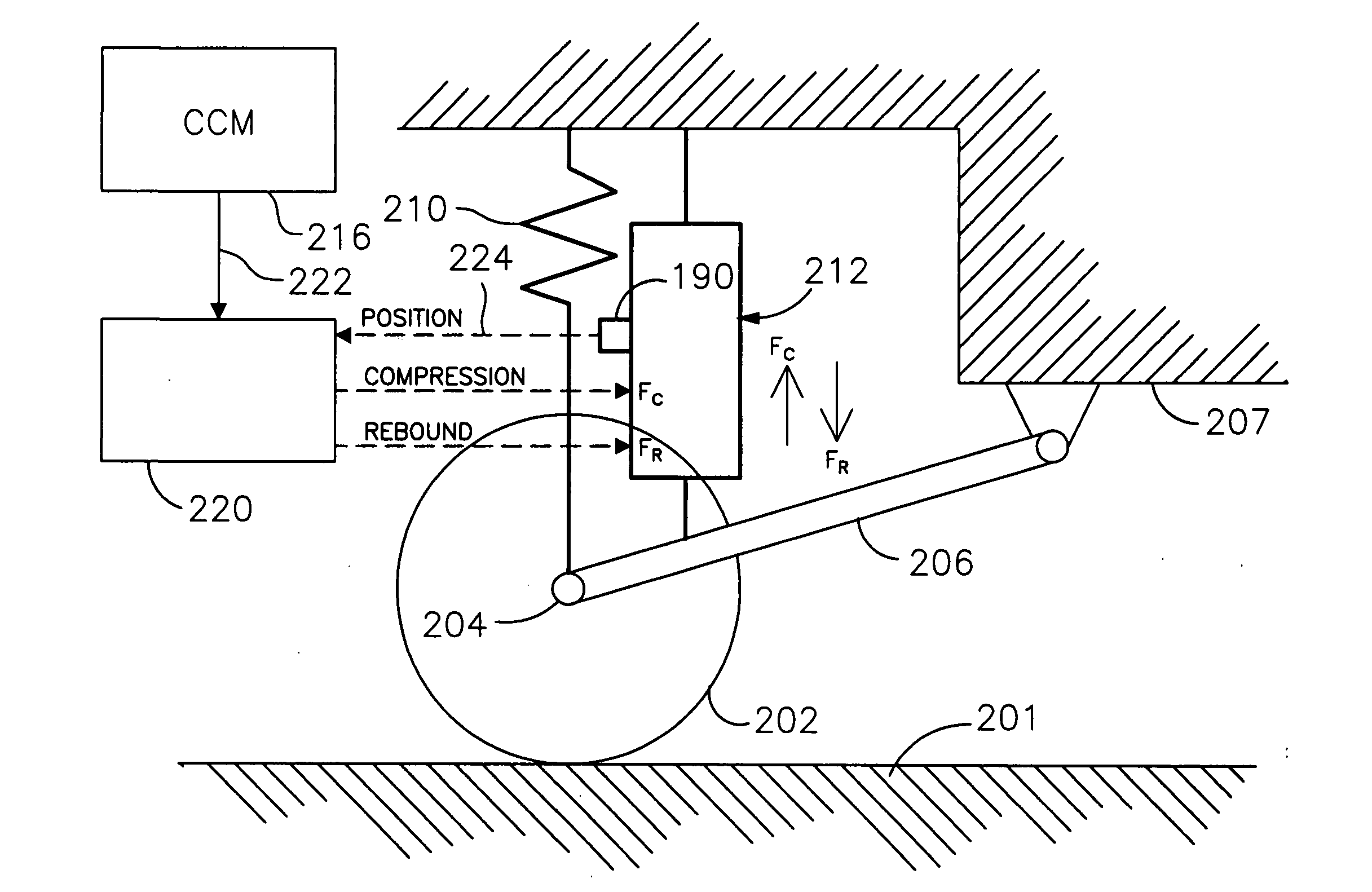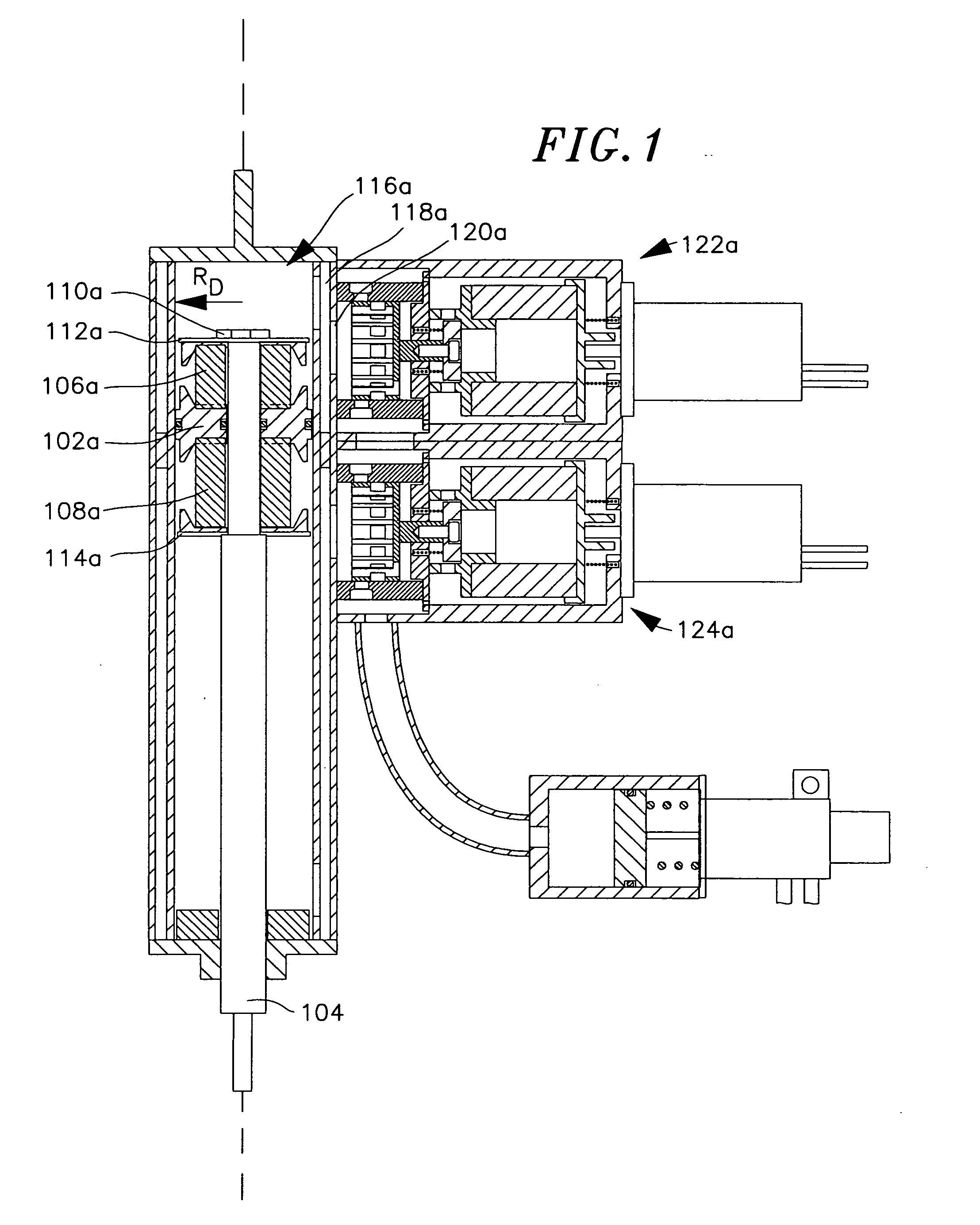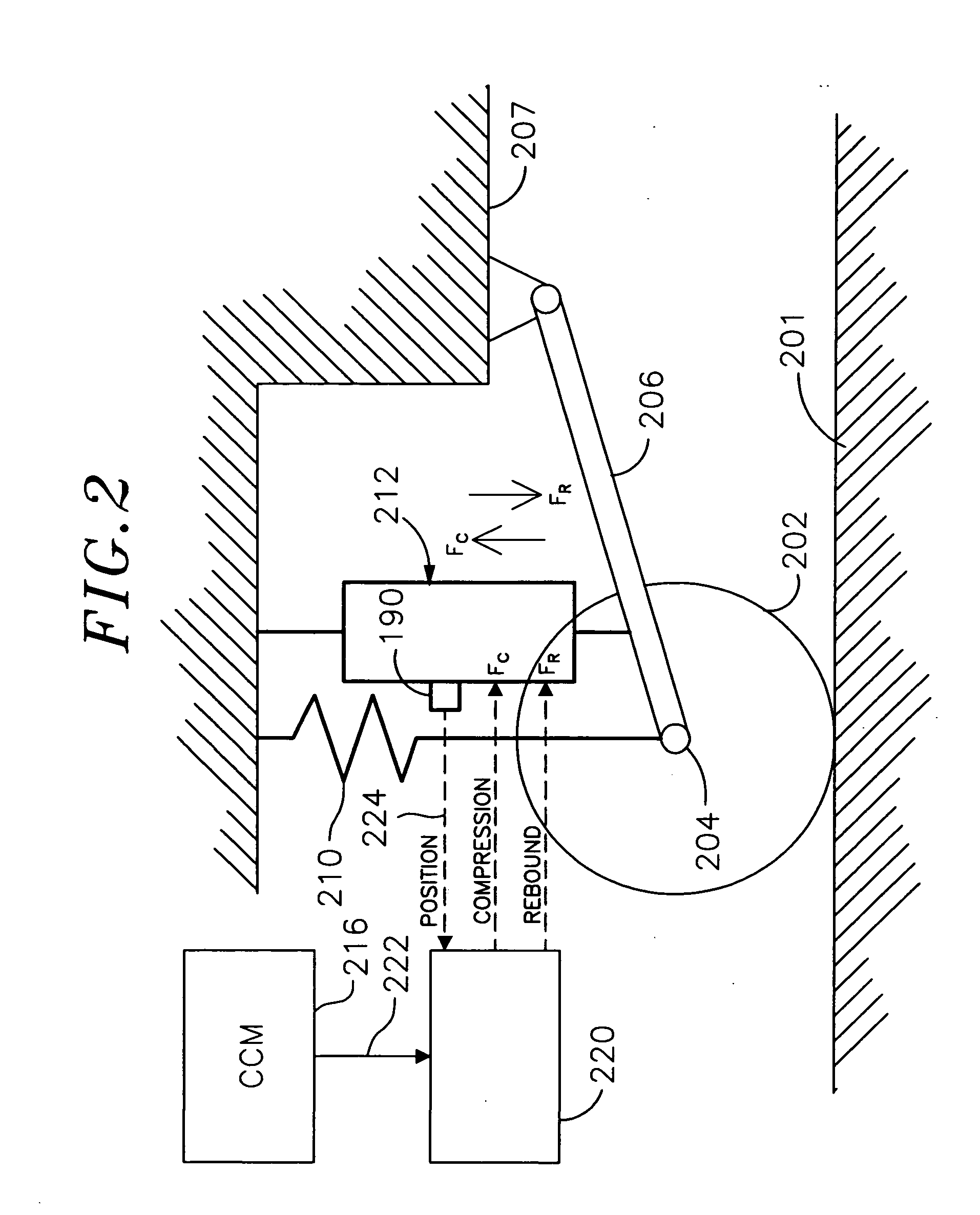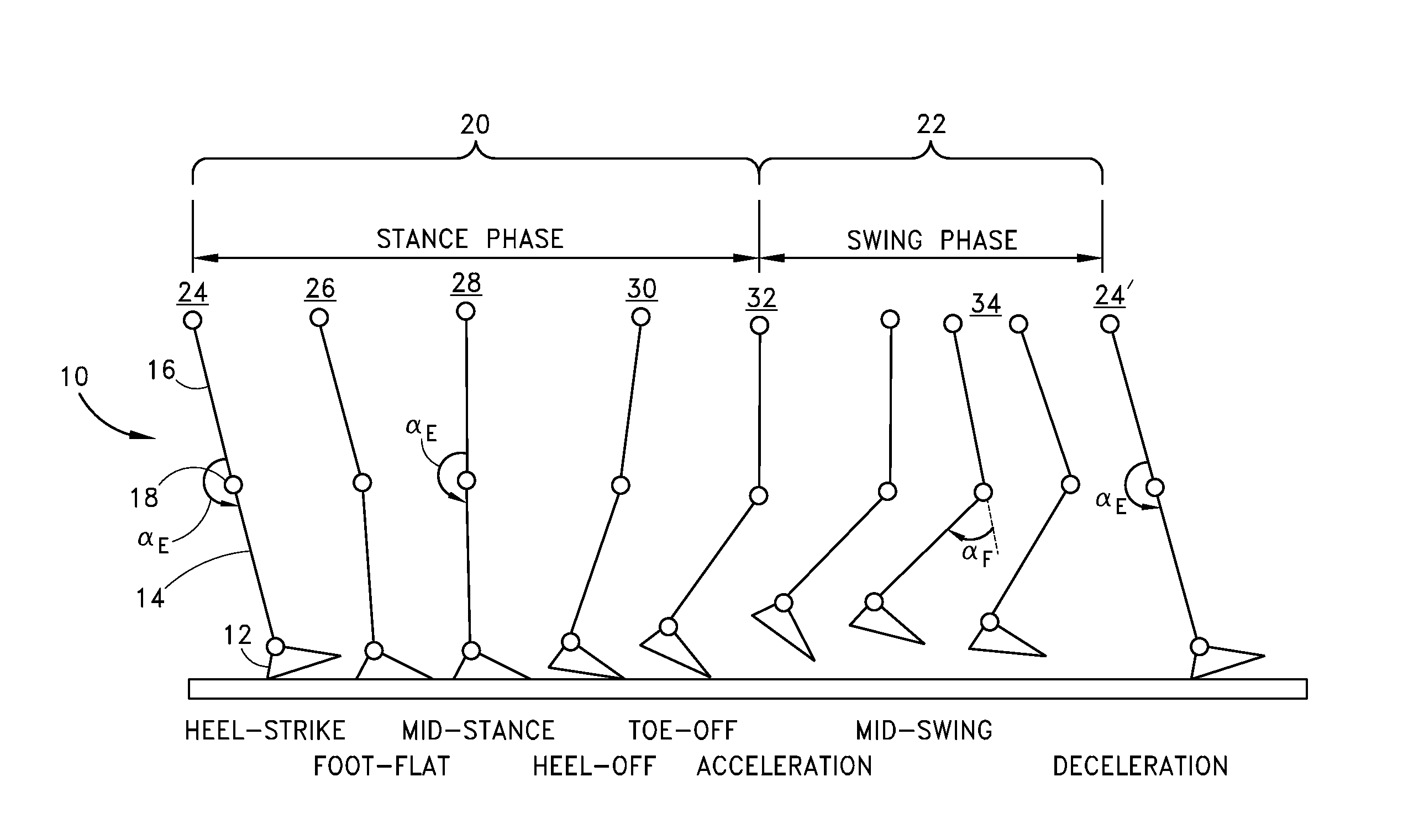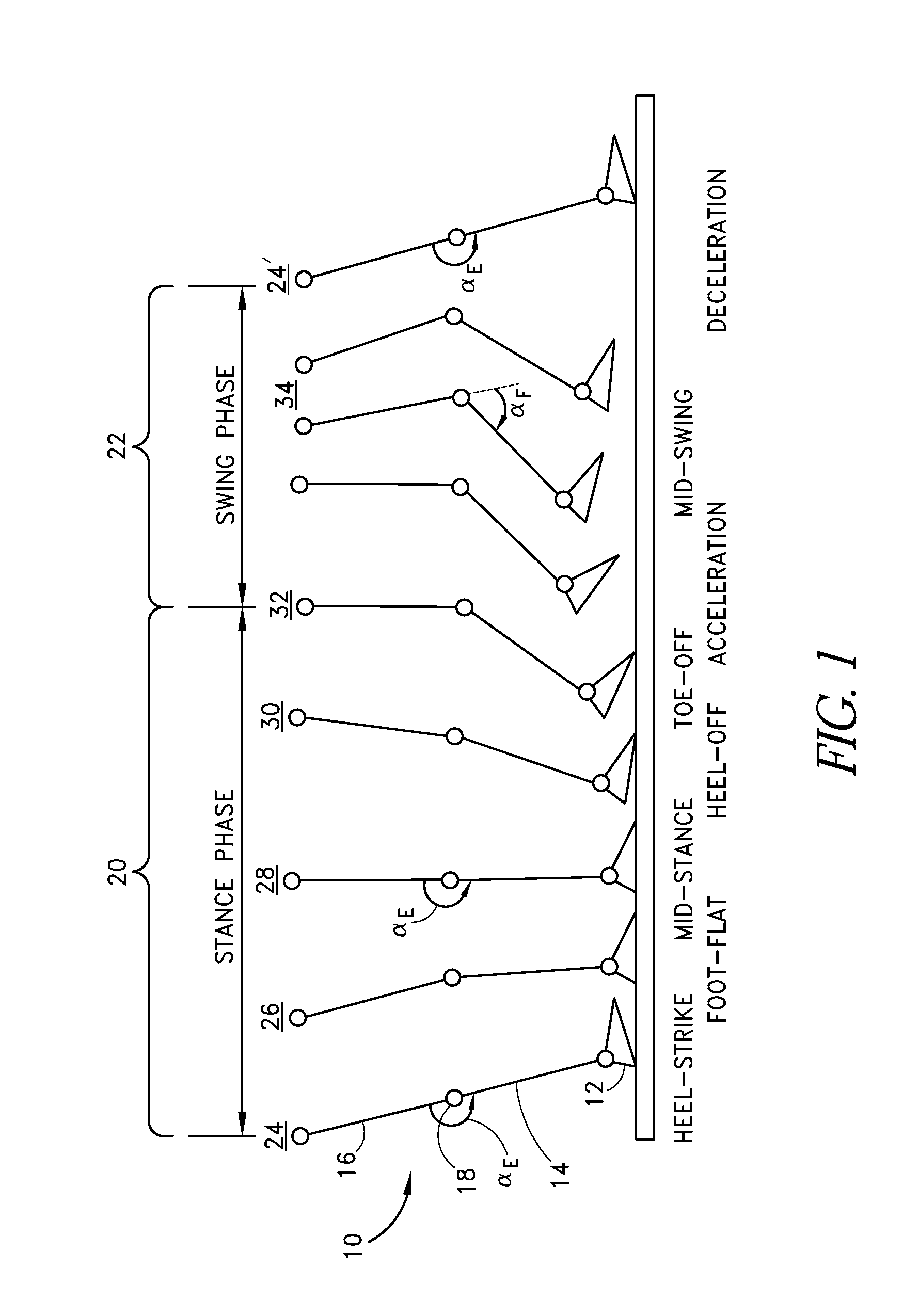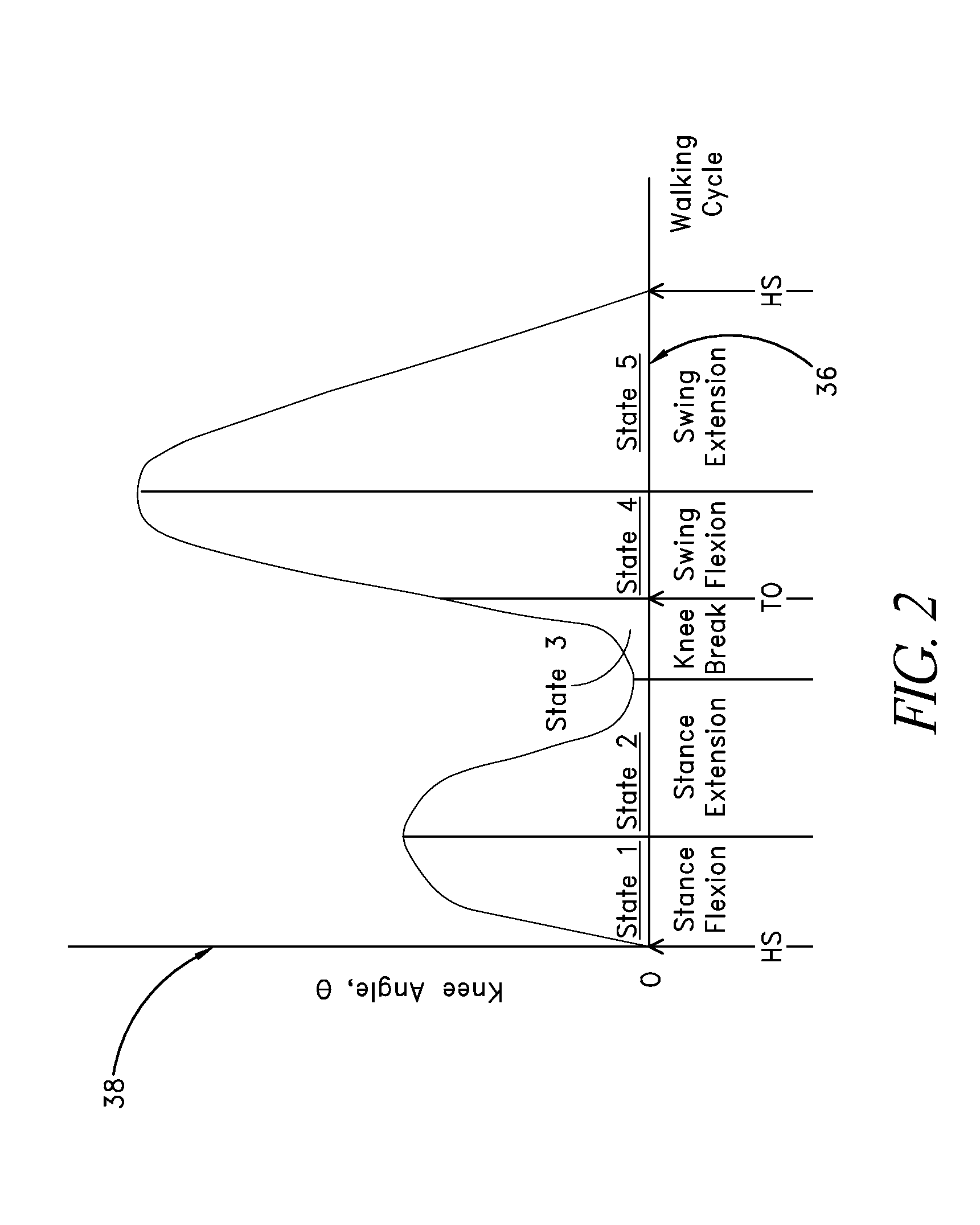Patents
Literature
17528results about "Springs" patented technology
Efficacy Topic
Property
Owner
Technical Advancement
Application Domain
Technology Topic
Technology Field Word
Patent Country/Region
Patent Type
Patent Status
Application Year
Inventor
Bicycle fork cartridge assembly
InactiveUS6592136B2Wheel based transmissionFrictional rollers based transmissionEngineeringMechanical engineering
An off-road bicycle suspension fork includes a pair of fork leg assemblies, each of the leg assemblies having an upper leg telescopingly engaged with a lower leg. A damping assembly is provided in at least one of the legs and includes a cartridge tube connected to the lower leg and a piston connected to the upper tube by a shaft. The piston is telescopingly engaged with the cartridge tube to define a compression chamber below the piston. A control assembly is located at a top portion of the upper leg and is in communication with the compression chamber via a central passage of the shaft. A reservoir is defined between at least a portion of the lower tube and the cartridge. During compression of the suspension fork, fluid flows from the compression chamber, upward through the central passage of the shaft, through the control assembly and to the reservoir.
Owner:FOX FACTORY
Damper with pressure-sensitive compression damping
A self-pressurized damper, for example, a pressure-sensitive damper is described. At least one suspension spring is used to pressurize the damping fluid, a task typically carried out by a sealed moveable barrier, such as an internal floating piston (IFP) and a pressurized gas. Thus, stroke length may be maximized. Furthermore, the amount of compression damping force produced by the damper may be a function of the force generated by the at least one suspension spring.
Owner:FOX FACTORY
Electronically controlled prosthetic knee
InactiveUS6764520B2Improve efficiencyImprove practicalitySpringsNon-rotating vibration suppressionLow speedMagnetorheological fluid
The present invention relates to a variable-torque magnetorheologically actuated prosthetic knee which utilizes a plurality of interspersed and alternating rotors and stators to shear magnetorheological fluid in gaps formed therebetween. Advantageously, by operating in the "shear mode" there is substantially no or negligible fluid pressure buildup or change. Moreover, the multiple MR fluid gaps or flux interfaces desirably allow for the production of a large torque at low speed-eliminating the need for a transmission-and also for a wide dynamic torque range. One embodiment of the invention allows the rotors and / or stators to close the gaps therebetween to create a frictional torque component, thereby forming a "hybrid" braking system which provides a total torque or damping which is a combination of viscous torque and frictional torque.
Owner:MASSACHUSETTS INST OF TECH
Bicycle user interface system and method of operation thereof
A bicycle is disclosed having a control system with a user interface and an active suspension system. The control system includes a one or more sensors arranged to measure and transmit a signal indicative of the terrain over which the bicycle is being ridden. The active suspension system includes a valve box that is fluidly coupled to each chamber of the lower cylinder. An orifice in the valve box is changed in size in response to a signal from a sensor associated with the front wheel that changes the response of the suspension system due to changing terrain conditions. The user interface includes a selection device mounted to the handlebars that allows the user to change parameters of the active suspension system during operation of the bicycle.
Owner:CANNONDALE BICYCLE CORPORATION
Inertia valve shock absorber
InactiveUS7128192B2Reducing and eliminating delayBlock fluid flowSpringsNon-rotating vibration suppressionEngineeringTimer
A damper including a valve movable between an open position and a closed position to selectively alter the compression damping rate of the shock absorber. The valve may include a self-centering feature that operates to keep the valve body centered about the valve shaft. The damper may also include a timer feature, which retains the valve in an open position for a predetermined period of time after it is initially opened.
Owner:FOX FACTORY
Self-driving vehicle with integrated active suspension
InactiveUS20140297116A1Improve ride comfort performanceActive suspension technologiesDigital data processing detailsAnimal undercarriagesRoad surfaceEngineering
A self-driving vehicle with an integrated fully-active suspension system. The fully-active suspension utilizes data from one or more sensors used for autonomous driving (e.g. vision, LIDAR, GPS) in order to anticipate road conditions in advance. The system builds a topographical map of the road surface. Suspension and road data is delivered back to the vehicle in order to change autonomous driving behavior including route planning. Energy storage is regulated based on a planned route. Forward and lateral acceleration feel is mitigated through active pitch and tilt compensation. The fully-active suspension pushes and pulls the suspension in three or more operational quadrants in order to deliver superior ride comfort, handling, and / safety of the vehicle.
Owner:CLEARMOTION INC
Spring stiffness adjustable tuning quality damper
ActiveCN101457553ASmooth movementSolution to short lifeSpringsSolid based dampersSocial benefitsCoil spring
The invention specifically relates to a mass tuned vibration reducer used for controlling the vibration of an aerobridge in the airport, a large-span pedestrian bridge, a port trestle, high-rise buildings and the related structures. The mass tuned vibration reducer comprises a mass block, a spring, a damper and a base; wherein, the spring can be a spiral spring, a disc spring or a plate spring, and the end part of the spring is provided with a rigidity regulating device. The mass tuned vibration reducer can successfully realize the regulation on the natural frequency of a TMD system under the condition of needing not to assemble and disassemble the TMD since the end part of the spring is provided with the rigidity regulating device, so as to simplify the difficulty of regulation work, avoid the waste of manpower and materials and greatly reduce the construction cost. Meanwhile, the natural frequency and the damping of the system can be regulated in an optimized way under the condition of needing not to assemble and disassemble the TMD, thereby better exerting the vibration absorption performance of the mass tuned vibration reducer, ensuring safety and stableness of the pedestrians and vehicles on the large-span bridge and the thin and high building, contributing to prolonging the service lives of the thin and high building and the bridge, and having remarkable economic and social benefits.
Owner:尹学军 +1
Recent contacts and items
The present invention provides a method and system of displaying items that gives the user the ability to easily access recently accessed items. The recent items list includes both incoming and outgoing correspondences that are attempted to be matched to the corresponding contact stored in the device. The user can access the recent contact list and reply using any communication method available. For instance, the user could reply by phone, email, send an instant messenger message, send an SMS message, and the like. The recent items list may also include items such as communications, contacts, folder, files, messages, applications, and the like. A coalesced list of the recently used items is shown so that an item is only shown once in the recent list. Any matched item in the recent list may also be shown in the alphabetical list that appears below the recent list.
Owner:MICROSOFT TECH LICENSING LLC
Electronically controlled prosthetic knee
InactiveUS20010029400A1Move and/or adapt comfortably and safelyImprove efficiencySpringsNon-rotating vibration suppressionFriction torqueMagnetorheological fluid
The present invention relates to a variable-torque magnetorheologically actuated prosthetic knee which utilizes a plurality of interspersed and alternating rotors and stators to shear magnetorheological fluid in gaps formed therebetween. Advantageously, by operating in the "shear mode" there is substantially no or negligible fluid pressure buildup or change. Moreover, the multiple MR fluid gaps or flux interfaces desirably allow for the production of a large torque at low speed-eliminating the need for a transmission-and also for a wide dynamic torque range. One embodiment of the invention allows the rotors and / or stators to close the gaps therebetween to create a frictional torque component, thereby forming a "hybrid" braking system which provides a total torque or damping which is a combination of viscous torque and frictional torque.
Owner:MASSACHUSETTS INST OF TECH
Fluid damper having continuously variable damping response
ActiveUS20050121269A1Reduce manufacturing costLower the volumeSpringsNon-rotating vibration suppressionMagnetorheological fluidEngineering
An improved damping apparatus that utilizes a fluid having a viscosity that may be varied by the application of an electromagnetic field, such as a magnetorheological fluid or an electrorheological fluid, to provide the damping response. The damping apparatus includes a linear to rotary conversion mechanism which comprises a translatable member that is adapted for linear translation in a forward and a reverse direction and a rotatable member comprising a rotatable shaft that is rotatably coupled to the translatable member; wherein translation of the translatable member in one of the forward or the reverse directions produces a forward or a reverse rotation of the rotatable member and shaft, respectively. The damping apparatus also includes a damping mechanism which comprises a hub that is fixed to the shaft, a means for generating a variable electromagnetic field in response to an applied electrical signal that may be continuously varied in response to an input signal that is representative of a desired damping force and a fluid having a viscosity that may be continuously varied by application of the electromagnetic field that is in touching contact with the hub. Application of the variable electromagnetic field to the fluid produces changes in the viscosity of the fluid that in turn provides variable resistance to rotation of the hub and resistance to translation of the translatable member, thereby providing a damping apparatus with a continuously variable damping response.
Owner:GM GLOBAL TECH OPERATIONS LLC
Bicycle suspension assembly
InactiveUS20090001684A1Wheel based transmissionFrictional rollers based transmissionDual stageGas spring
A bicycle suspension assembly may be in the form of a bicycle front suspension fork. The suspension fork may include a pair of telescoping fork legs. In one arrangement, a suspension spring and a damper are provided in only one of the pair of fork legs. The suspension spring assembly may include a negative spring. In one arrangement, the negative spring is a dual stage negative gas spring in which a negative spring gas chamber includes a first chamber section and a second chamber section. The first chamber section and the second chamber section are uncoupled in a first position of the suspension spring and the first chamber section and the second chamber section are coupled in a second position of the suspension spring.
Owner:SPECIALIZED BICYCLE COMPONENTS INC
Bicycle damping enhancement system
A bicycle shock absorber for differentiating between rider-induced forces and terrain-induced forces includes a first fluid chamber having fluid contained therein, a piston for compressing the fluid within the fluid chamber, a second fluid chamber coupled to the first fluid chamber by a fluid communication hose, and an inertial valve disposed within the second fluid chamber. The inertial valve opens in response to terrain-induced forces and provides communication of fluid compressed by the piston from the first fluid chamber to the second fluid chamber. The inertial valve does not open in response to rider-induced forces and prevents communication of the fluid compressed by the piston from the first fluid chamber to the second fluid chamber.
Owner:SPECIALIZED BICYCLE COMPONENTS INC
Bicycle fork cartridge assembly
InactiveUS20030001358A1Wheel based transmissionFrictional rollers based transmissionEngineeringMechanical engineering
An off-road bicycle suspension fork includes a pair of fork leg assemblies, each of the leg assemblies having an upper leg telescopingly engaged with a lower leg. A damping assembly is provided in at least one of the legs and includes a cartridge tube connected to the lower leg and a piston connected to the upper tube by a shaft. The piston is telescopingly engaged with the cartridge tube to define a compression chamber below the piston. A control assembly is located at a top portion of the upper leg and is in communication with the compression chamber via a central passage of the shaft. A reservoir is defined between at least a portion of the lower tube and the cartridge. During compression of the suspension fork, fluid flows from the compression chamber, upward through the central passage of the shaft, through the control assembly and to the reservoir.
Owner:FOX FACTORY
Integrated suspension system for vehicle
InactiveUS20060049013A1Easy to controlMaximize productivitySpringsLiquid based dampersCircular discDrive shaft
An integrated suspension system includes a cylinder that hermetically contains gas therein and is fixed to a vehicle body; a piston that has a motor at an upper portion thereof, is configured to support a road wheel and is guided within the cylinder to move vertically; a disk unit including a second disk that has a plurality of passage holes formed there through and a bottom surface coupled to a driving shaft of the motor to rotate while moving vertically integrally along with the piston, and a first disk that has a plurality of passage holes and is stacked on and connected via a hinge to the center of a top surface of the second disk to move vertically within the cylinder integrally along with the second disk without any rotation; and a control unit that controls an opening degree established through overlap of the passage holes formed in the first and second disks by changing power supplied to the motor to control a rotational angle of the second disk.
Owner:HYUNDAI MOBIS CO LTD
Methods and apparatus for combined variable damping and variable spring rate suspension
Pressure-sensitive vales are incorporated within a dampening system to permit user-adjustable tuning of a shock absorber. In one embodiment, a pressure-sensitive valve includes an isolated gas chamber having a pressure therein that is settable by a user.
Owner:FOX FACTORY
Damper with pressure-sensitive compression damping
InactiveUS20060289258A1Quickly and easily tunedQuickly and easily and adjustedSpringsShock absorbersElectrical resistance and conductanceSpring force
A damper includes a piston rod, a damping piston, at least one cylinder containing a damping liquid, a fixed partition member for partitioning the interior of the damper into two liquid chambers, a pressure source, and a valve in communication with the pressure source which reacts as a function of the pressure. The valve can also be in communication with additional forces, such as mechanical spring forces, which can be adjustable. The valve can include a pressure intensifier. The valve generates fluid flow resistance during flow of liquid in a first direction through the partition member. The fluid flow resistance in the first direction varies according to the amount of force communicated to the valve by the pressure source and any additional forces. The partition member can include means for providing low-resistance return flow of liquid in a second direction.
Owner:FOX FACTORY
Impact energy management method and system
ActiveUS7774866B2Little strengthExtension of timeChemical protectionHeat protectionElectrical resistance and conductanceEngineering
An impact-absorbing protective structure comprises one or more compressible cells. Each cell is in the form of a thin-walled plastic enclosure defining an inner, fluid-filled chamber with at least one small orifice through which fluid resistively flows. Each cell includes an initially resistive mechanism that resists collapse during an initial phase of an impact and that then yields to allow the remainder of the impact to be managed by the venting of fluid through the orifice. The initially resistive mechanism may be implemented by providing the cell with semi-vertical side walls of an appropriate thickness or by combining a resiliently collapsible ring with the cell. After the initially resistive mechanism yields to the impact, the remainder of the impact is managed by the fluid venting through the orifice. The cell properties can be readily engineered to optimize the impact-absorbing response of the cell to a wide range of impact energies.
Owner:XENITH
Electro-Rheological Fluid Brake and Actuator Devices and Orthotic Devices Using the Same
InactiveUS20080097269A1Strong and highly tunable torque capabilityLiquid resistance brakesSpringsActuatorOrthotic device
Electro-rheological fluid brake or actuator devices provide controllable resistance with or without inclusion of active torque output in either direction of rotation under manual or computer control. The brake and actuator devices are suitable for use in an orthotic device for a joint, such as the knee or elbow.
Owner:NORTHEASTERN UNIV
Regenerative shock absorber
Regenerative shock absorber. A piston is disposed for reciprocating motion within a cylinder as a vehicle's suspension system deflects. Hydraulic fluid passes through an hydraulic motor to turn its shaft. The hydraulic motor shaft is connected to an electric generator to generate electricity. Flow characteristics of hydraulic circuits are selected to provide suspension system damping for appropriate wheel control.
Owner:CLEARMOTION INC
Self-driving vehicle with integrated active suspension
ActiveUS20180154723A1Improve ride comfort performanceActive suspension technologiesAssociation with control/drive circuitsSpringsEngineeringRoad surface
A self-driving vehicle with an integrated fully-active suspension system. The fully-active suspension utilizes data from one or more sensors used for autonomous driving (e.g. vision, LIDAR, GPS) in order to anticipate road conditions in advance. The system builds a topographical map of the road surface. Suspension and road data is delivered back to the vehicle in order to change autonomous driving behavior including route planning. Energy storage is regulated based on a planned route. Forward and lateral acceleration feel is mitigated through active pitch and tilt compensation. The fully-active suspension pushes and pulls the suspension in three or more operational quadrants in order to deliver superior ride comfort, handling, and / safety of the vehicle.
Owner:CLEARMOTION INC
Inertia valve shock absorber
A damper including an inertia valve movable between an open position and a closed position to selectively alter the compression damping rate of the shock absorber is disclosed. In these embodiments, the damper has at least one chamber that at least partially surrounds two other chambers.
Owner:FOX FACTORY
Vehicle suspension system and method
A control system is operatively associated with a suspension system of a vehicle. The associated suspension system includes an associated fluid spring operating at an associated fluid pressure and an associated variable-rate damper having an associated electronically-variable damping rate. The control system includes a pressure sensor operative to generate a pressure sensor signal indicative of the associated fluid pressure of the associated fluid spring, and a controller in communication with the pressure sensor and the associated variable-rate damper. The controller is operative to receive the pressure sensor signal and generate a damper adjustment signal based at least partially on the pressure sensor signal for adjusting the associated electronically-variable damping rate of the associated variable-rate damper. A vehicle suspension system includes such a control system, and a method of controlling a suspension system of a vehicle is also included.
Owner:DRIVERIGHT HLDG
Speed-adaptive and patient-adaptive prosthetic knee
InactiveUS7279009B2Realize automatic adjustmentReadily apparentSpringsNon-rotating vibration suppressionKnee JointProsthetist
The invention relates to an automated speed-adaptive and patient-adaptive control scheme and system for a knee prosthesis. The control scheme and system utilizes sensory information measured local to the prosthesis to automatically adjust stance and swing phase knee resistances to a particular wearer under a wide variety of locomotory activities. Advantageously, no patient-specific information needs to be pre-programmed into the prosthetic knee by a prosthetist or the patient. The system is able to adapt to various types of disturbances once the patient leaves the prosthetist's facility because it is patient-adaptive and speed-adaptive.
Owner:MASSACHUSETTS INST OF TECH
Adjusting mechanism with a helical spring of large diameter
An adjusting mechanism with a spring, particularly an adjusting mechanism with a helical spring of large diameter, is disclosed, the thread grooves of an inner bore of a rotation member being primarily used to allow the helical spring of large diameter fixed to the spring-fixed base to glide. When the rotation member rotates and axially shifts, the number of compressed coils of the helical spring of large diameter changes, thereby a spring coefficient of the helical spring of large diameter is changed.
Owner:NEOTEK
Methods and apparatus for sag adjustment
InactiveUS20120080279A1Prevent air bleedingEasily and automatically adjustSpringsResilient suspensionsGas springShock absorber
A method and apparatus for adjusting the sag setting of a vehicle suspension are disclosed. An integrated damper / gas spring shock absorber includes a bleed port located at a position on a gas spring cylinder corresponding to a desired sag setting. The gas spring may be over pressurized to a pressure above the expected operating pressure of the gas spring. The vehicle may then be loaded with the normal operating load, partially compressing the shock absorber. Opening the bleed port allows gas to vent from the gas spring, further compressing the shock absorber until a piston in the gas spring closes the bleed port from the inner surface of the gas spring cylinder. A sleeve may be inserted over the gas spring cylinder, the sleeve including one or more sealing elements that seal the bleed port from the outer surface of the gas spring cylinder during normal operation.
Owner:FOX FACTORY
Methods and apparatus for suspension lock out and signal generation
Methods and apparatus for regulating the function of a suspension system are disclosed herein. Suspension characteristics often contribute to the efficiency of a suspended system. Depending on the desired operating parameters of the suspended system, it may be desirable to alter the functional characteristics of the suspension from time to time in order to maintain or increase efficiency. The suspension hereof may be selectively locked into a substantially rigid configuration, and the damping fluid may be phase separated and / or cooled to increase damping rate during use (or offset rate degradation). The suspension hereof may generate power usable to achieve any or all of the foregoing or to be stored for use elsewhere in the suspended system or beyond.
Owner:FOX FACTORY
Adjustable Monotube Shock Absorber
A monotube shock absorber that can be adjusted remotely or otherwise, and a corresponding system are provided. The monotube shock absorber includes a body tube that houses a working piston therein and a bypass tube that is attached to but external with respect to the body tube. A control valve influences flow volume and rate of oil that passes through the bypass tube in a manner that correspondingly influences damping and / or other characteristics of the monotube shock absorber. The monotube shock absorber can include a floating piston separating a volume of gas from a volume of oil. The volumes of gas and oil may be entirely housed in the body tube or may be at least partially housed in an external reservoir that can include an anti-cavitation valve.
Owner:FURRER FREDRICK J
Damping force generation system and vehicle suspension system constructed by including the same
InactiveUS7722056B2High utilityMore roomSpringsVehicle cleaning apparatusElectrical resistance and conductanceElectromagnetic absorbers
It is an object of the invention to improve the utility of an electromagnetic absorber system which is disposed in a suspension system of a vehicle and which generates a damping force by a generation force of a motor. The electromagnetic absorber system 18 is equipped with high-speed-motion responding means, thereby obviating an insufficiency of the damping force and a deterioration of the controllability in a high-speed stroke motion. More specifically, a hydraulic absorber 64 is provided in combination with the electromagnetic absorber system such that the hydraulic absorber 64 operates in the high-speed motion in which an electromotive force of the motor 68 exceeds a power source voltage Further, two motors having mutually different T-N characteristics are provided, and the two motors are selectively operated depending upon a stroke speed. Further, a variable resistor is interposed between the motor and the power source, and a resistance value of the variable resistor is increased in the high-speed motion to realize a decrease in a time constant of the motor, etc. Moreover, to cope with a large extent of unevenness of a road surface, an active stroke motion is performed by a drive force of the motor, thereby preventing the high-speed motion from being performed.
Owner:TOYOTA JIDOSHA KK +1
Enhanced computer optimized adaptive suspension system and method
InactiveUS20050098401A1Minimizing body motionIncrease fluid pressureOperating means/releasing devices for valvesSpringsComputer optimizationControl signal
A system and method for controlling a damping system. The system has at least two dampers for damping between sprung and unsprung masses in the compression and rebound directions. Sensors generate signals based on position and other parameters of motion representative of the displacement between the sprung and unsprung masses. The process determines the appropriate compression and rebound forces to be applied at the wheels. A regulator responds to at least one of the independent compression and rebound control signals for adjusting, respectively, at least one of compression and rebound resisting forces of the dampers between the masses. Compliance for the dampers is emulated with software to produce the desired compliance forces. The distributed controller includes a processor that is responsive to signals representative of the position signals for forming the compression and rebound control signals for the regulator as a function of motion between the masses or a motion of a vehicle in which the dampers are located. The system has the capability of locking the suspension when parked.
Owner:GREAT NORTHERN TECH
Control system for prosthetic knee
InactiveUS20080114272A1Realize automatic adjustmentReadily apparentSpringsNon-rotating vibration suppressionControl systemKnee Joint
The invention relates to an automated speed-adaptive and patient-adaptive control scheme and system for a knee prosthesis. The control scheme and system utilizes sensory information measured local to the prosthesis to automatically adjust stance and swing phase knee resistances to a particular wearer under a wide variety of locomotory activities. Advantageously, no patient-specific information needs to be pre-programmed into the prosthetic knee by a prosthetist or the patient. The system is able to adapt to various types of disturbances once the patient leaves the prosthetist's facility because it is patient-adaptive and speed-adaptive.
Owner:MASSACHUSETTS INST OF TECH
Features
- R&D
- Intellectual Property
- Life Sciences
- Materials
- Tech Scout
Why Patsnap Eureka
- Unparalleled Data Quality
- Higher Quality Content
- 60% Fewer Hallucinations
Social media
Patsnap Eureka Blog
Learn More Browse by: Latest US Patents, China's latest patents, Technical Efficacy Thesaurus, Application Domain, Technology Topic, Popular Technical Reports.
© 2025 PatSnap. All rights reserved.Legal|Privacy policy|Modern Slavery Act Transparency Statement|Sitemap|About US| Contact US: help@patsnap.com
